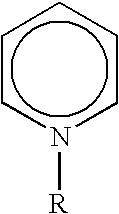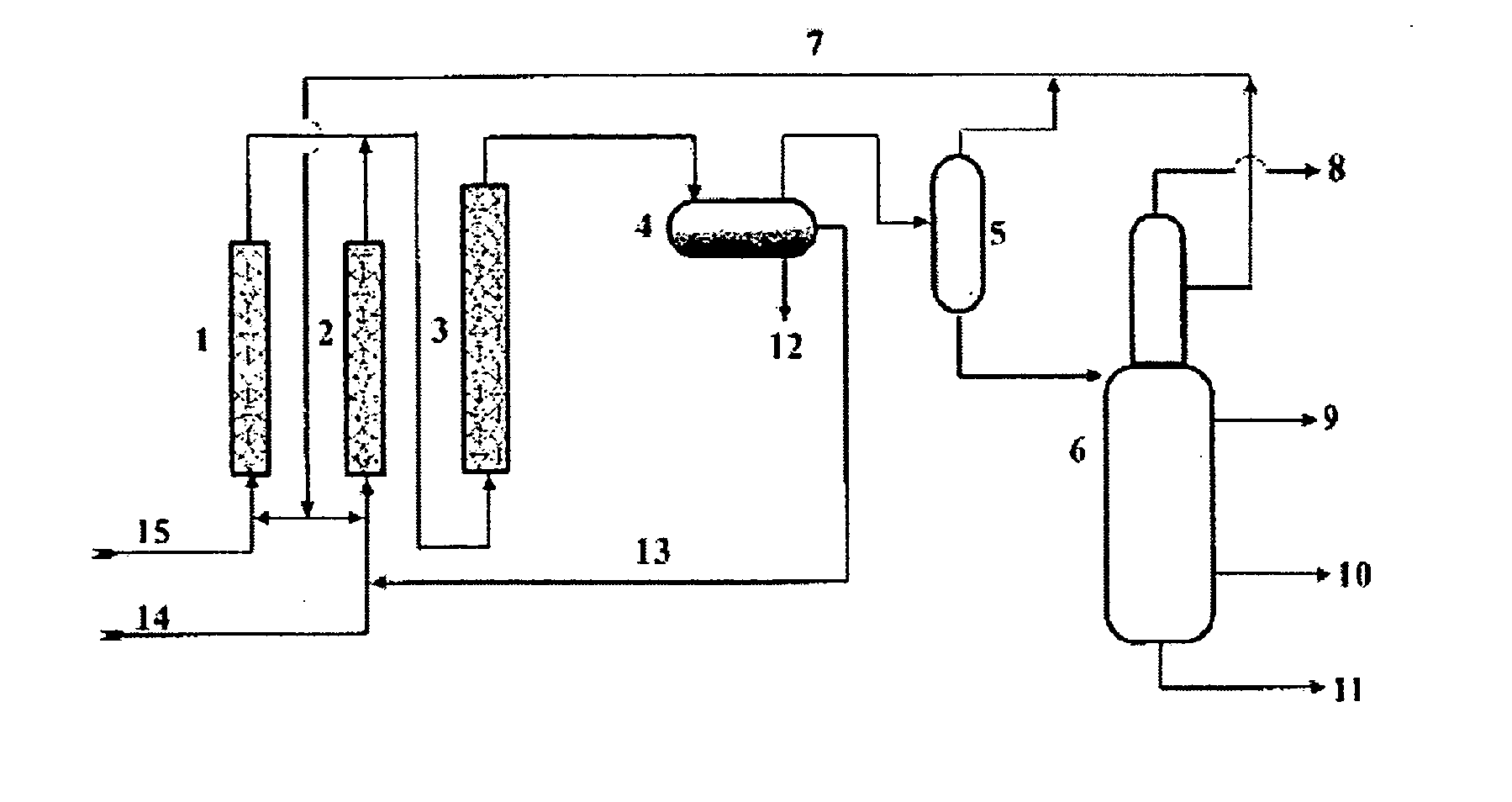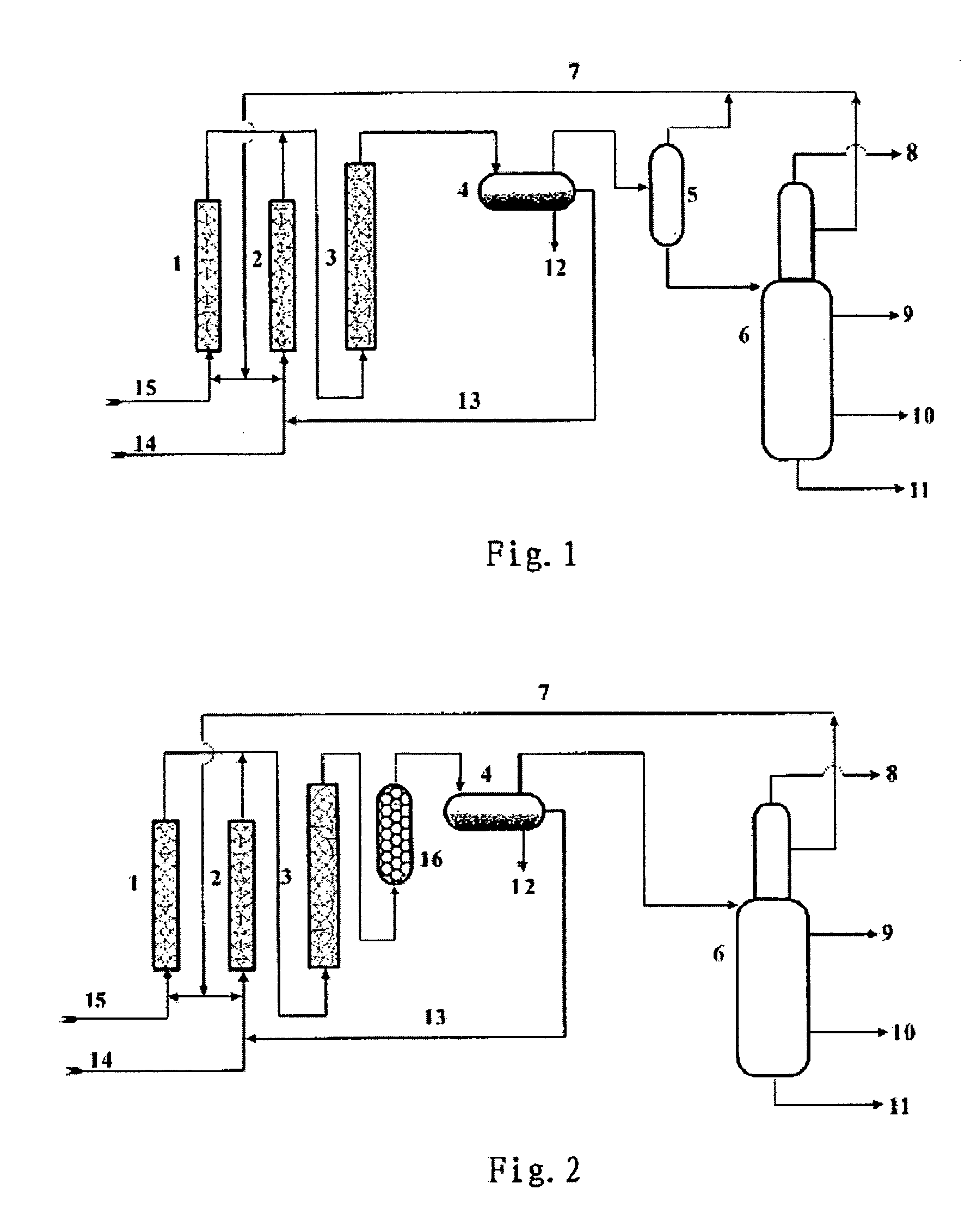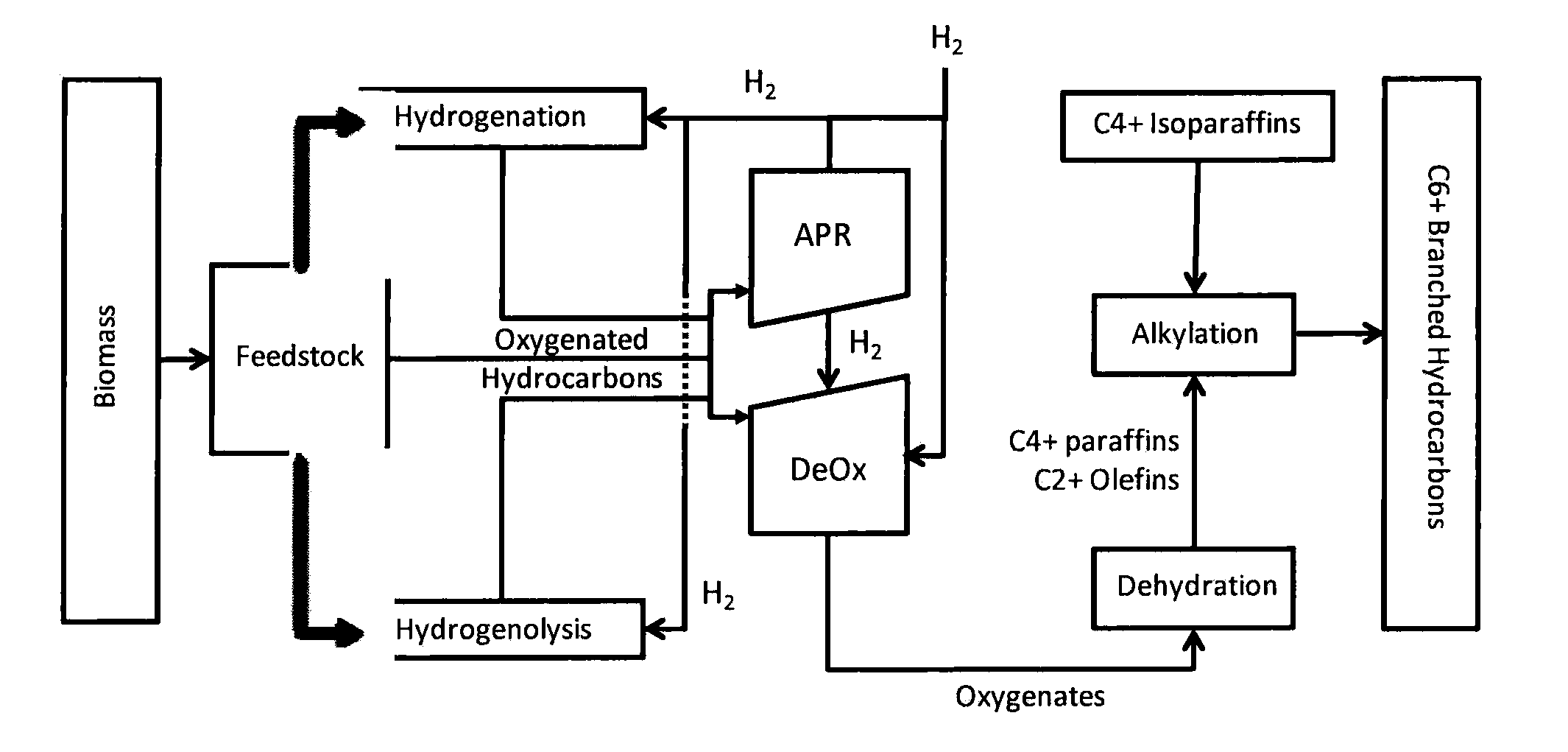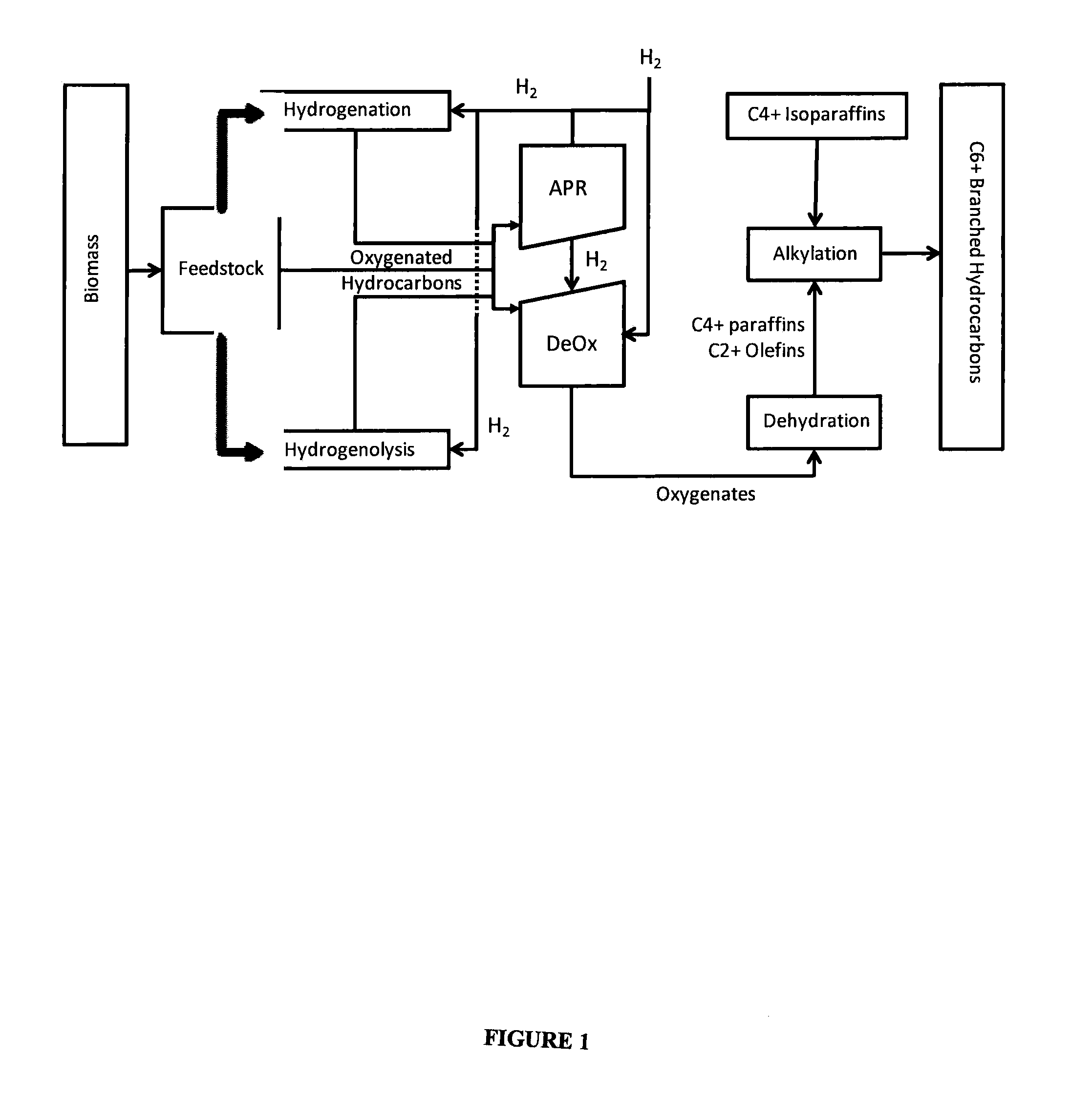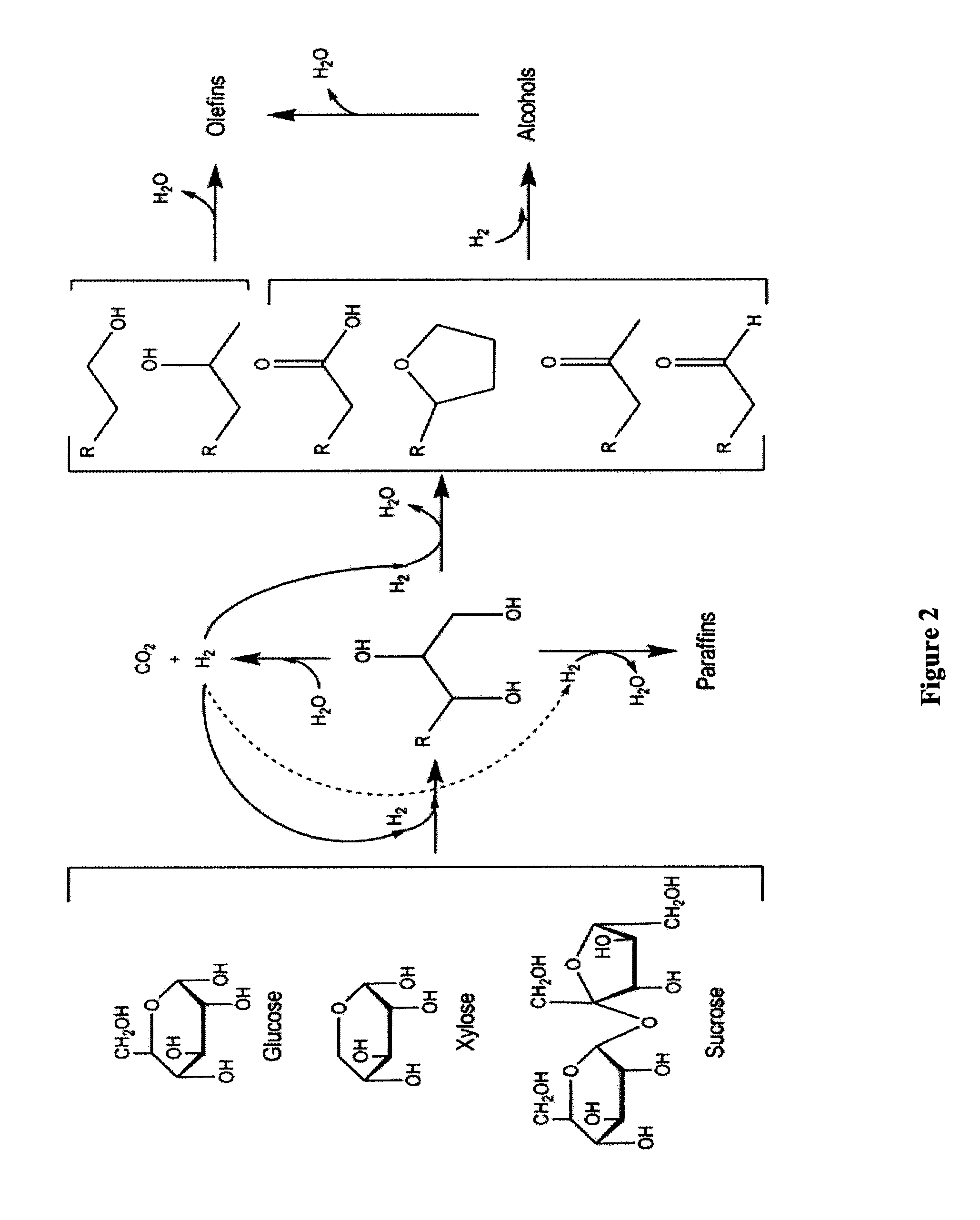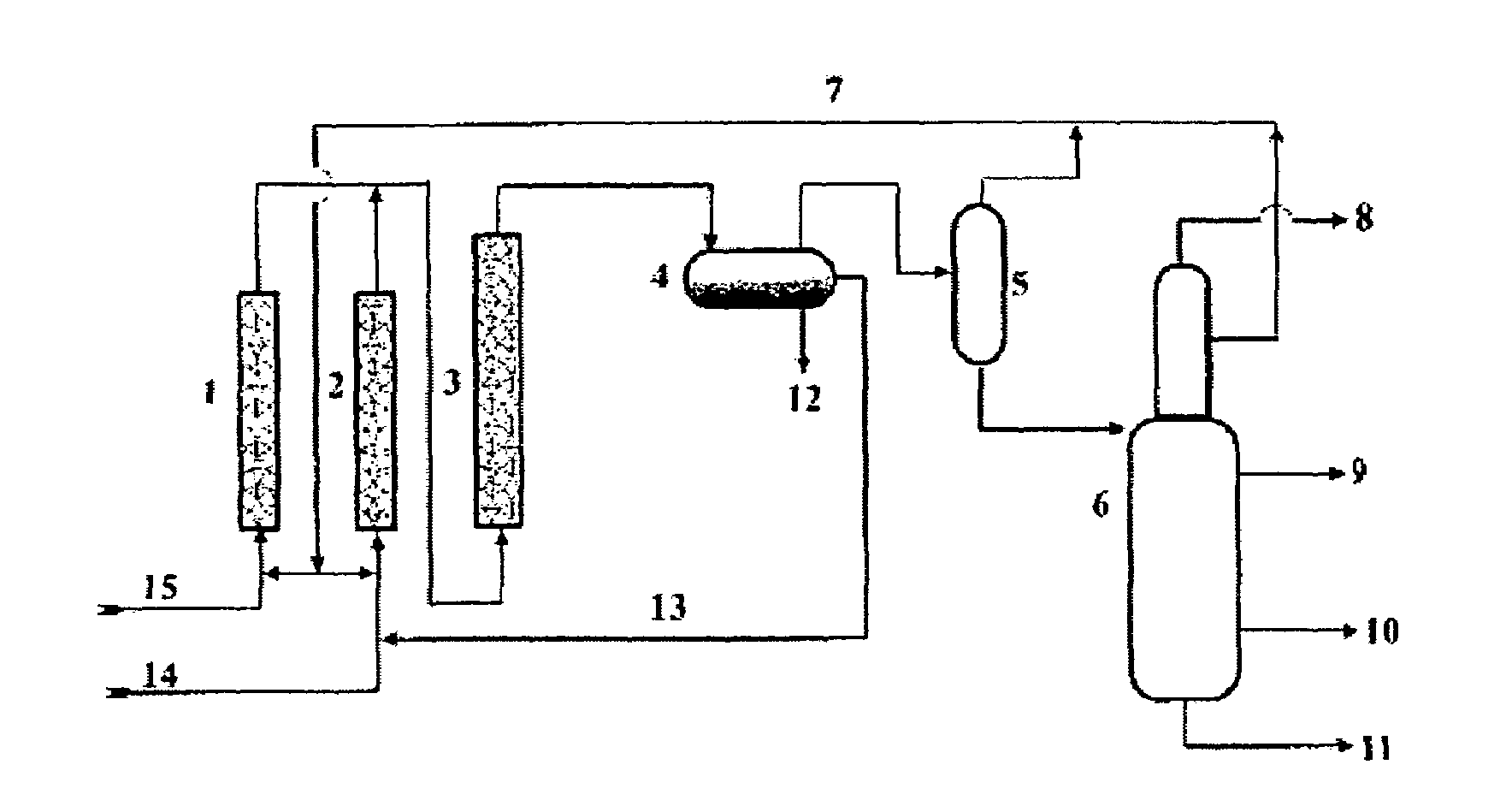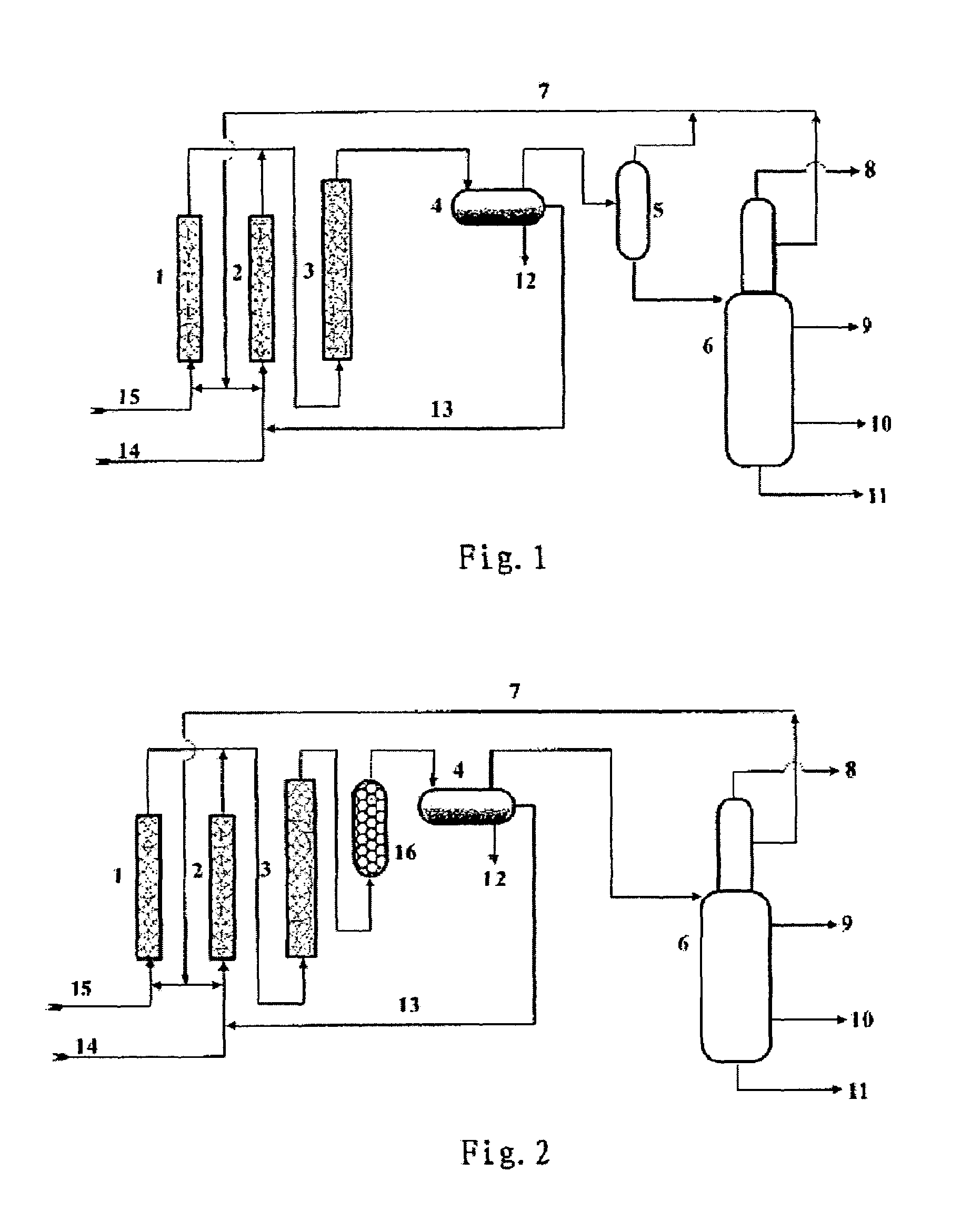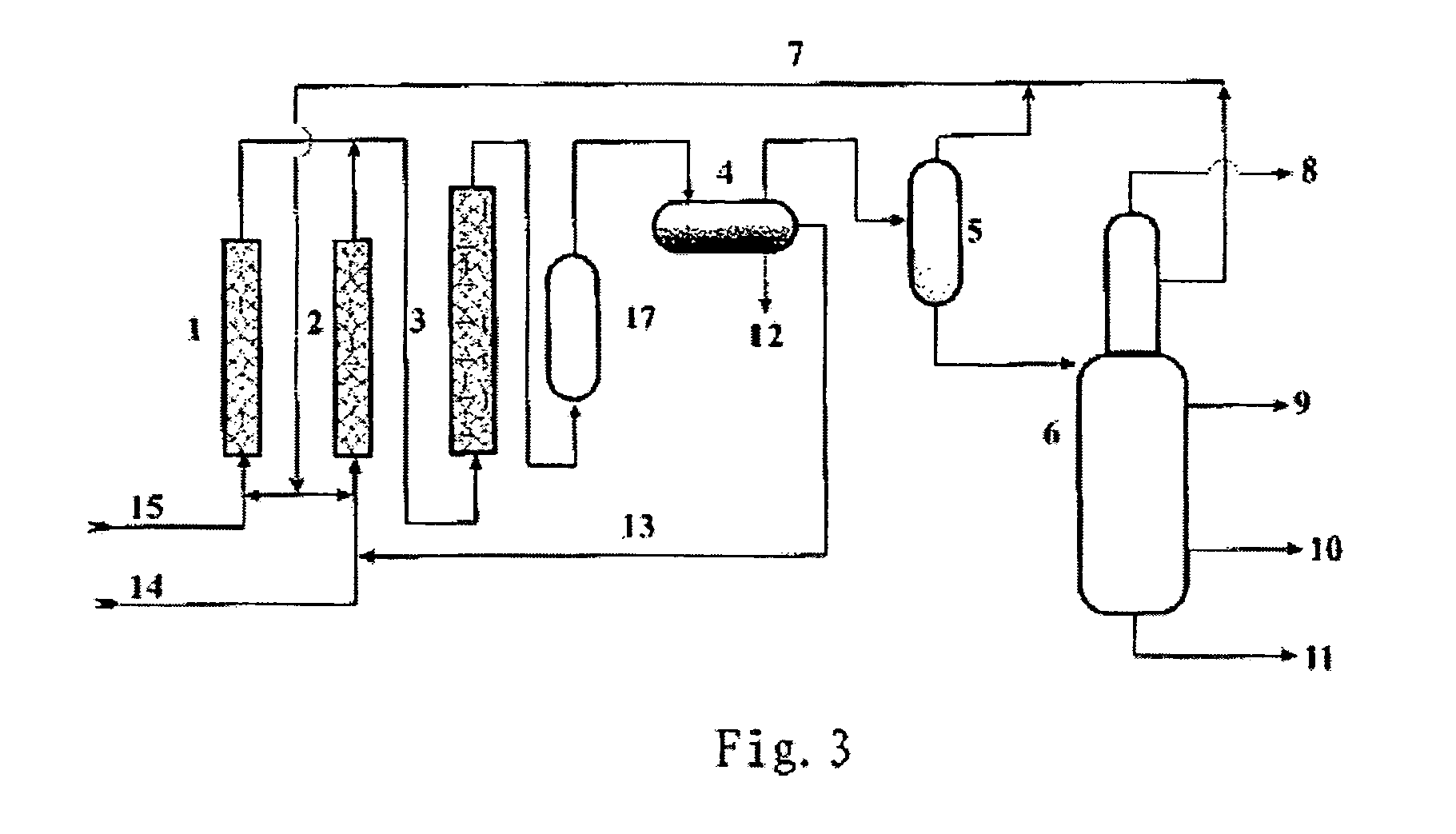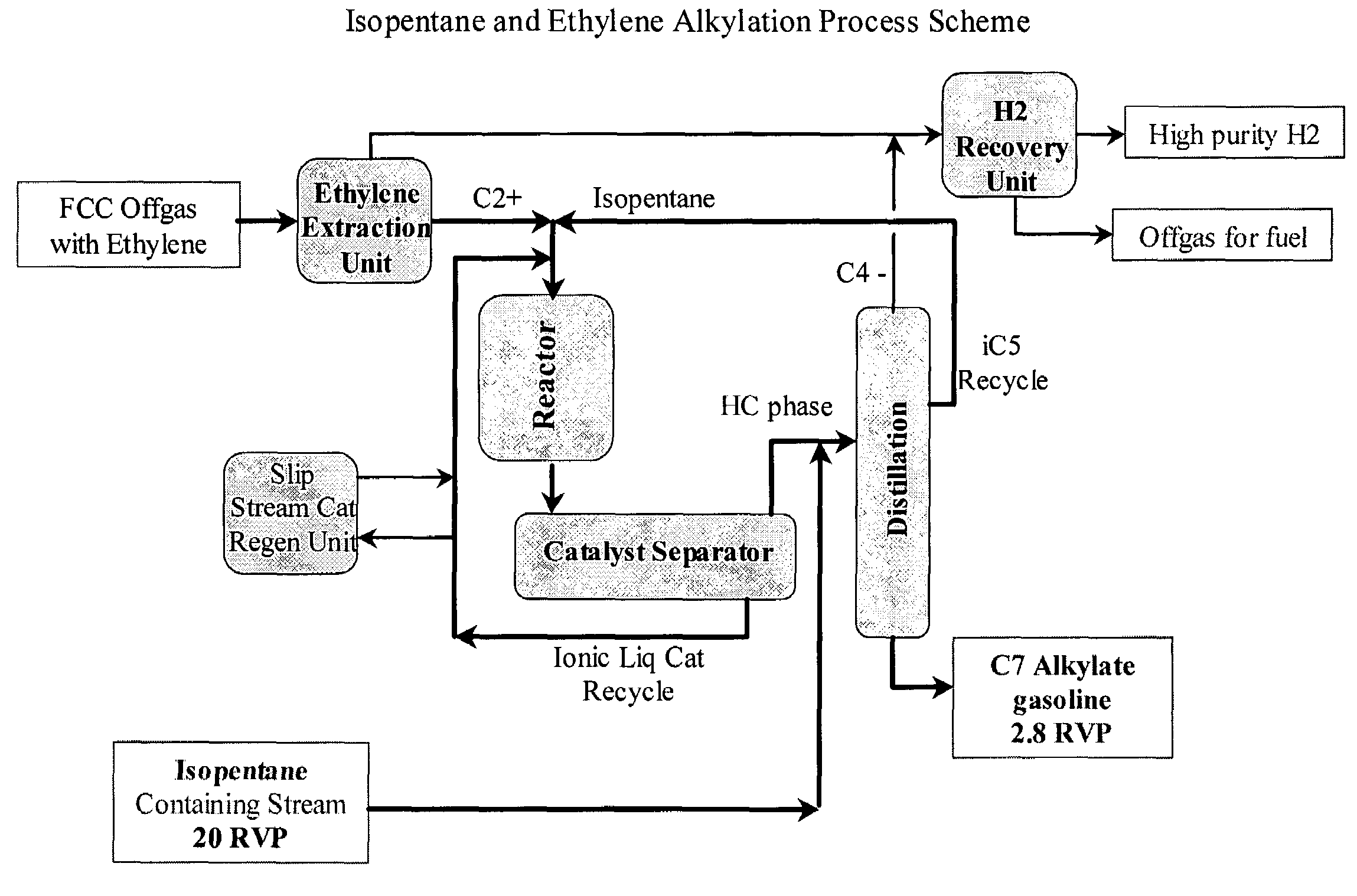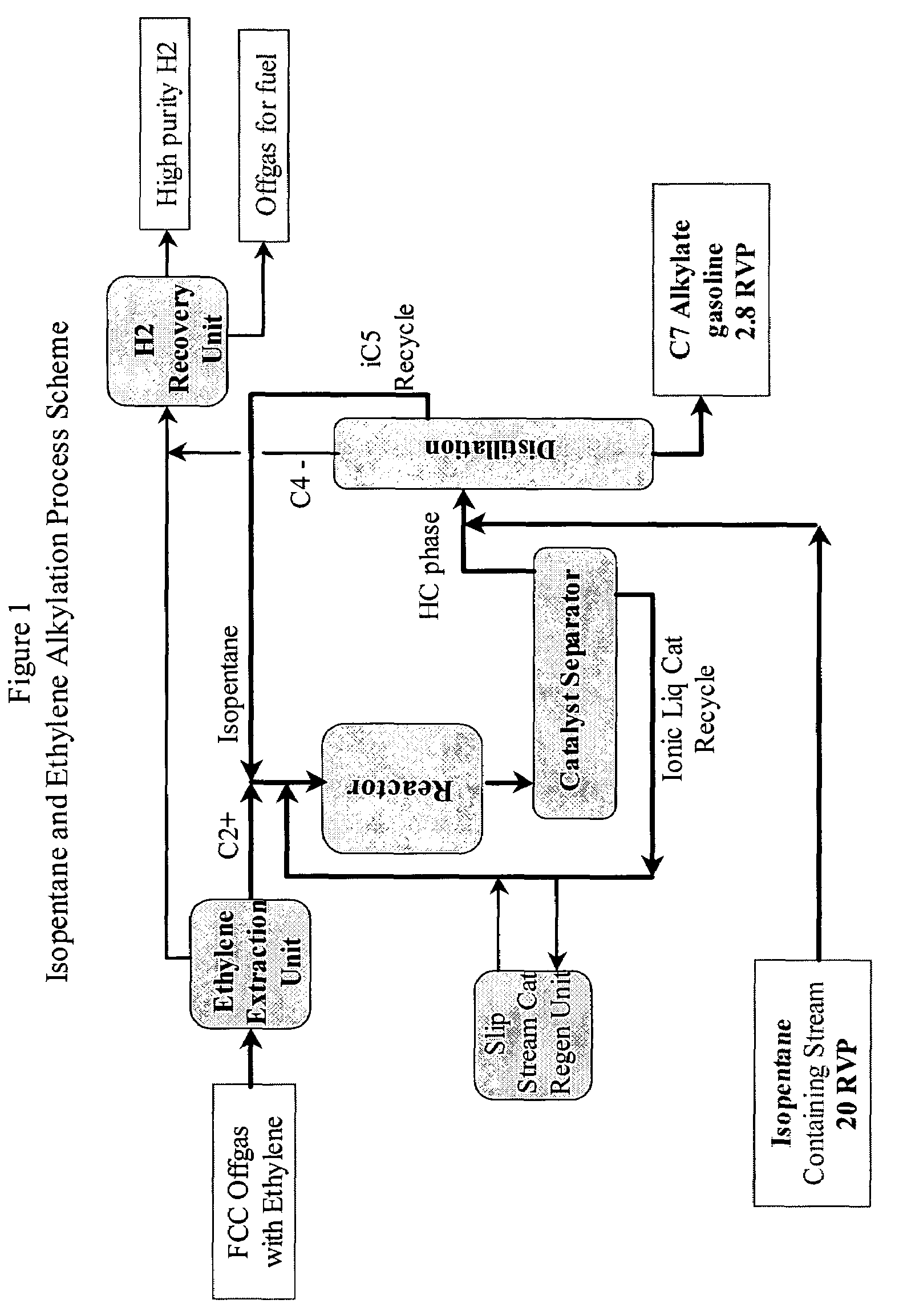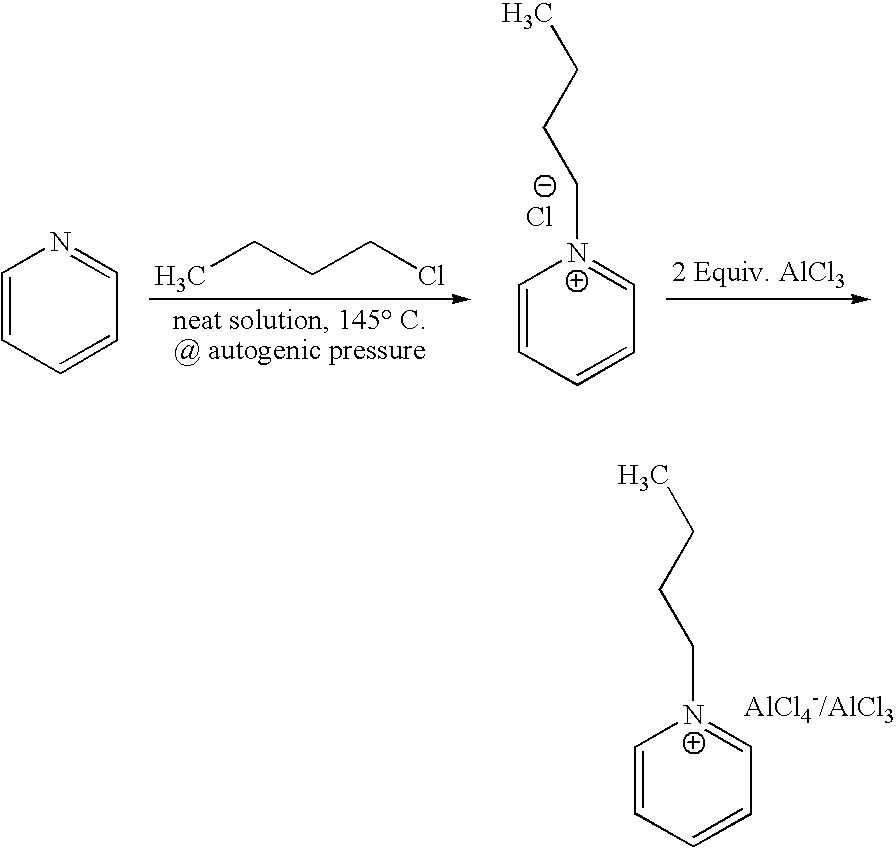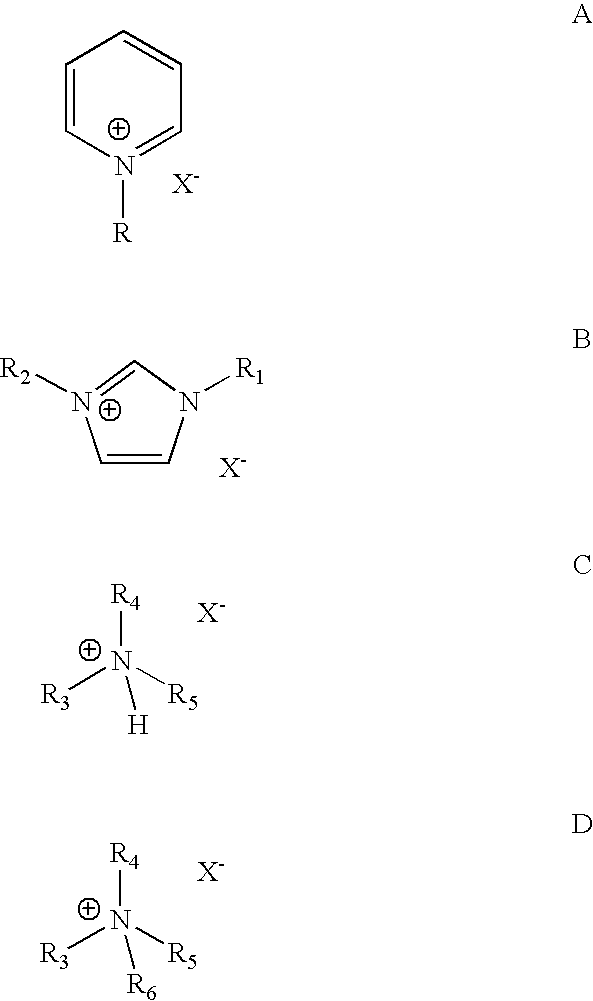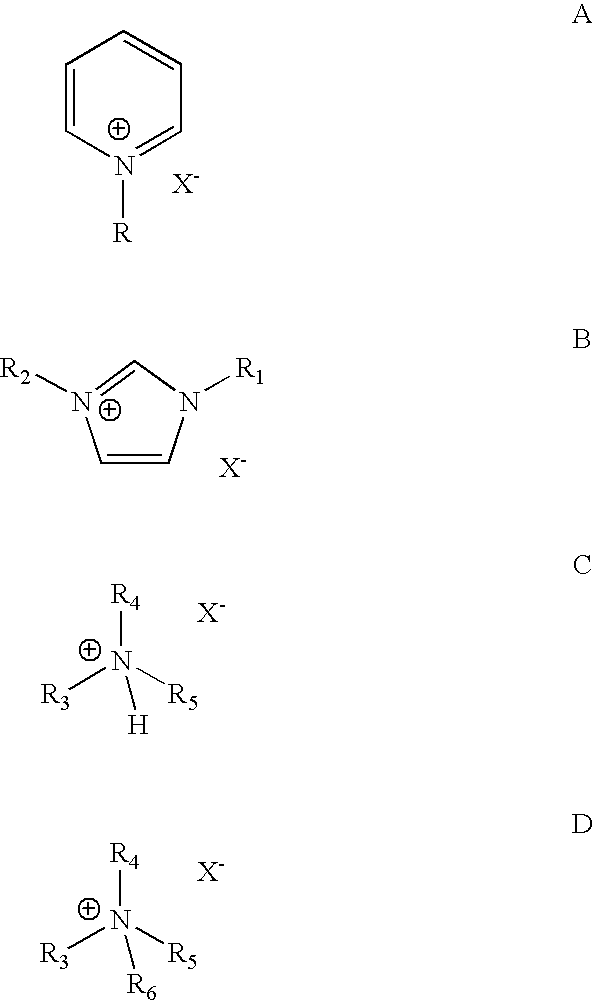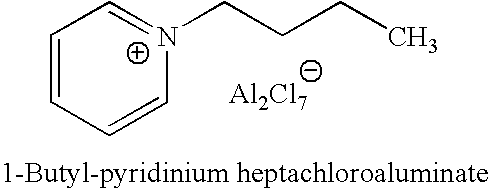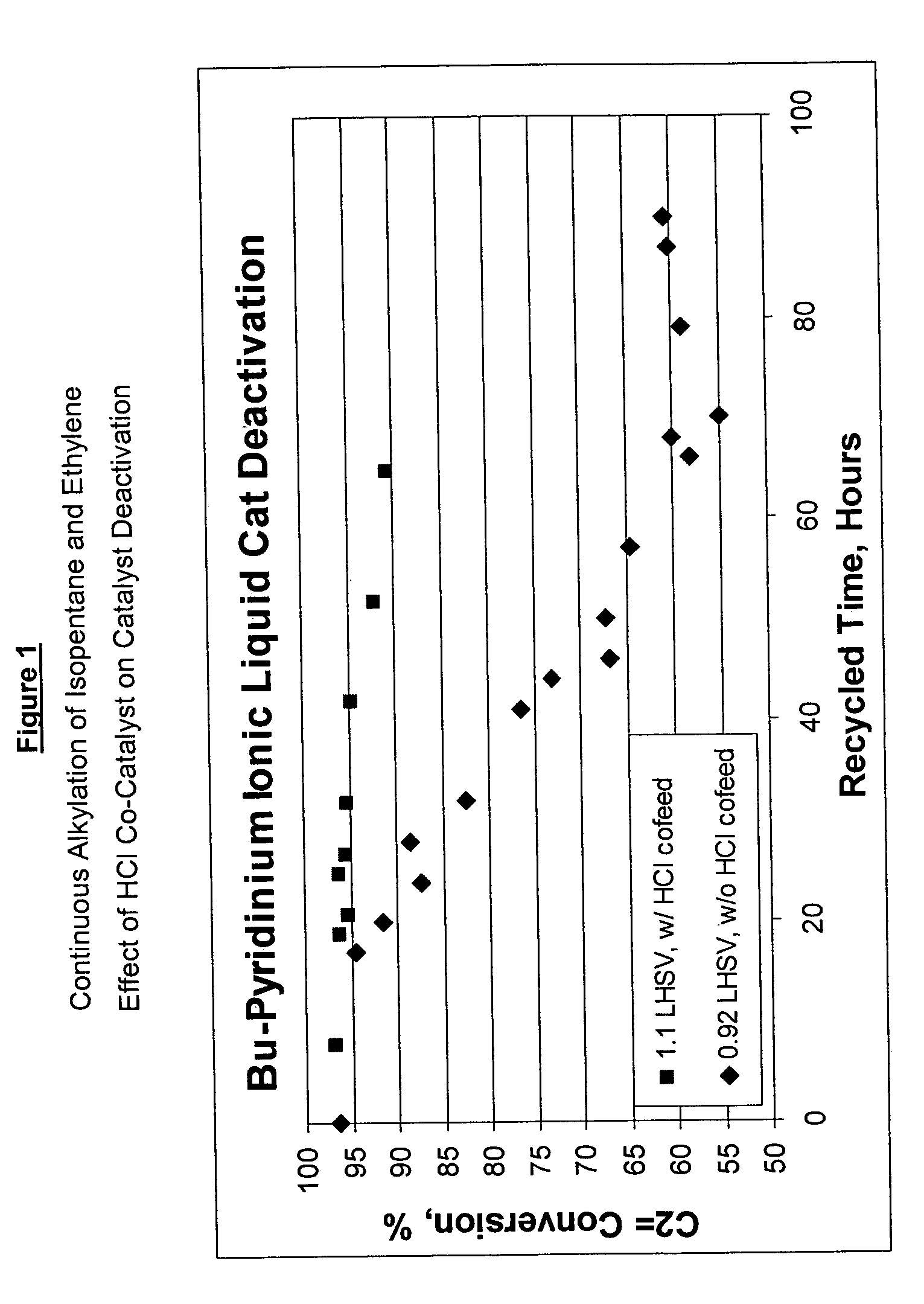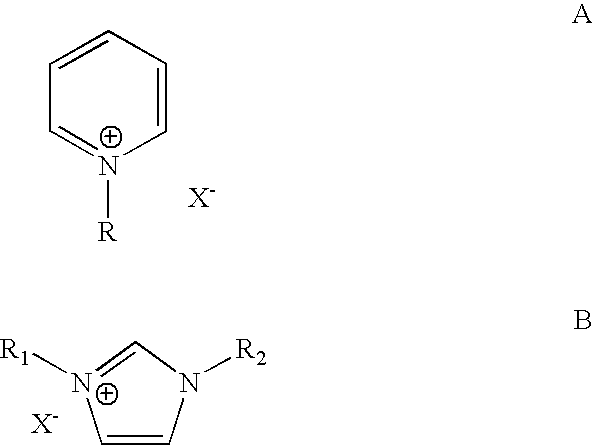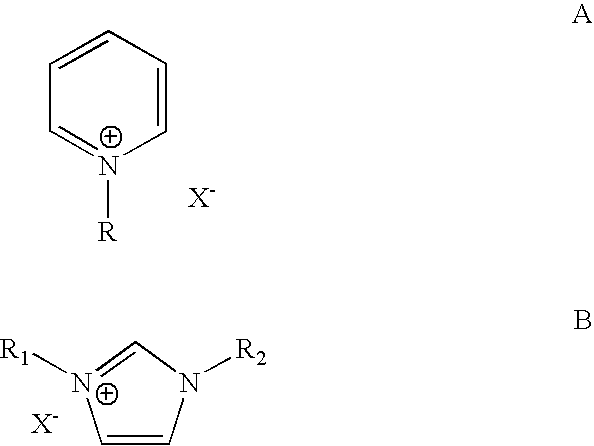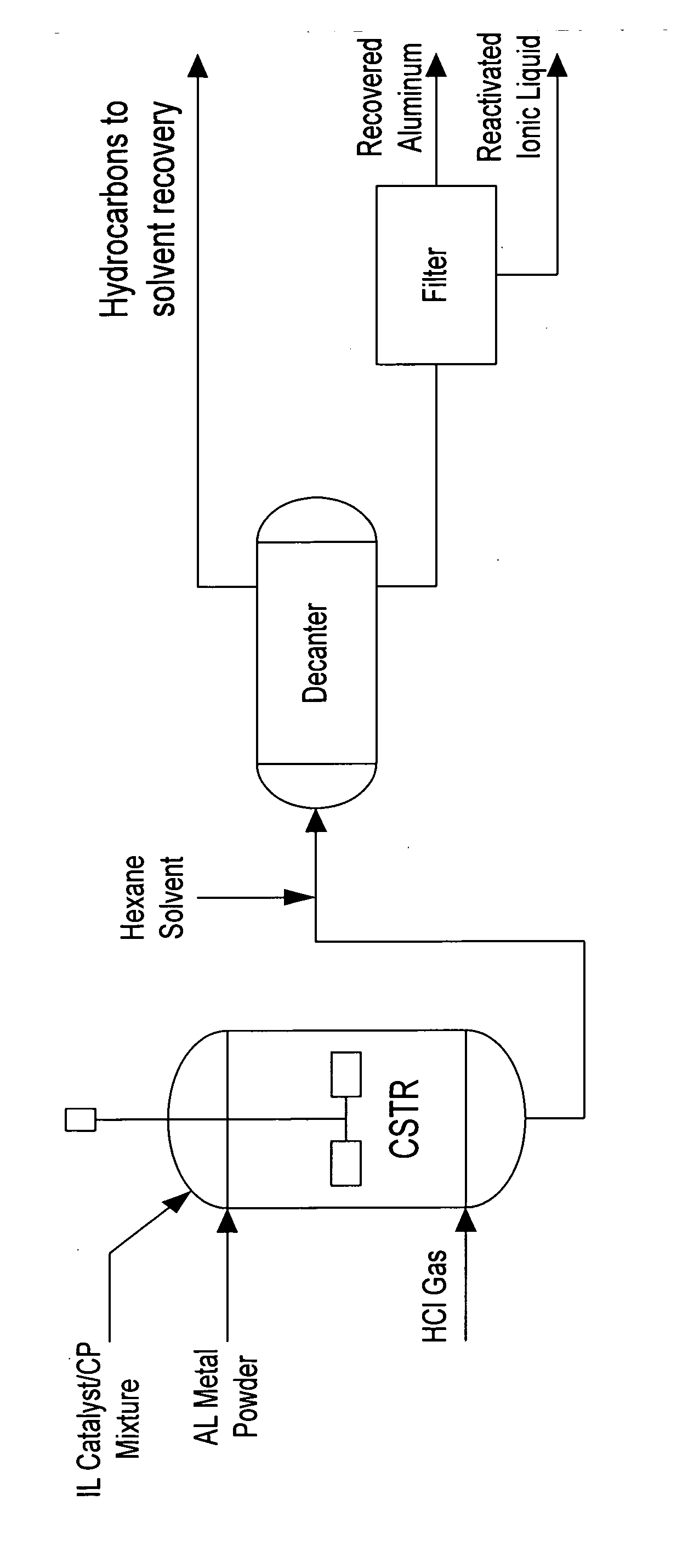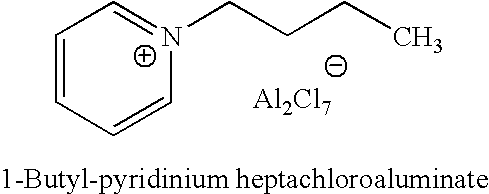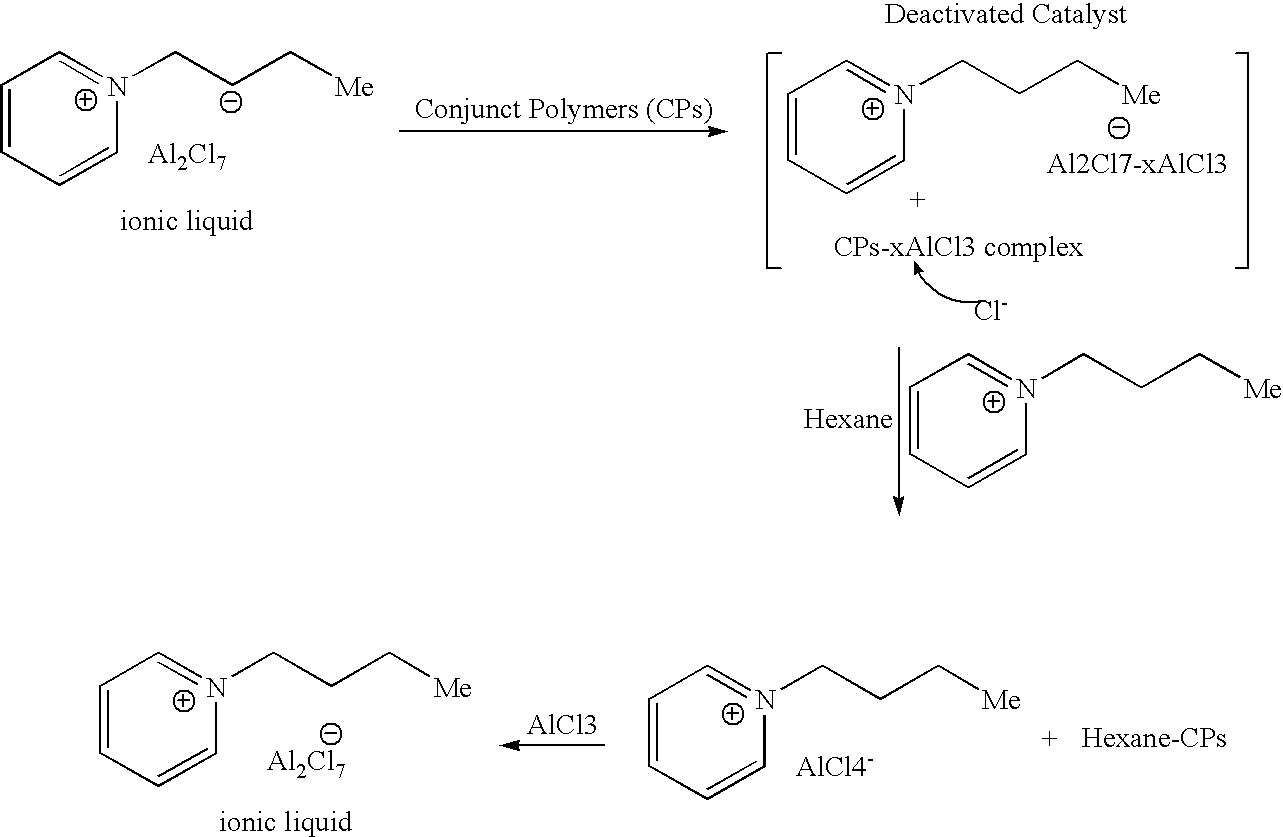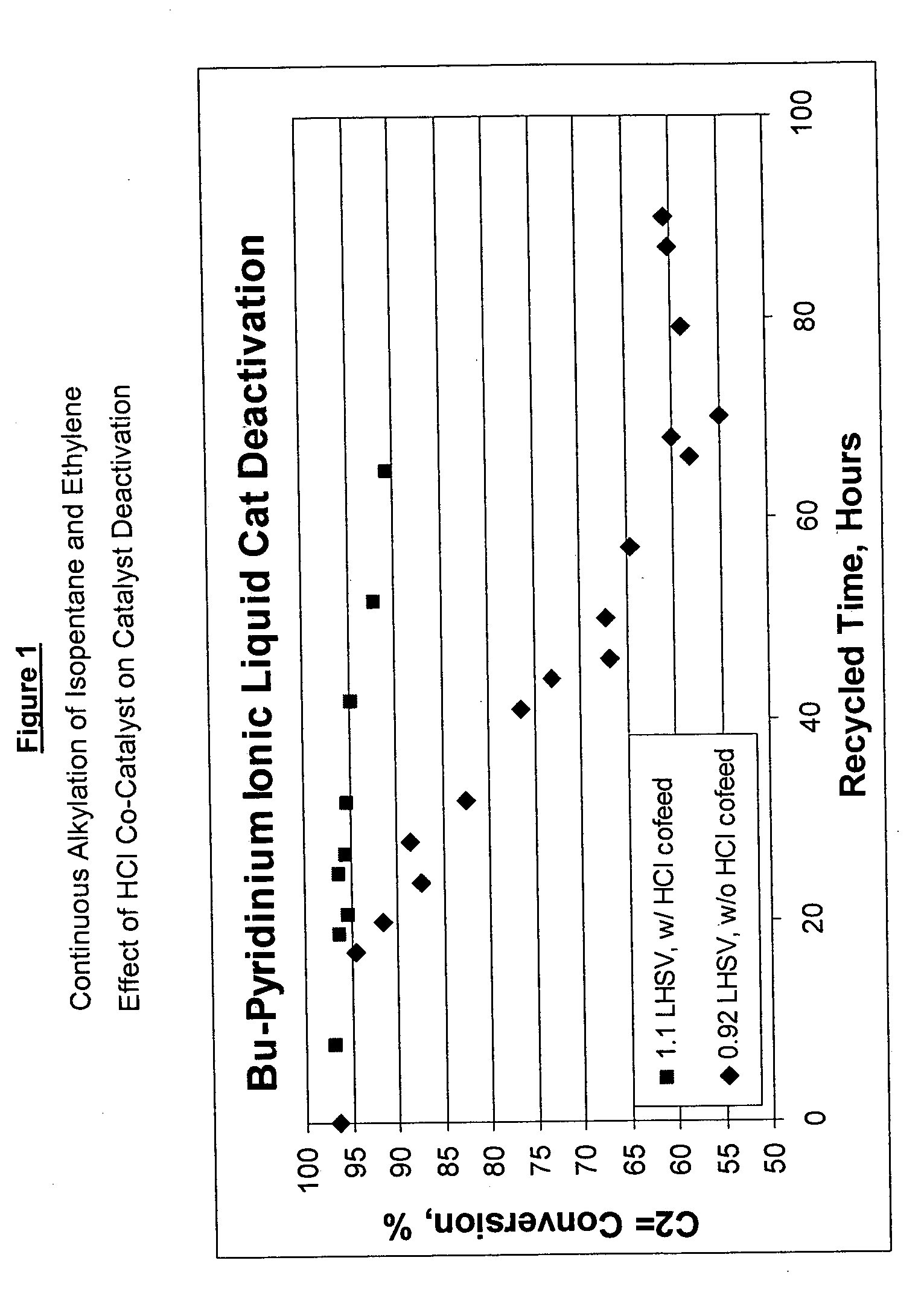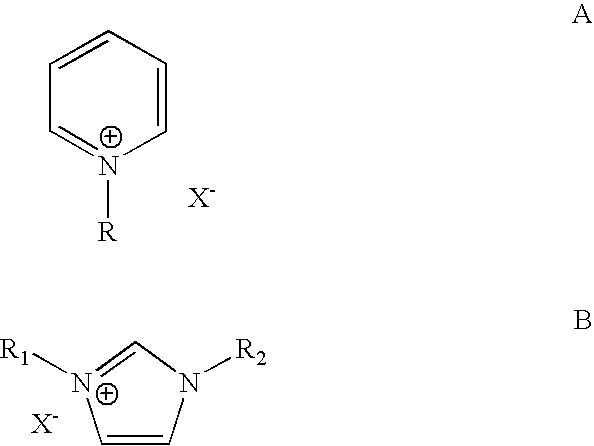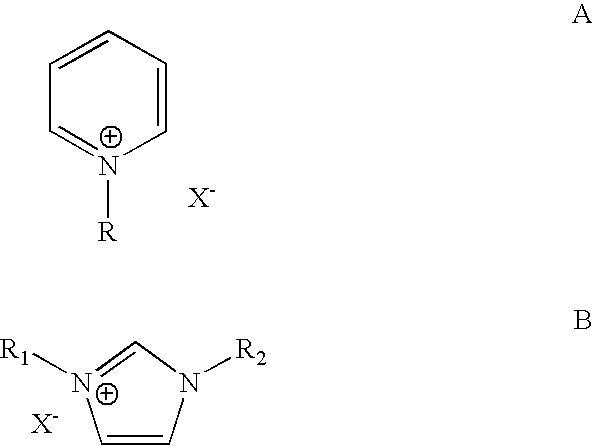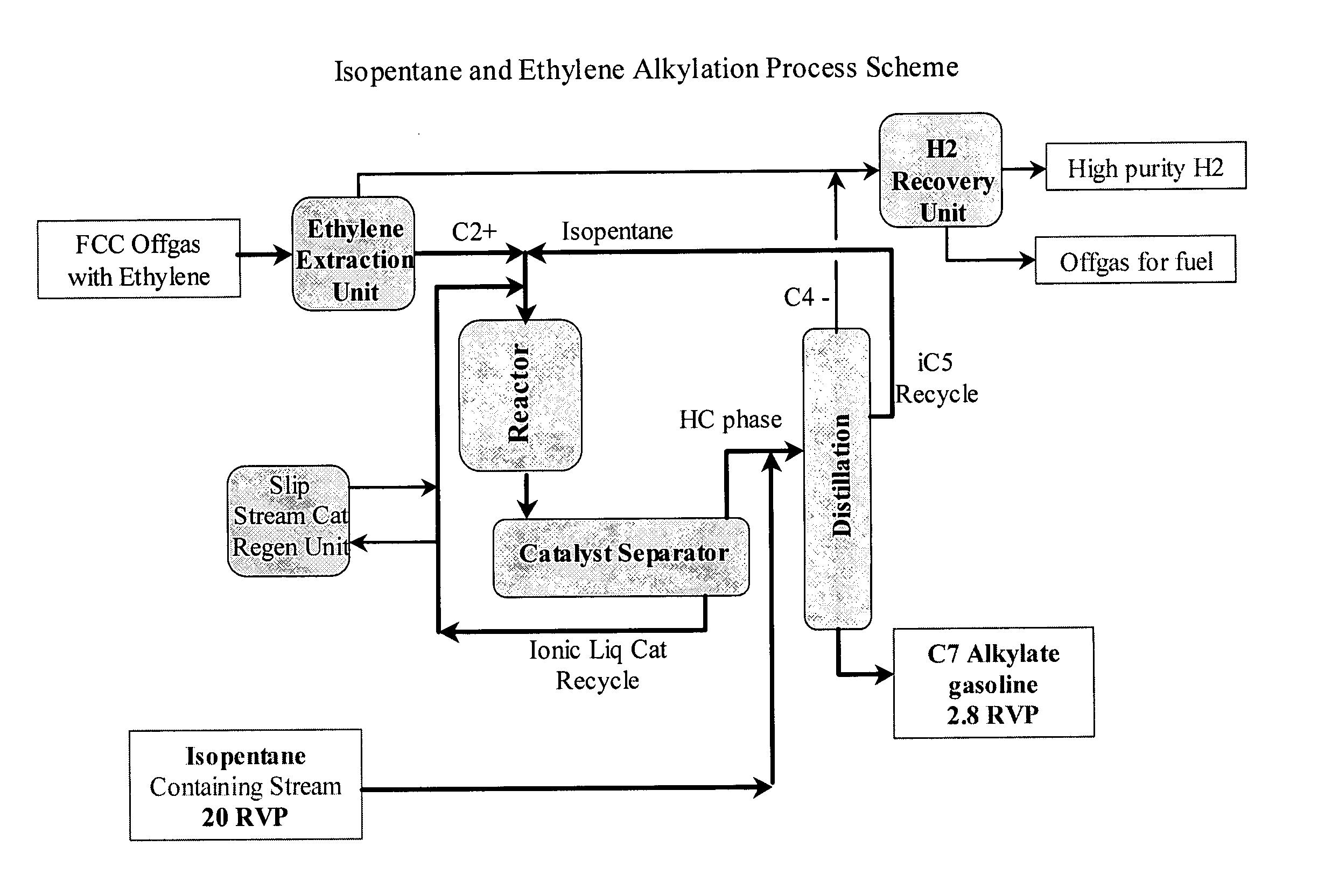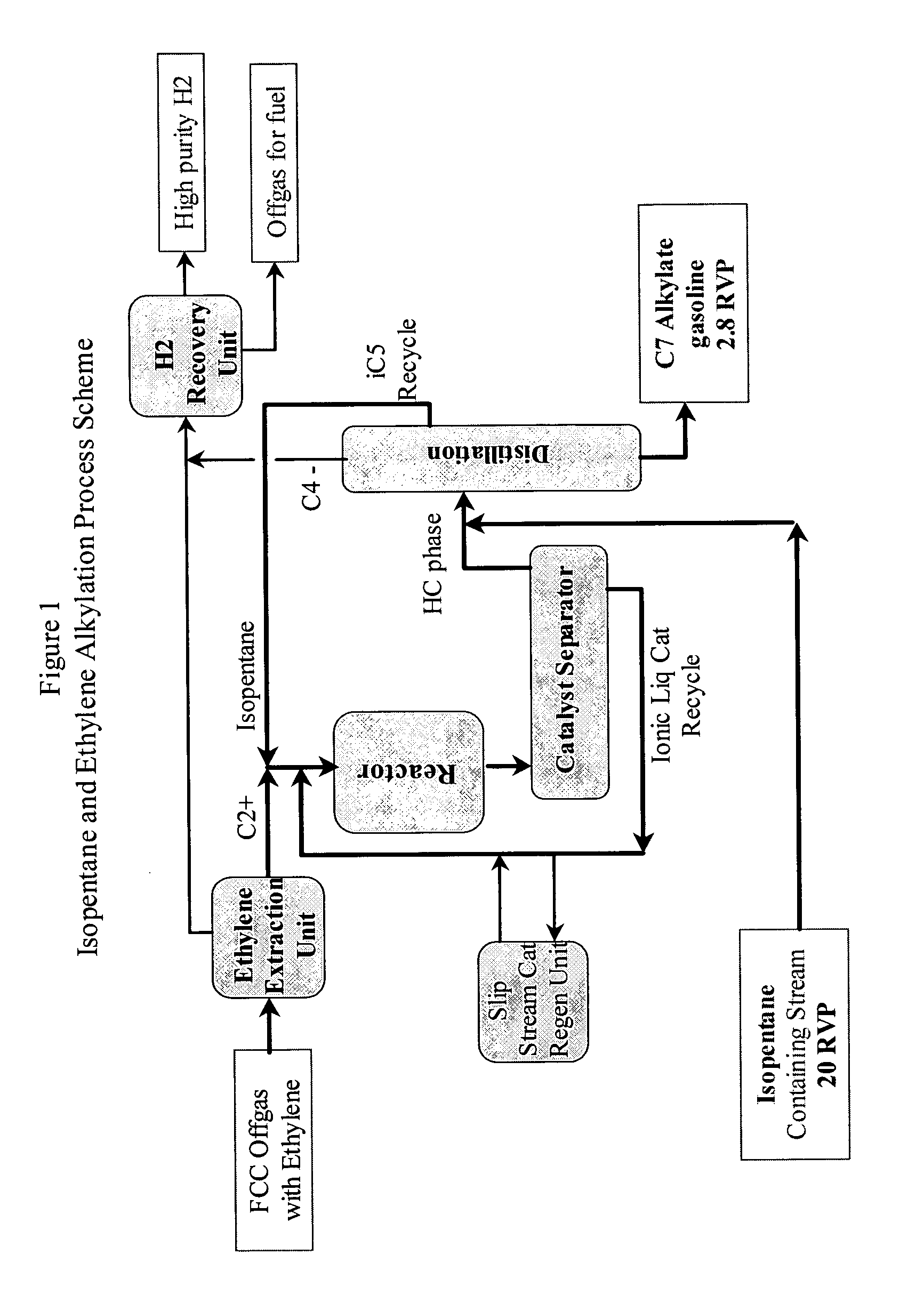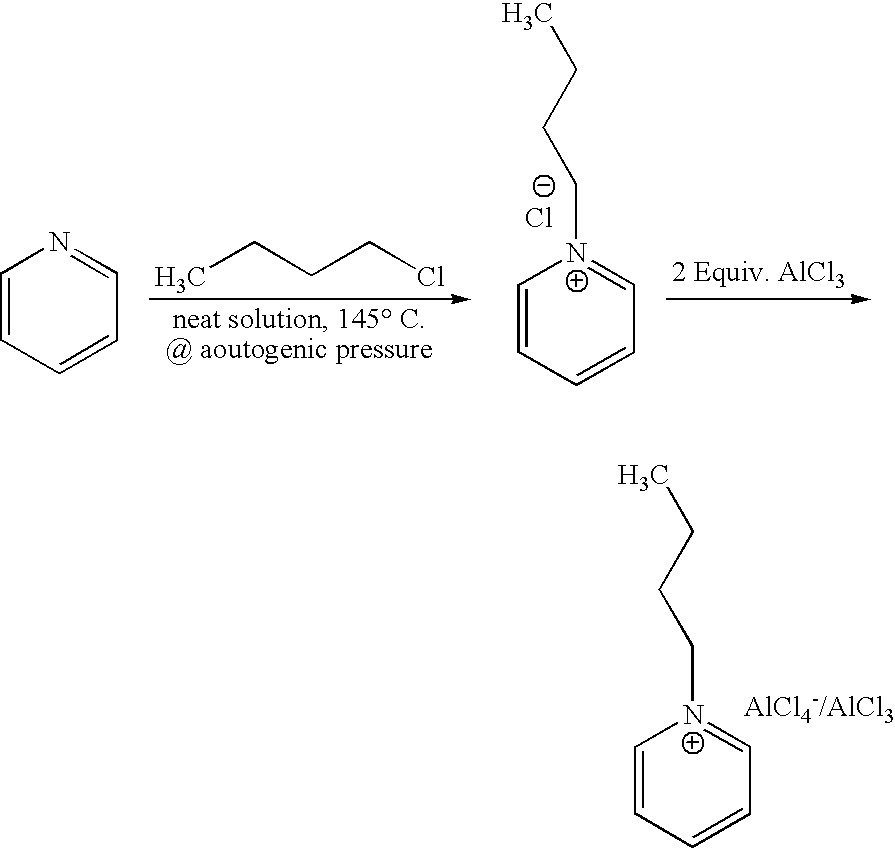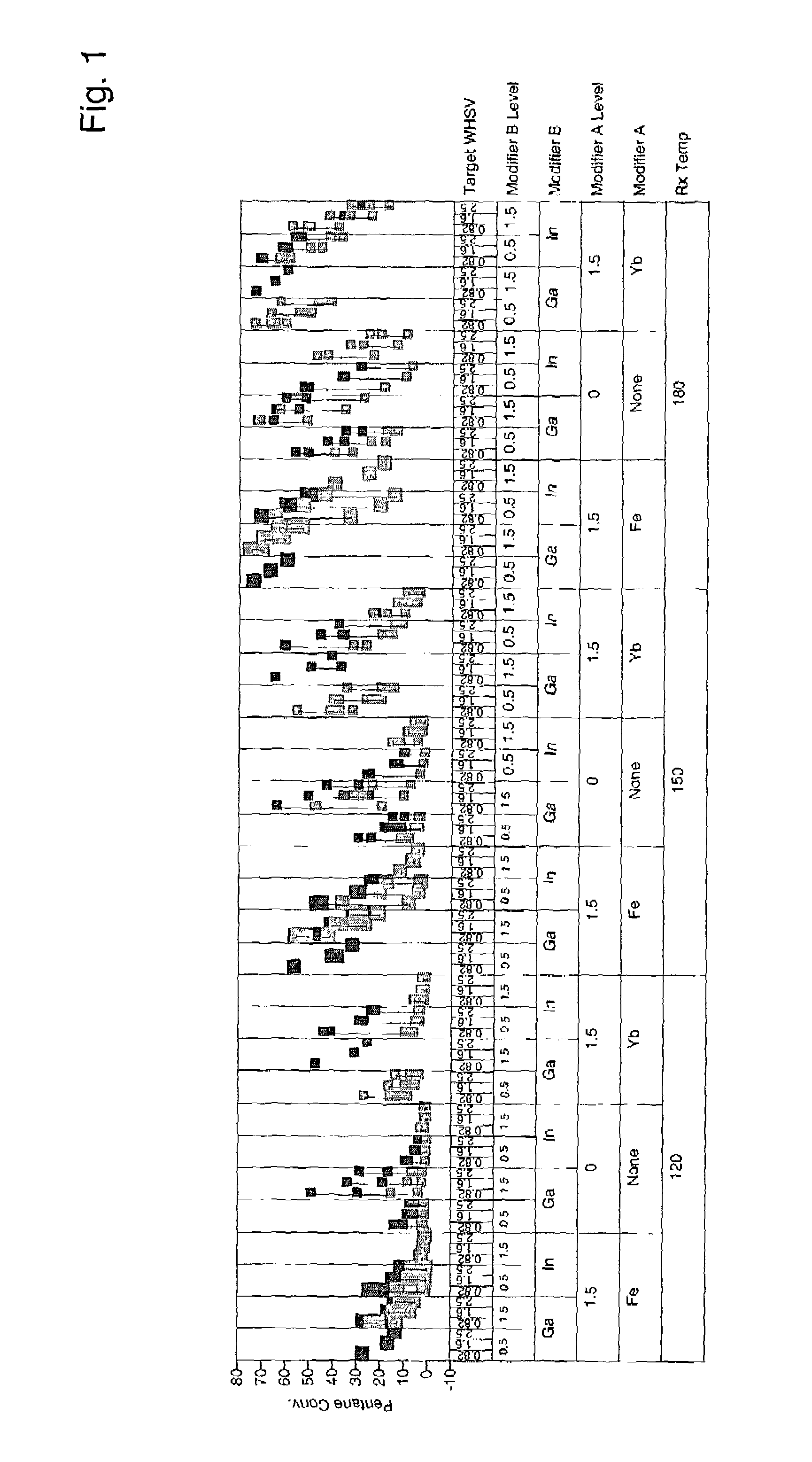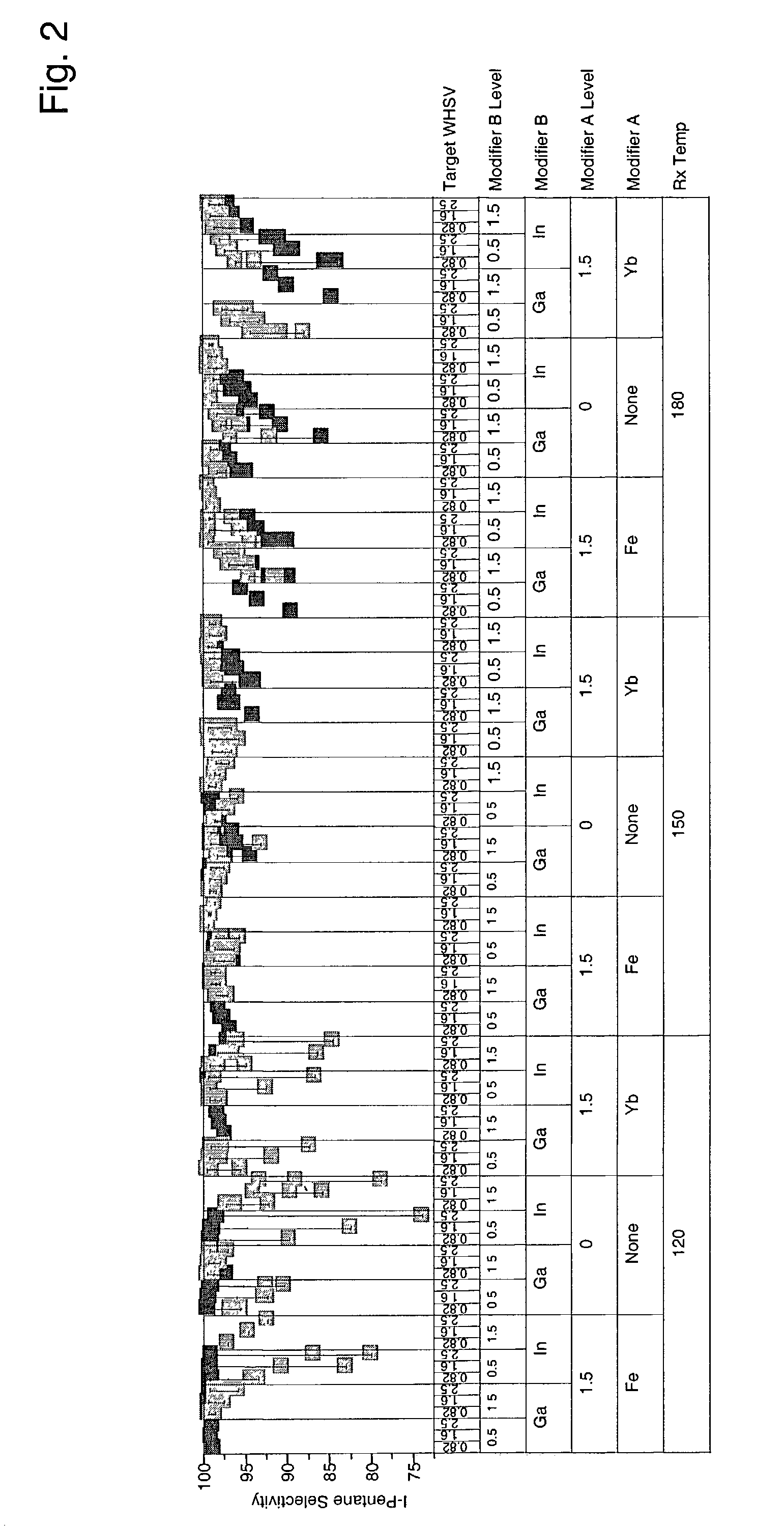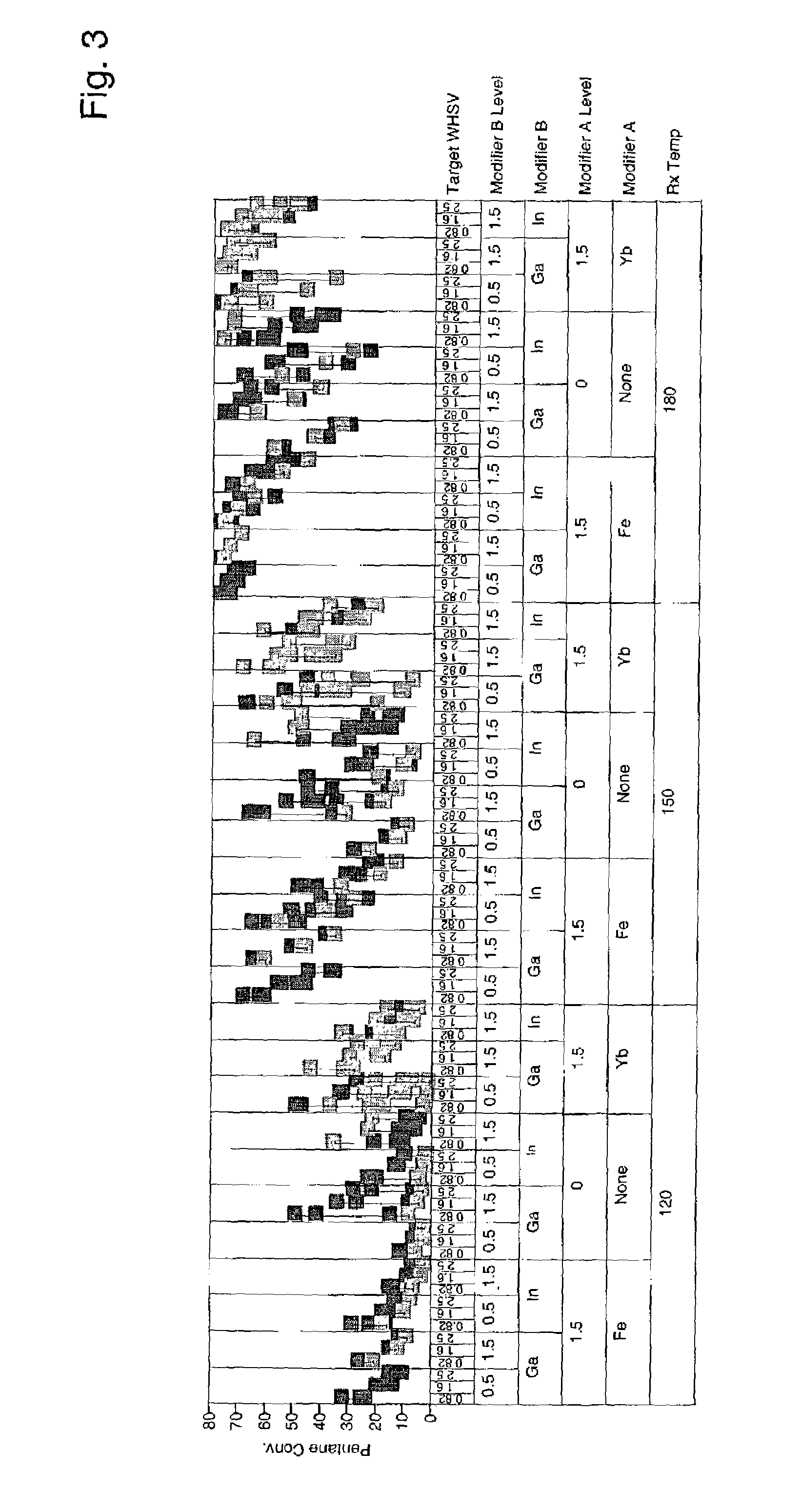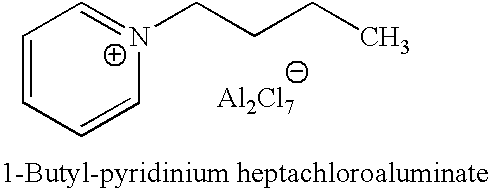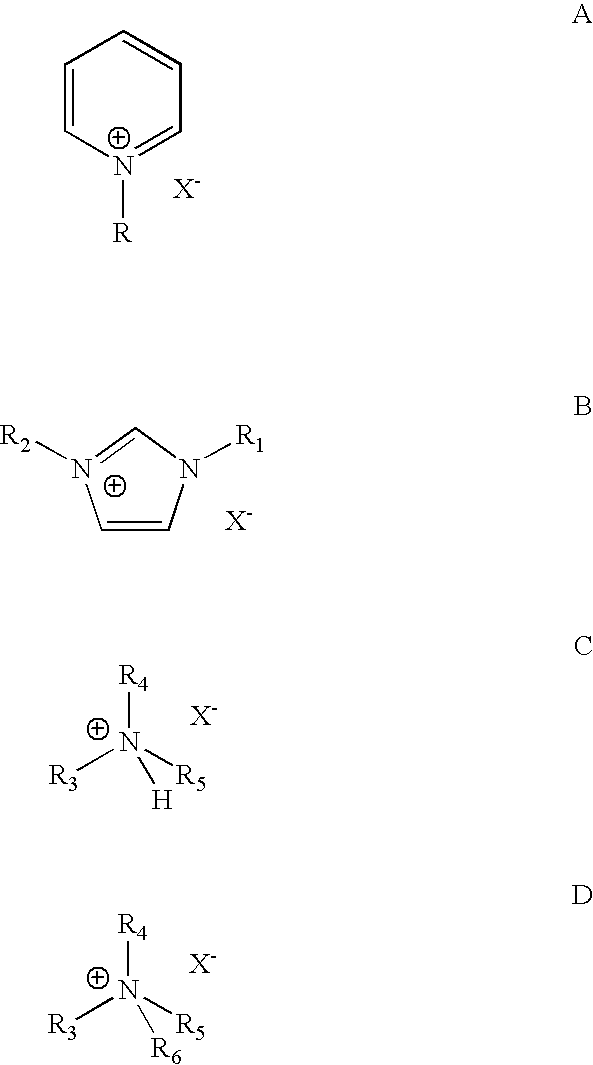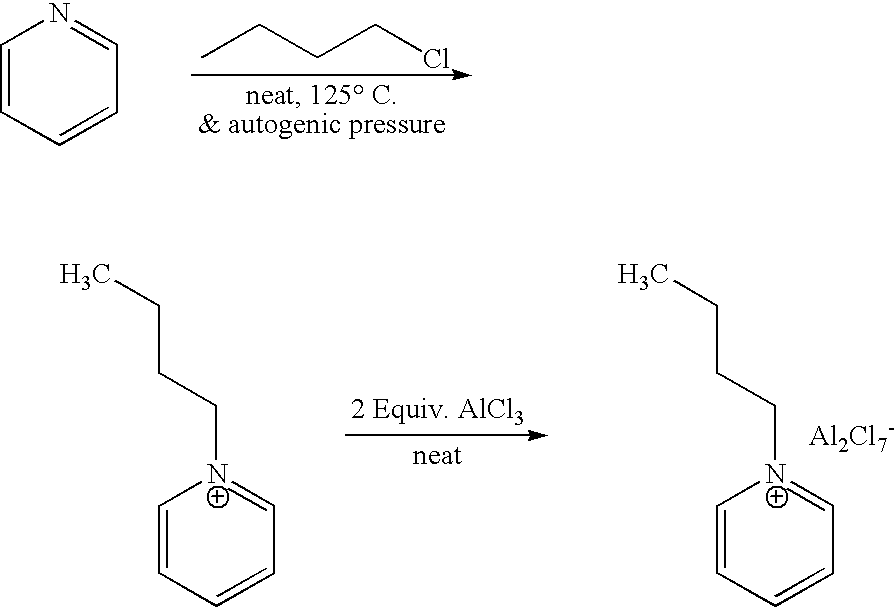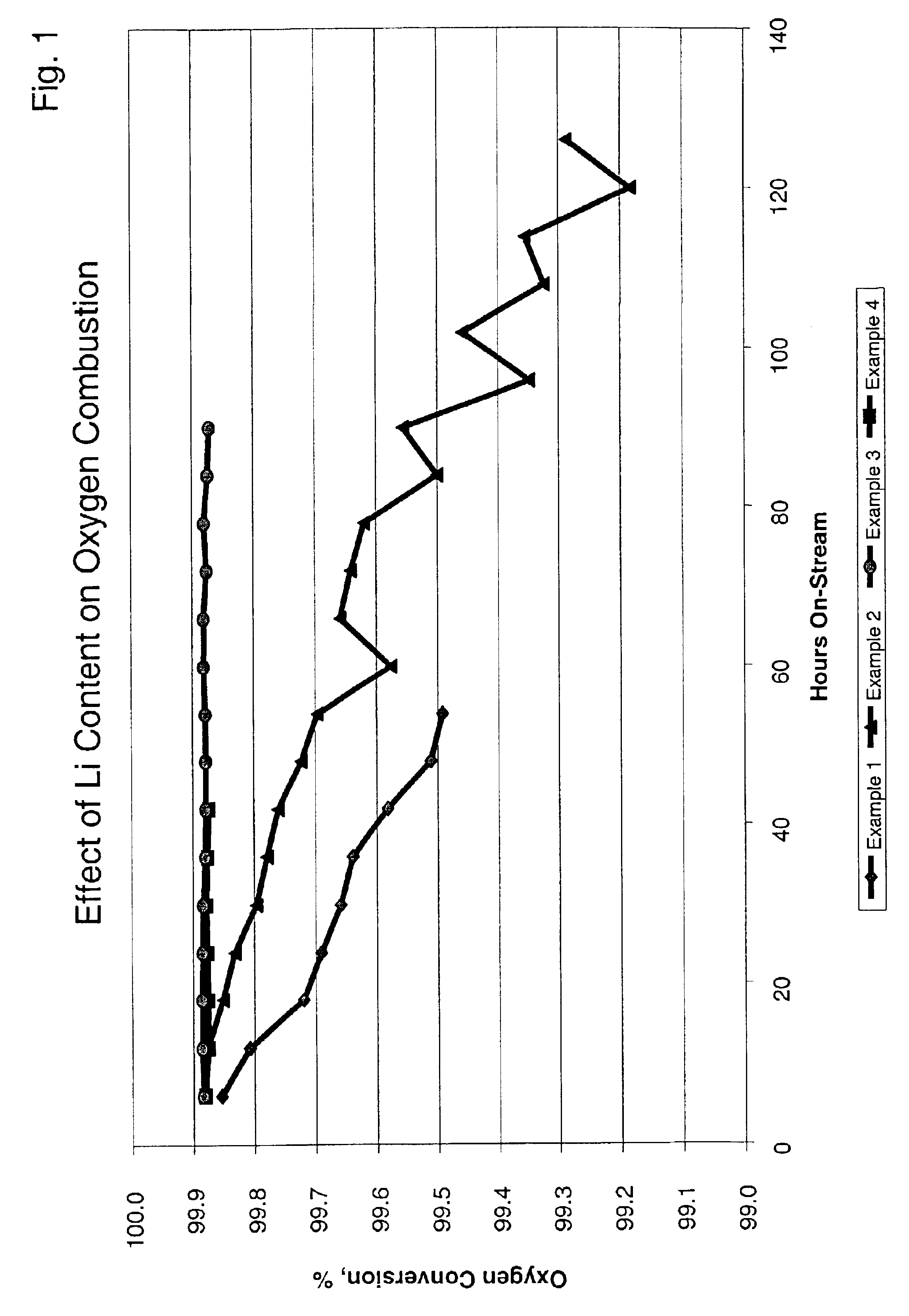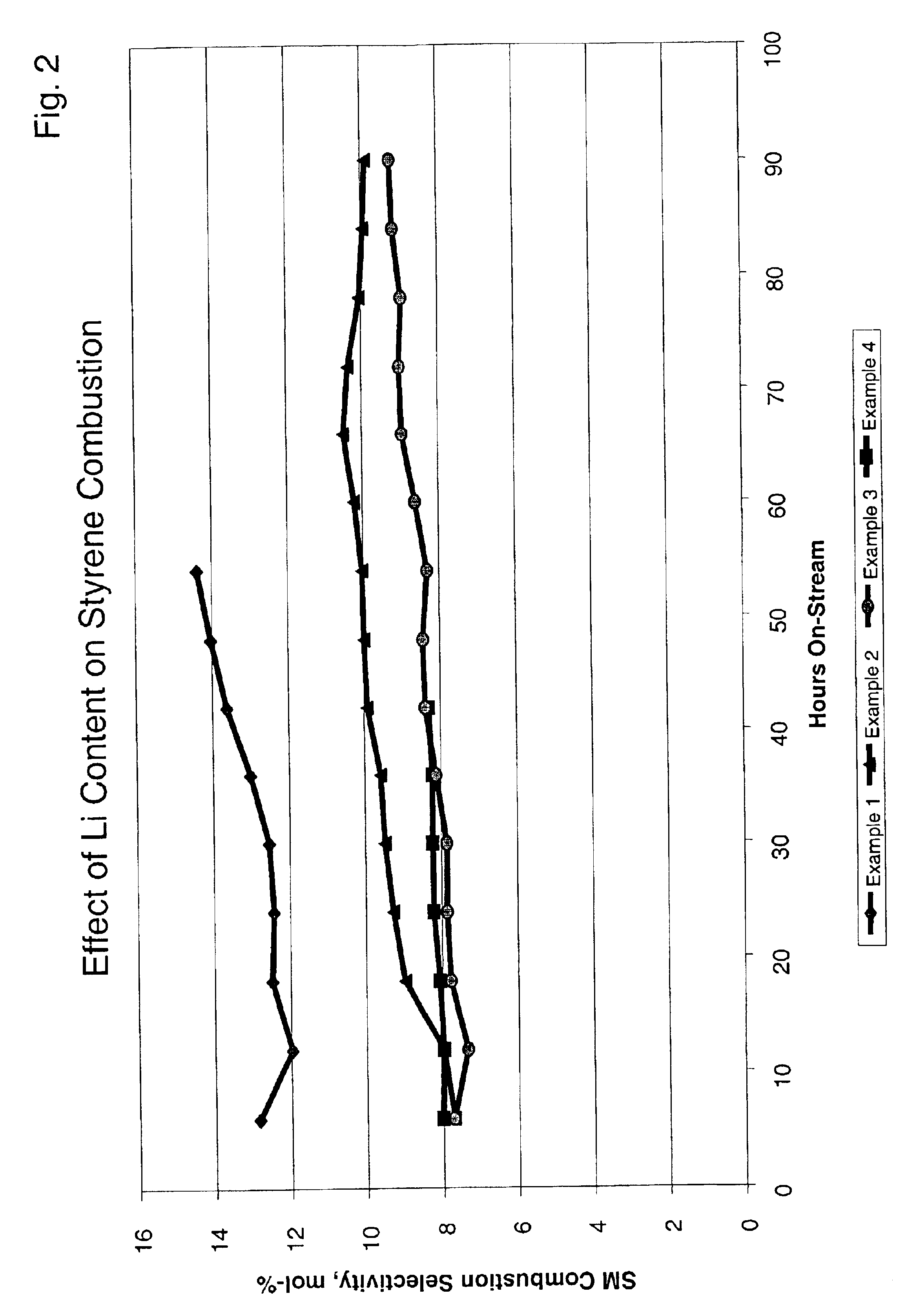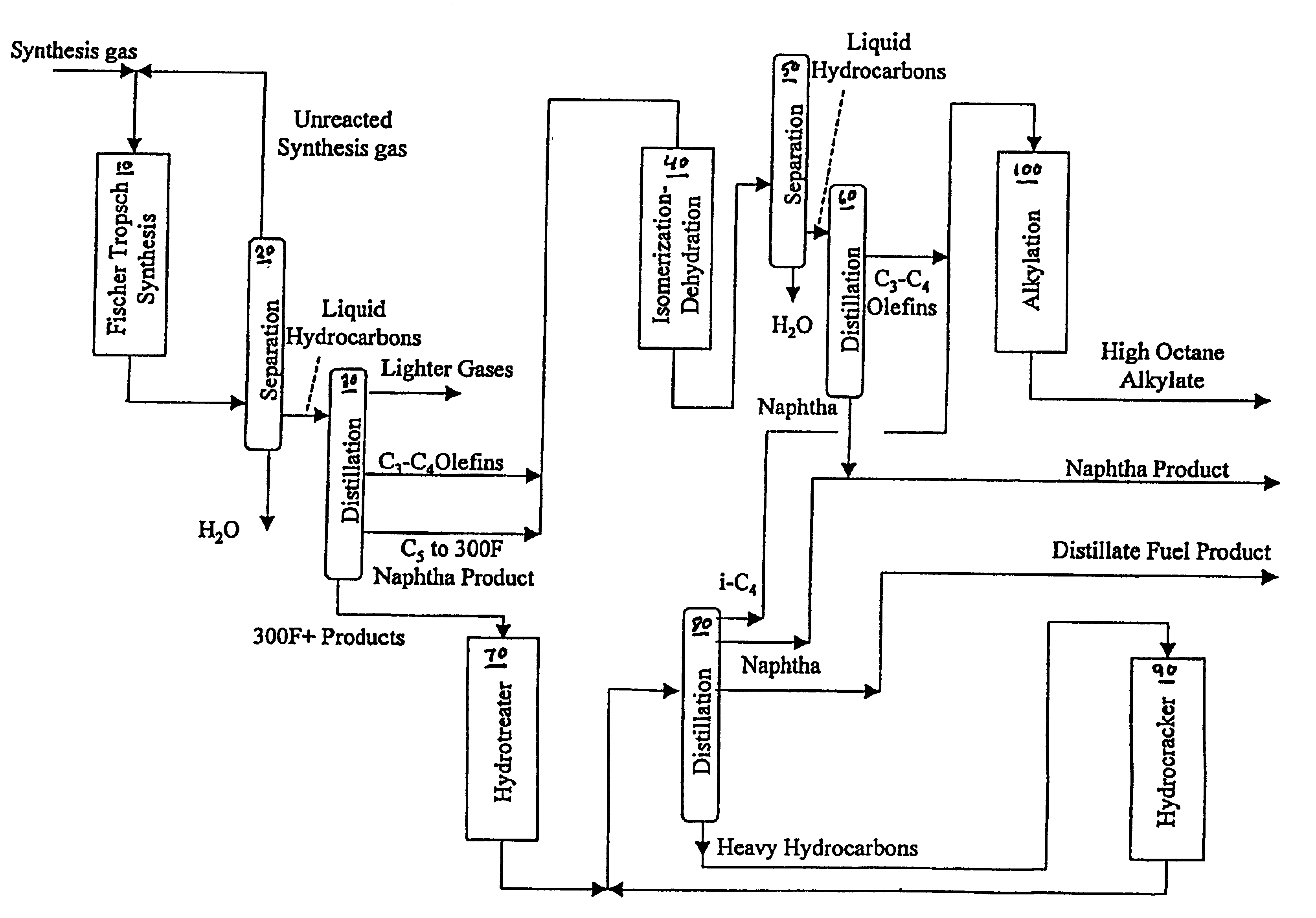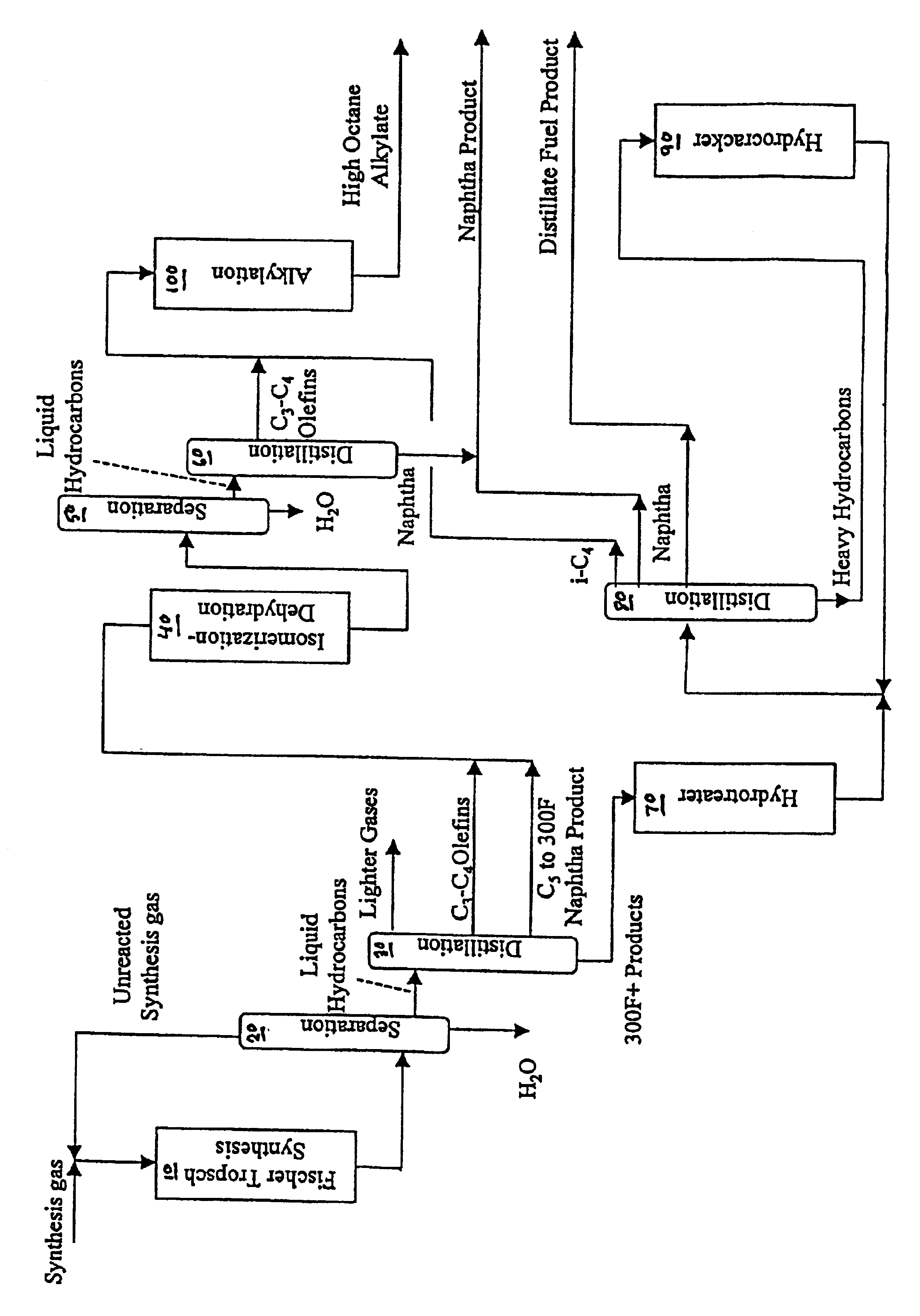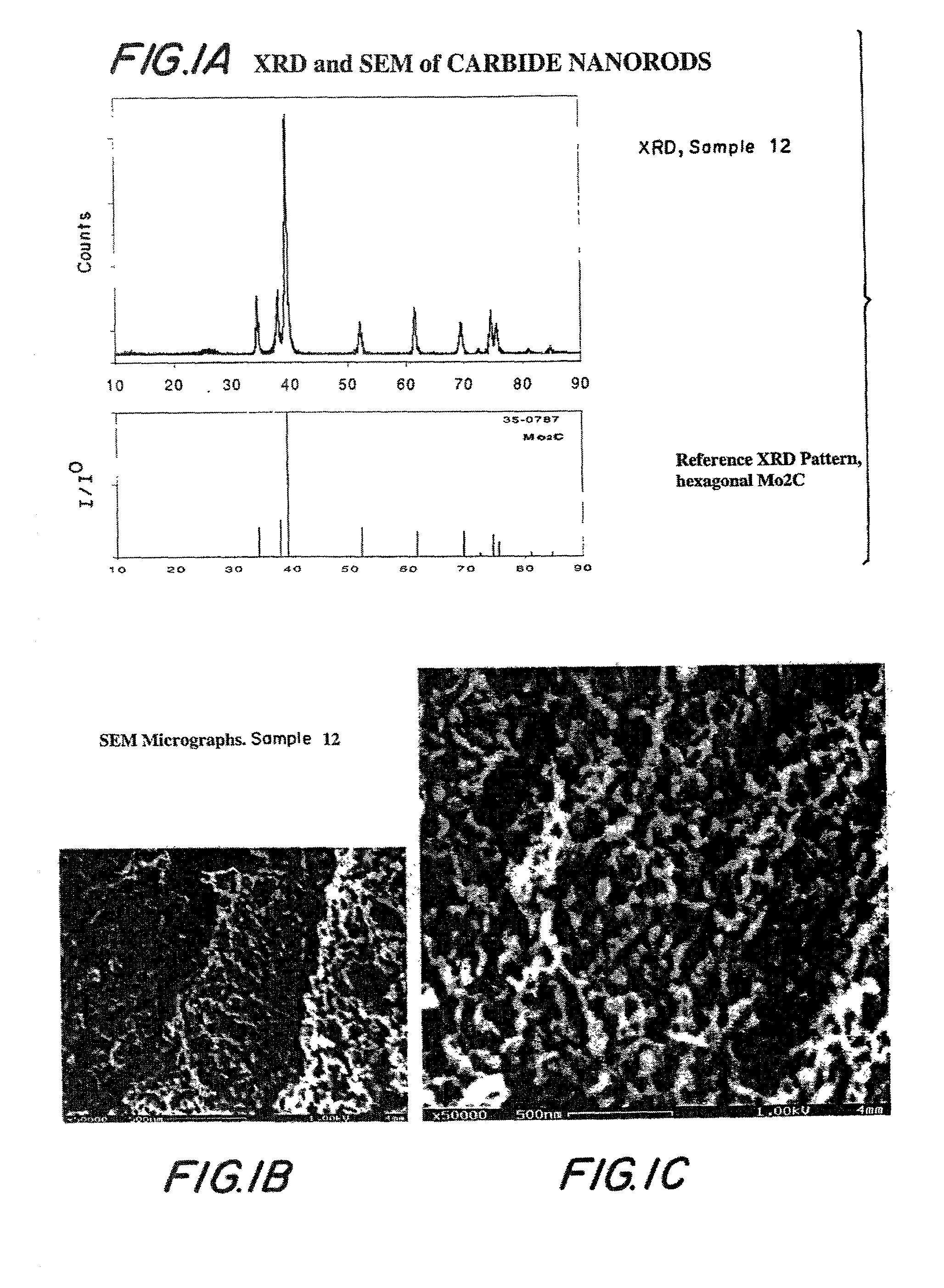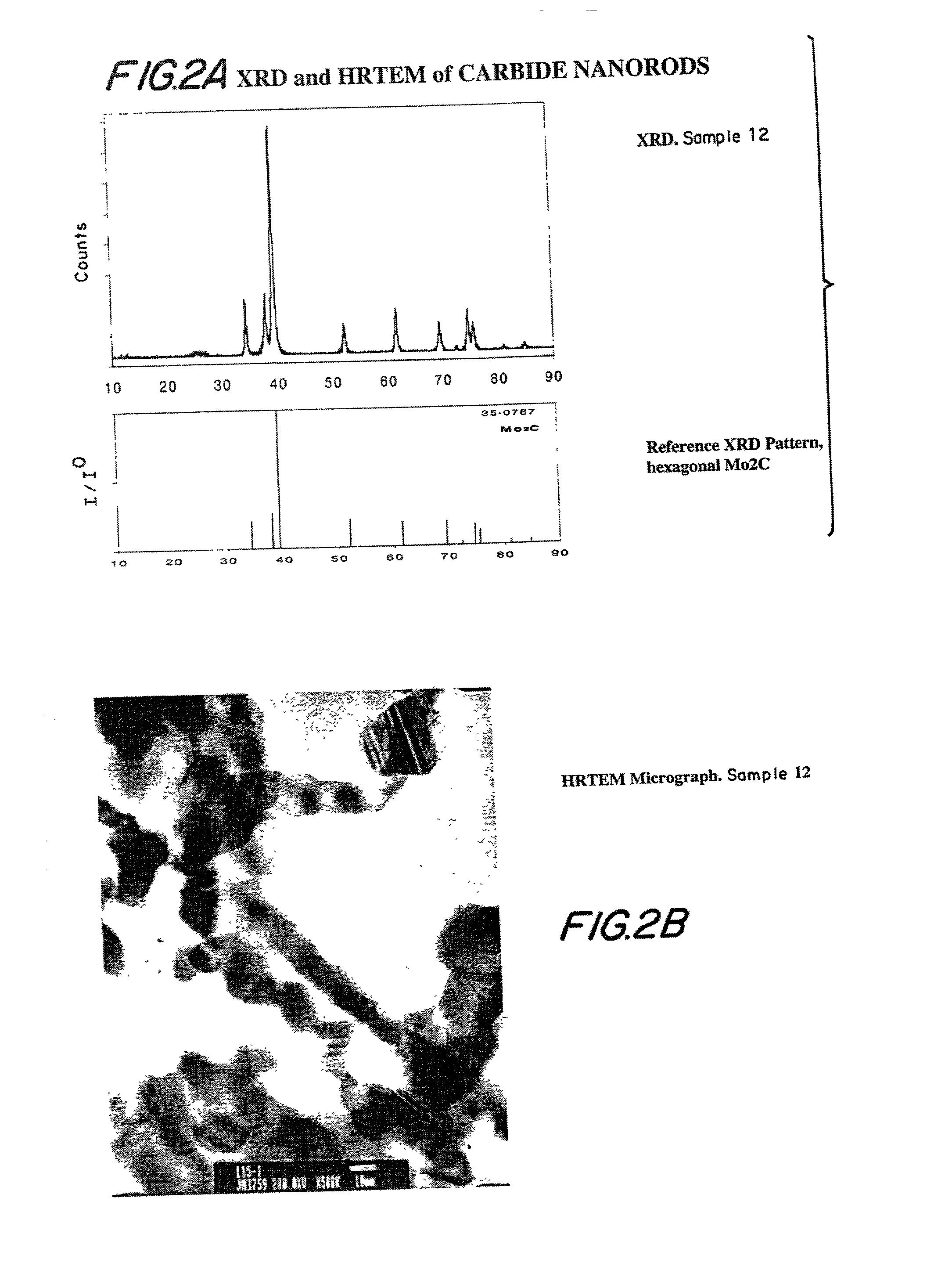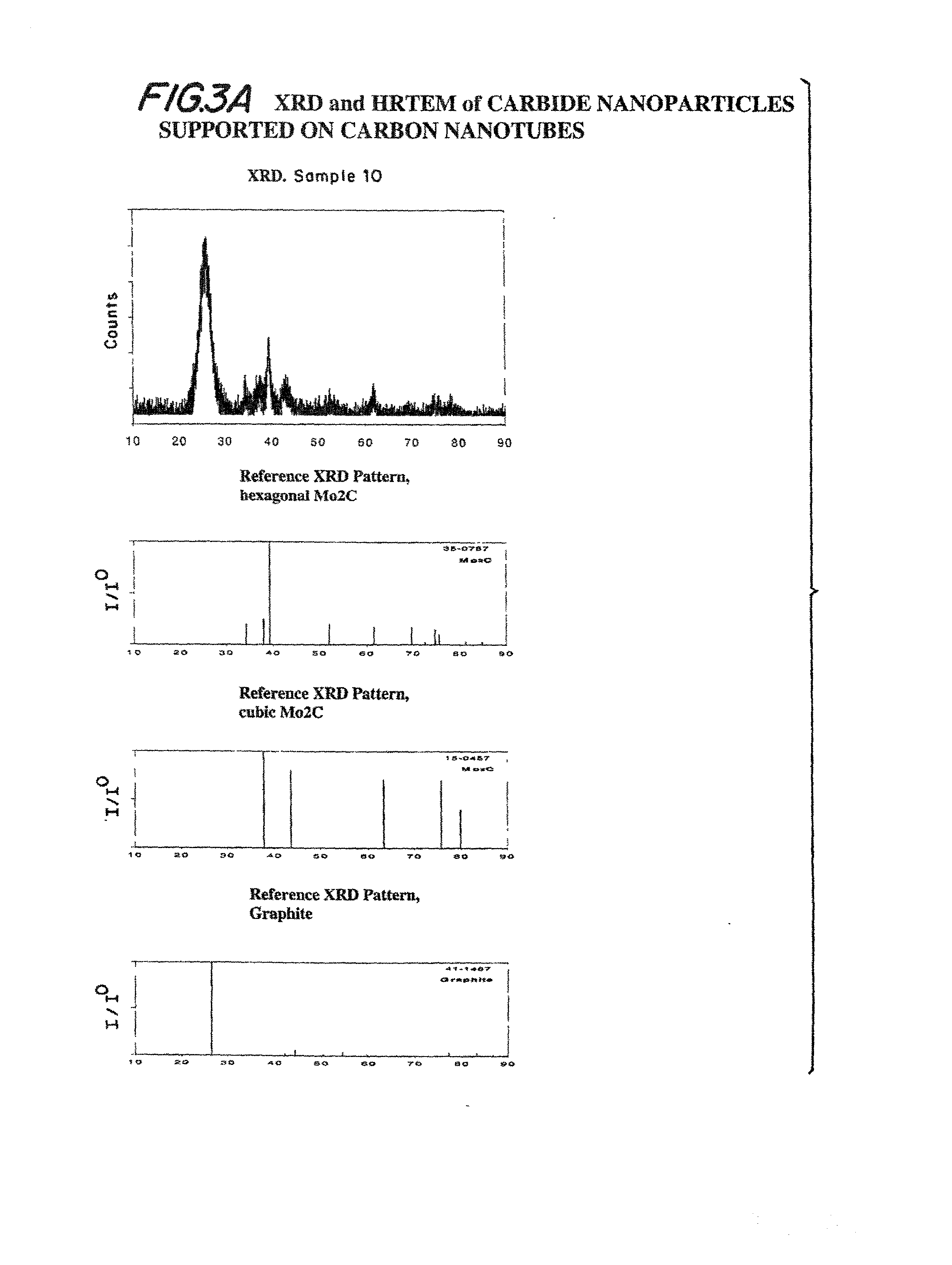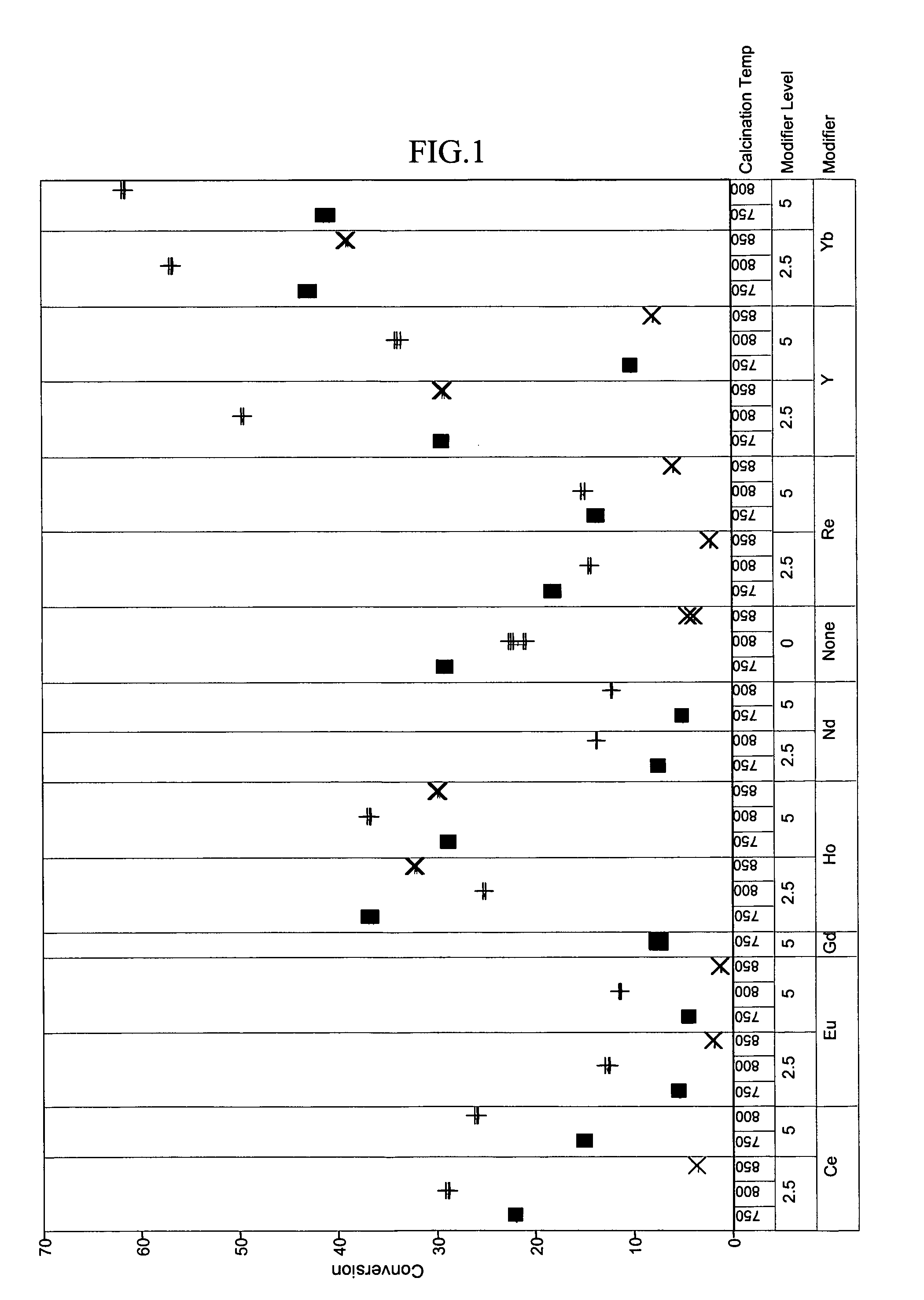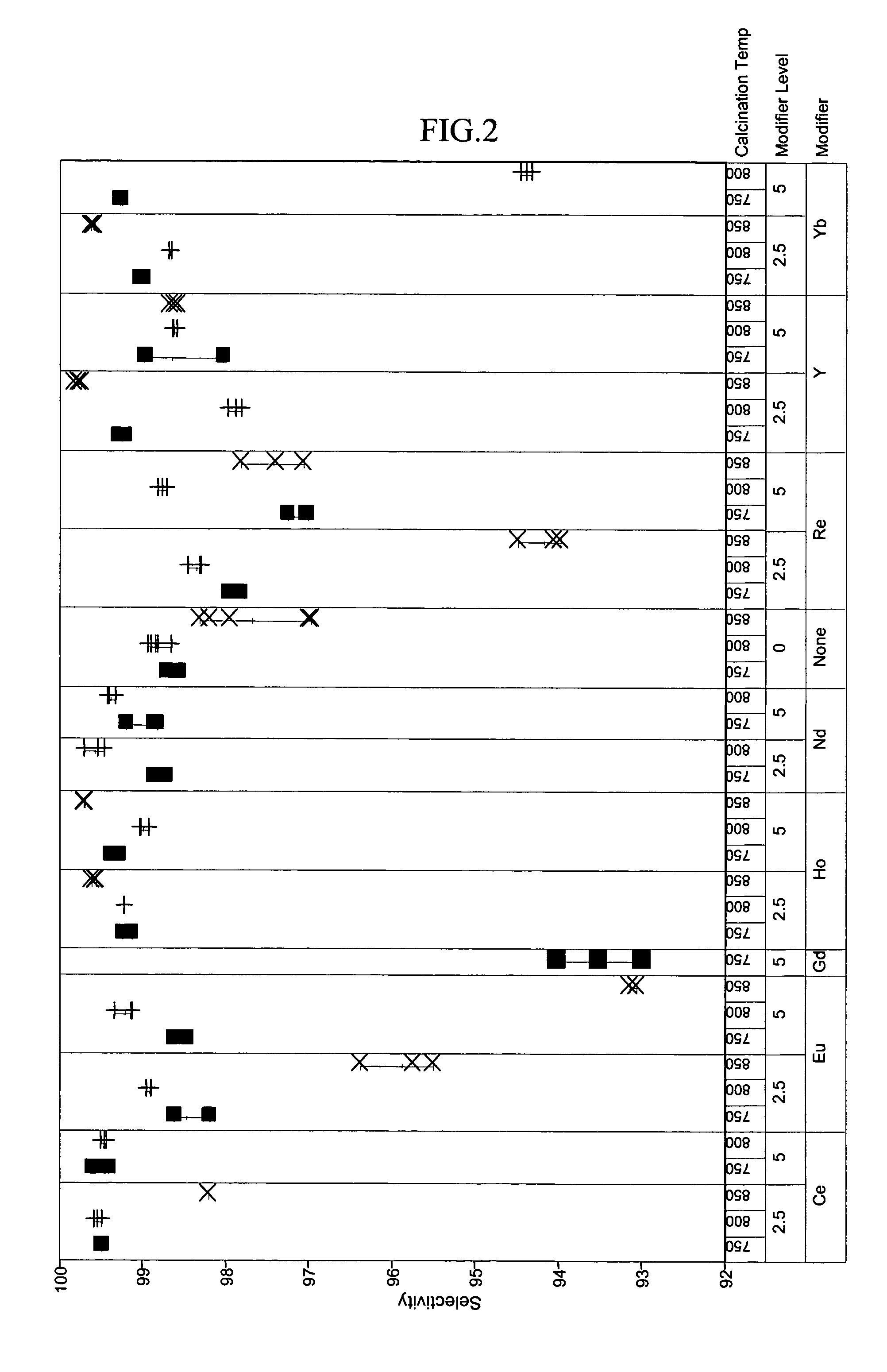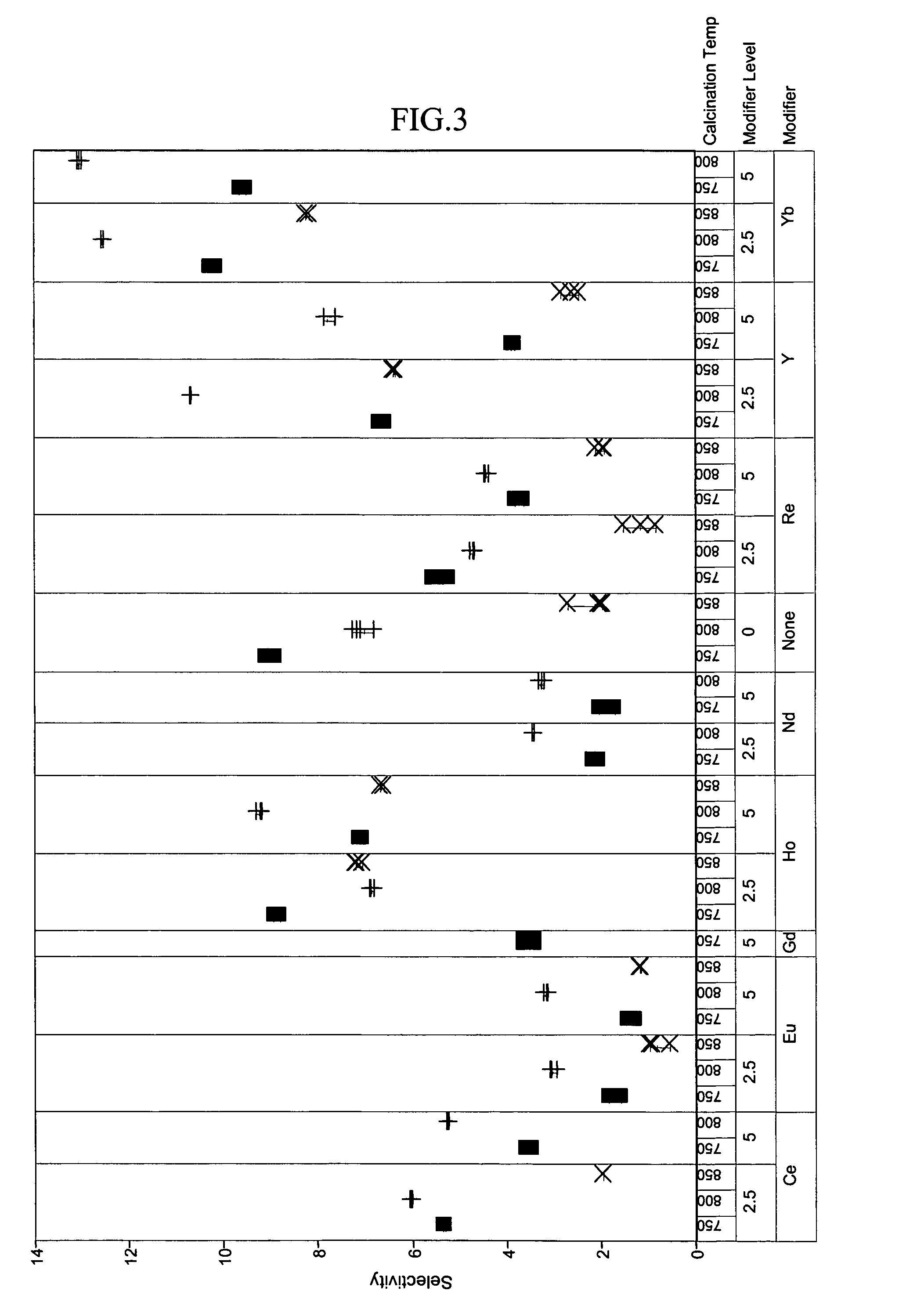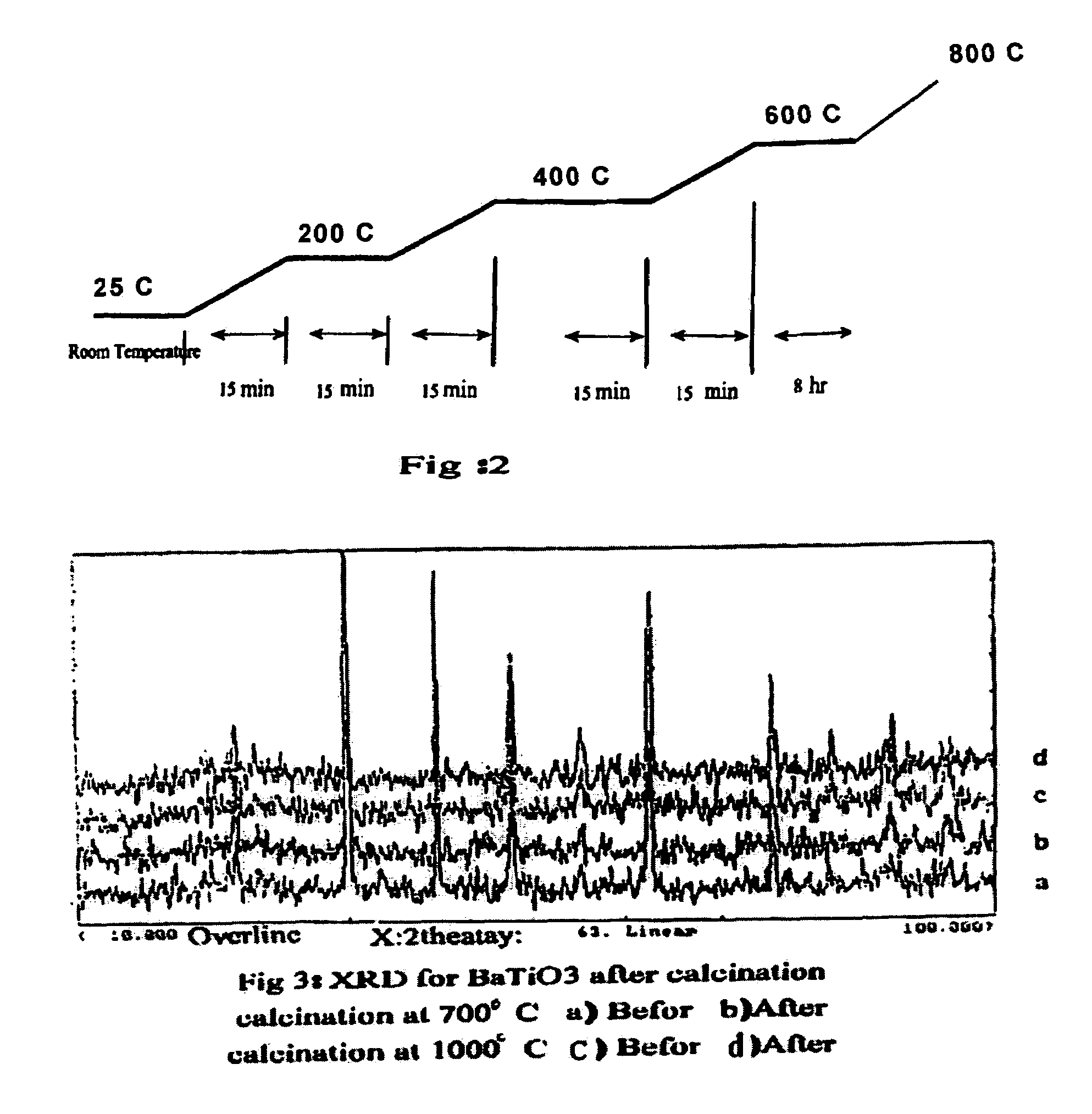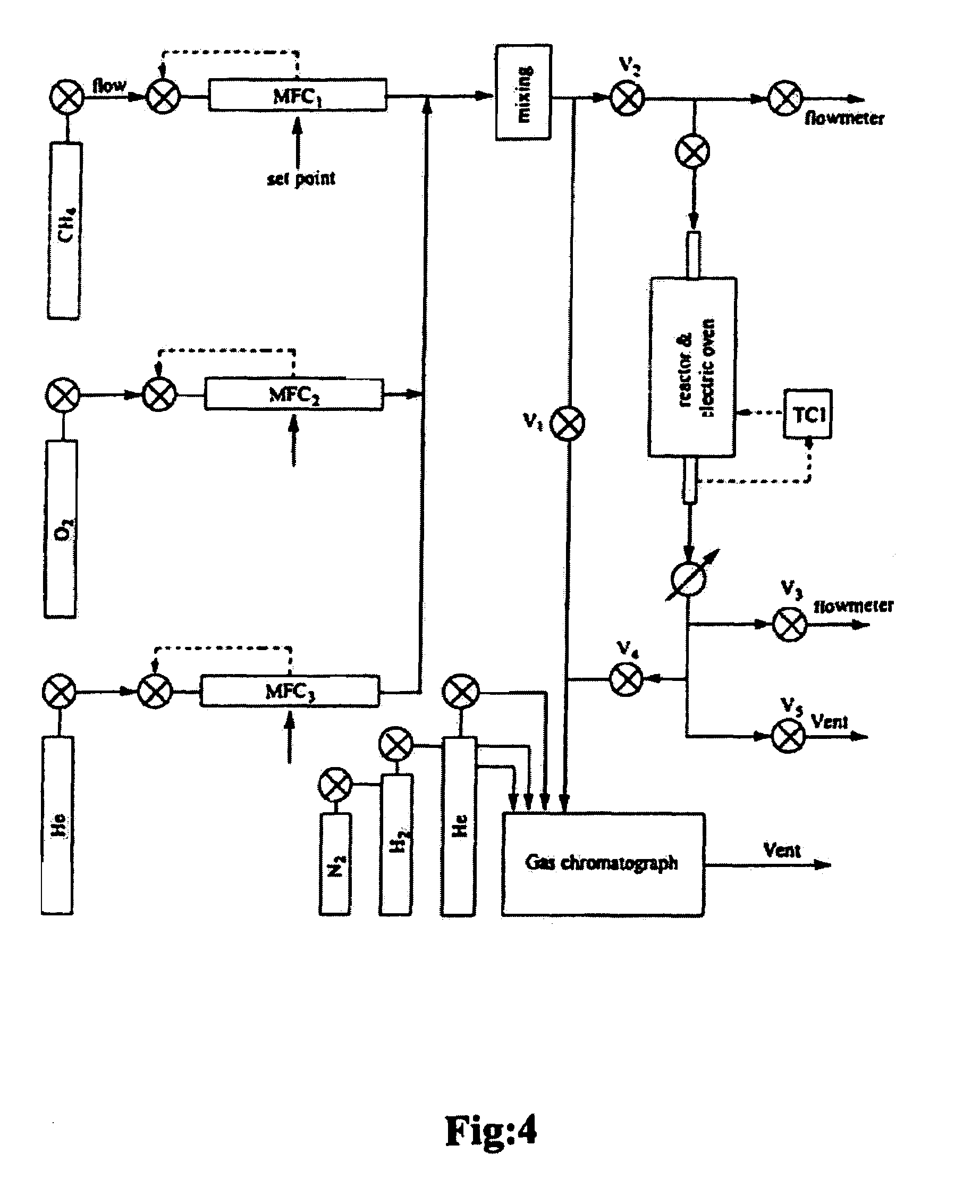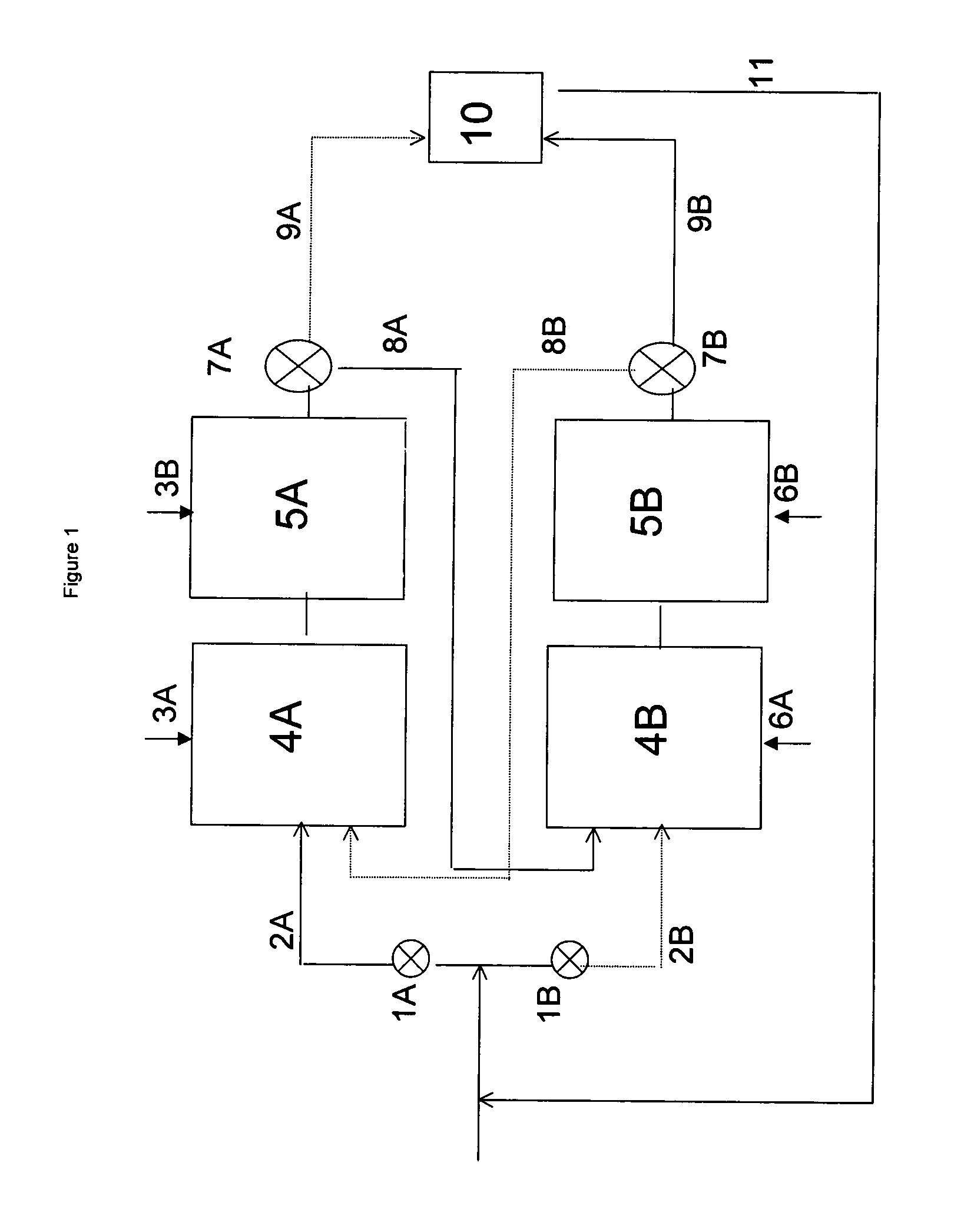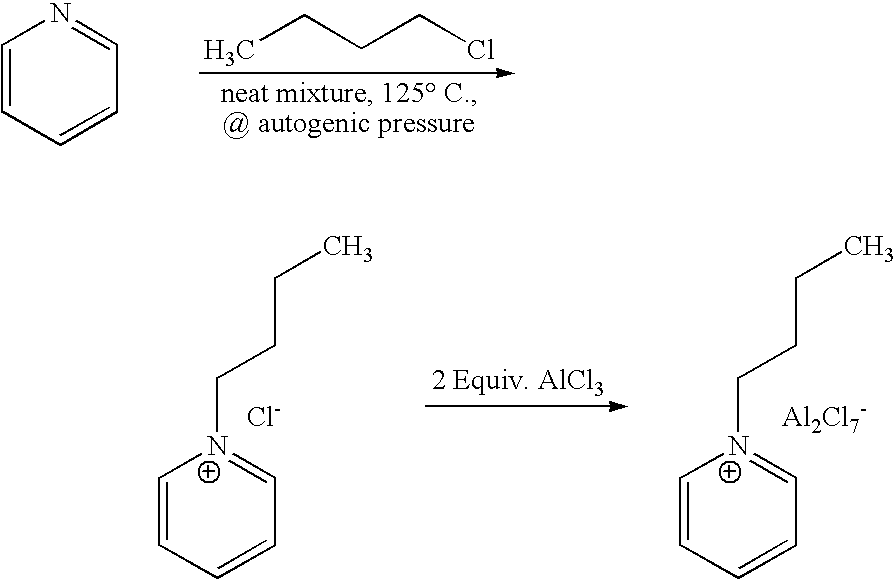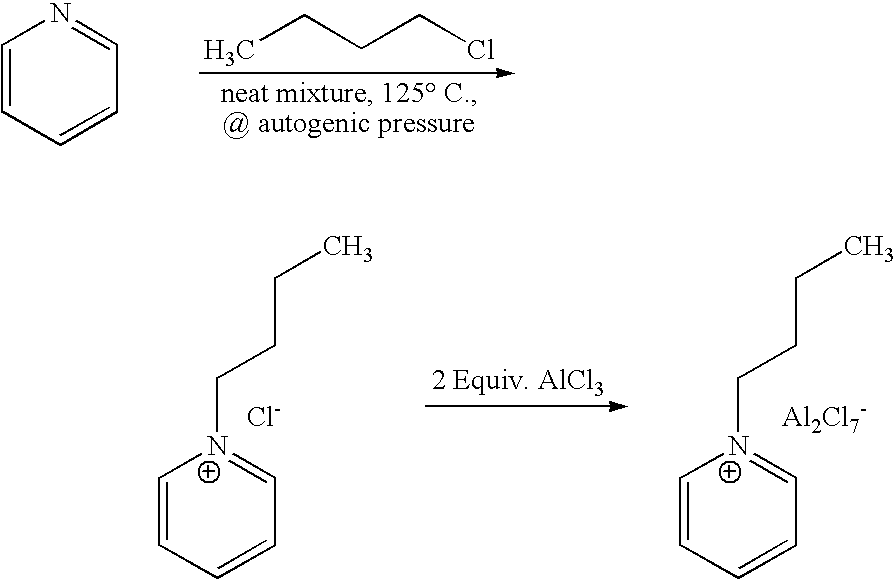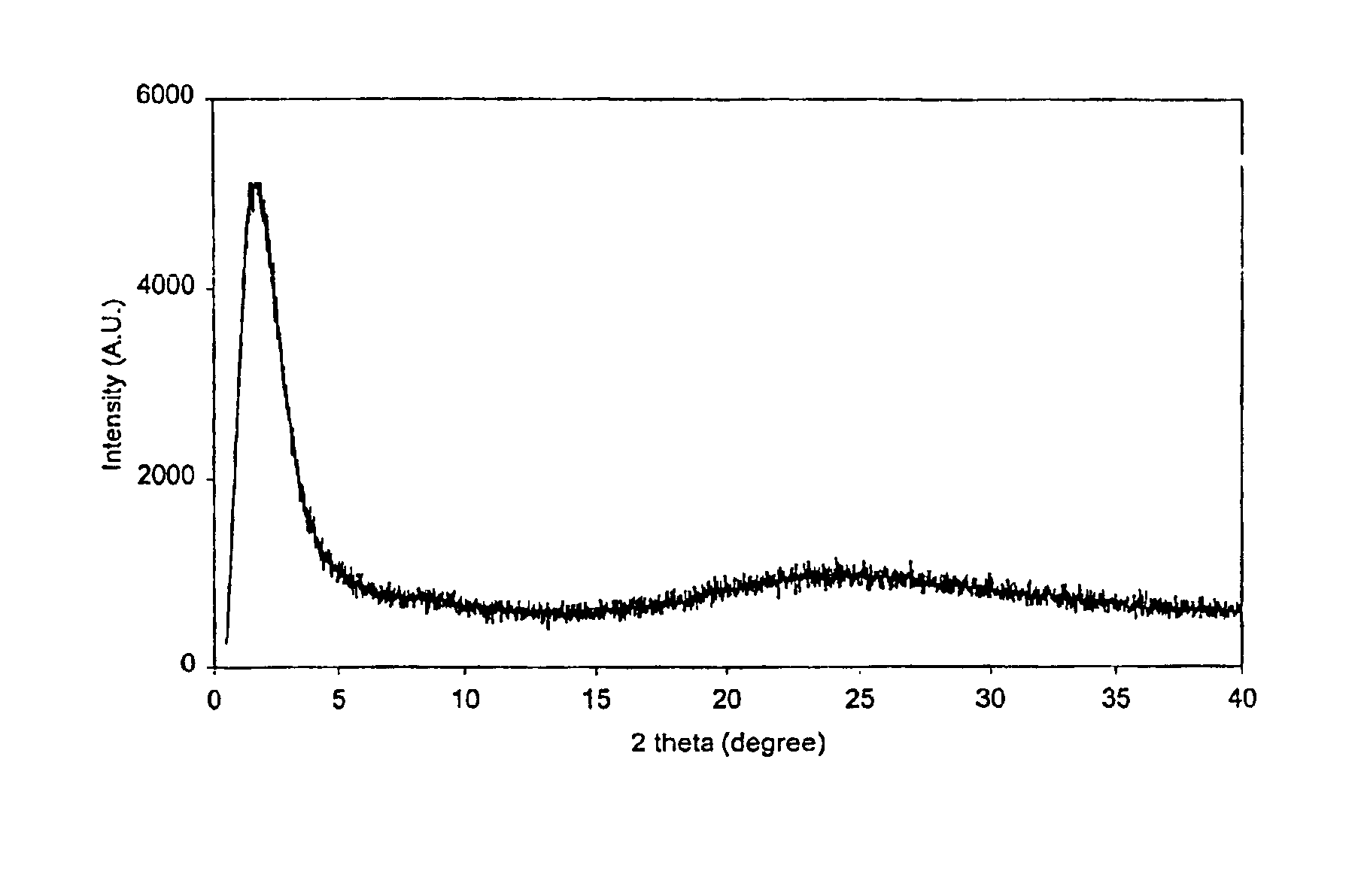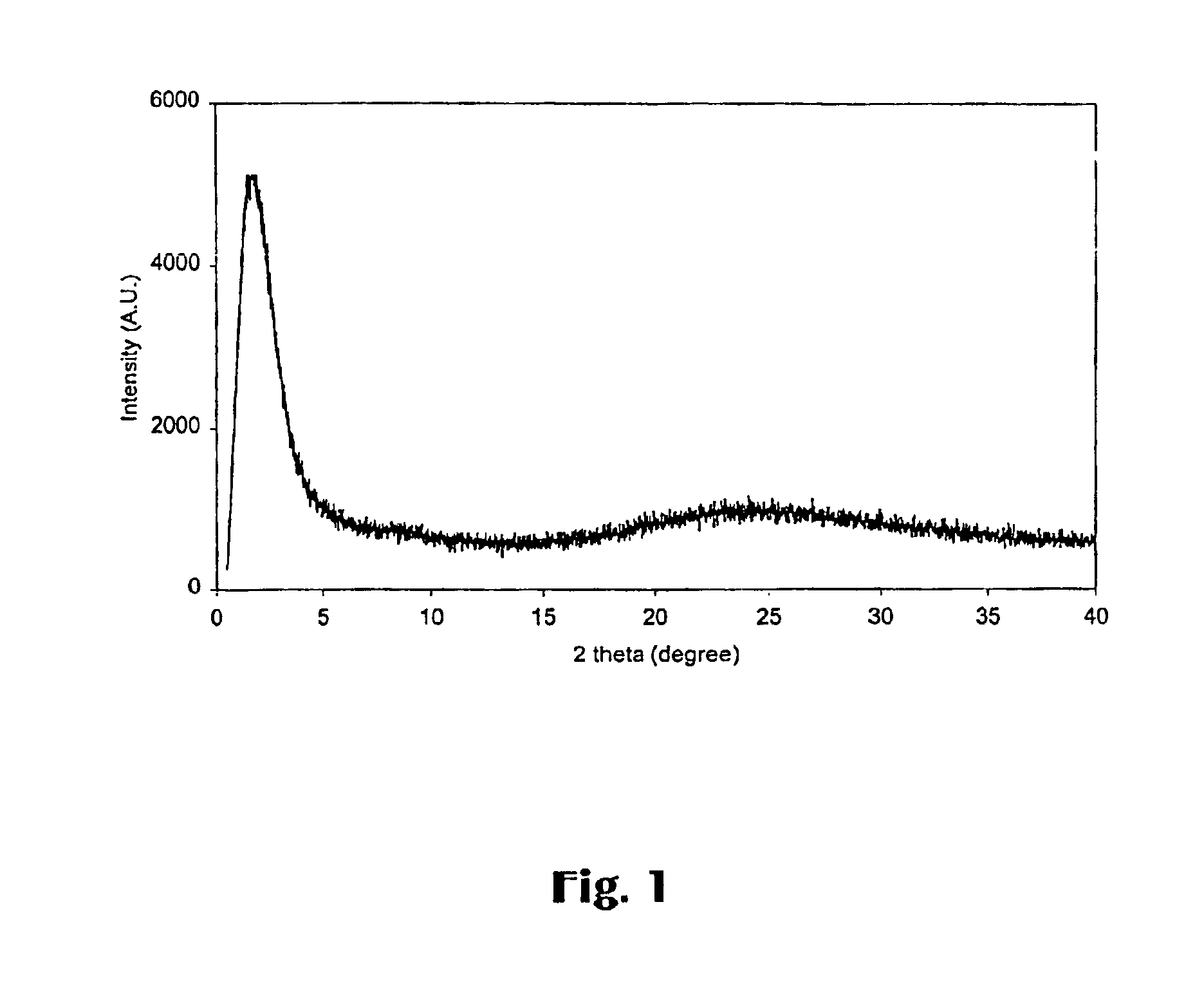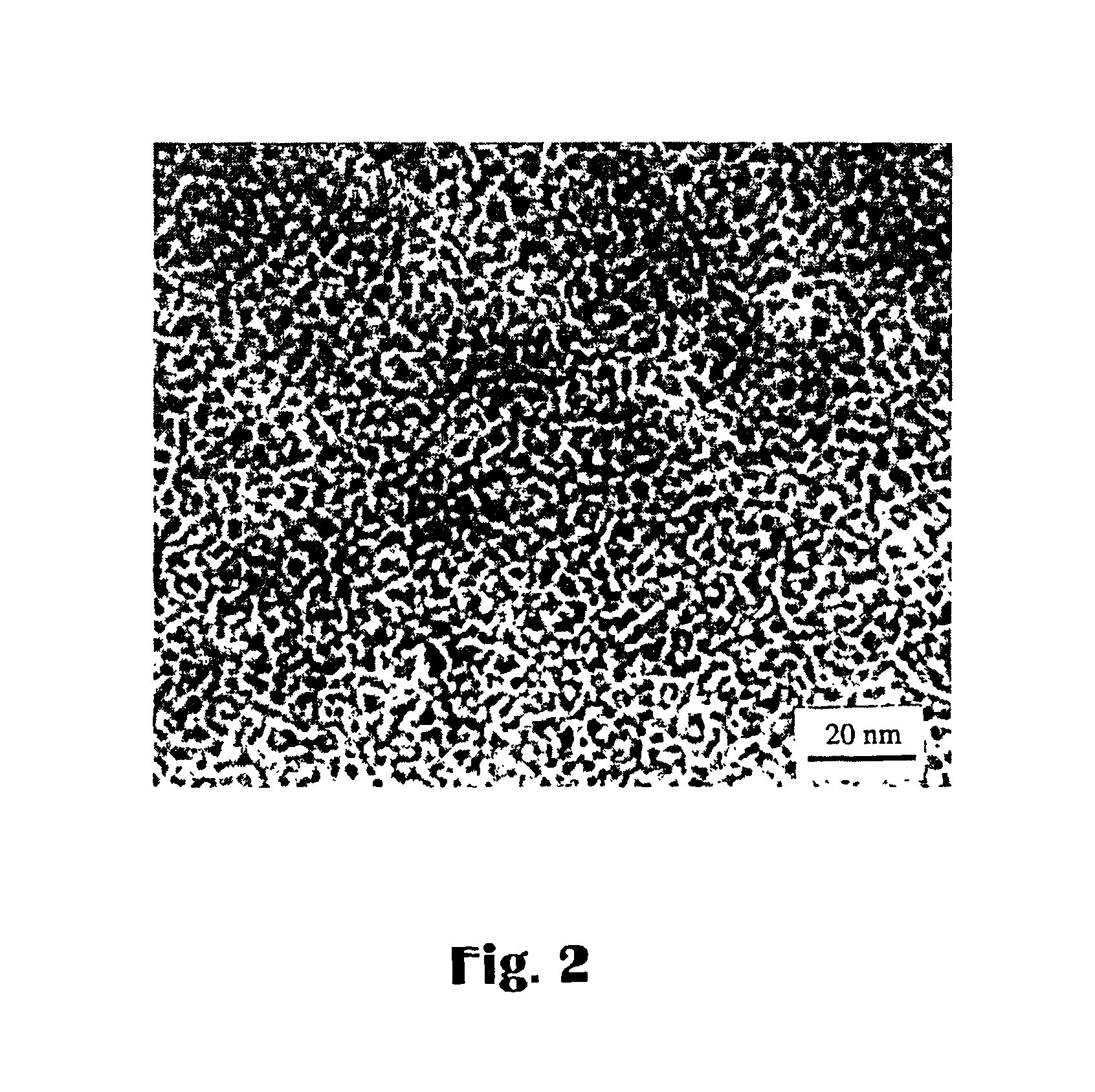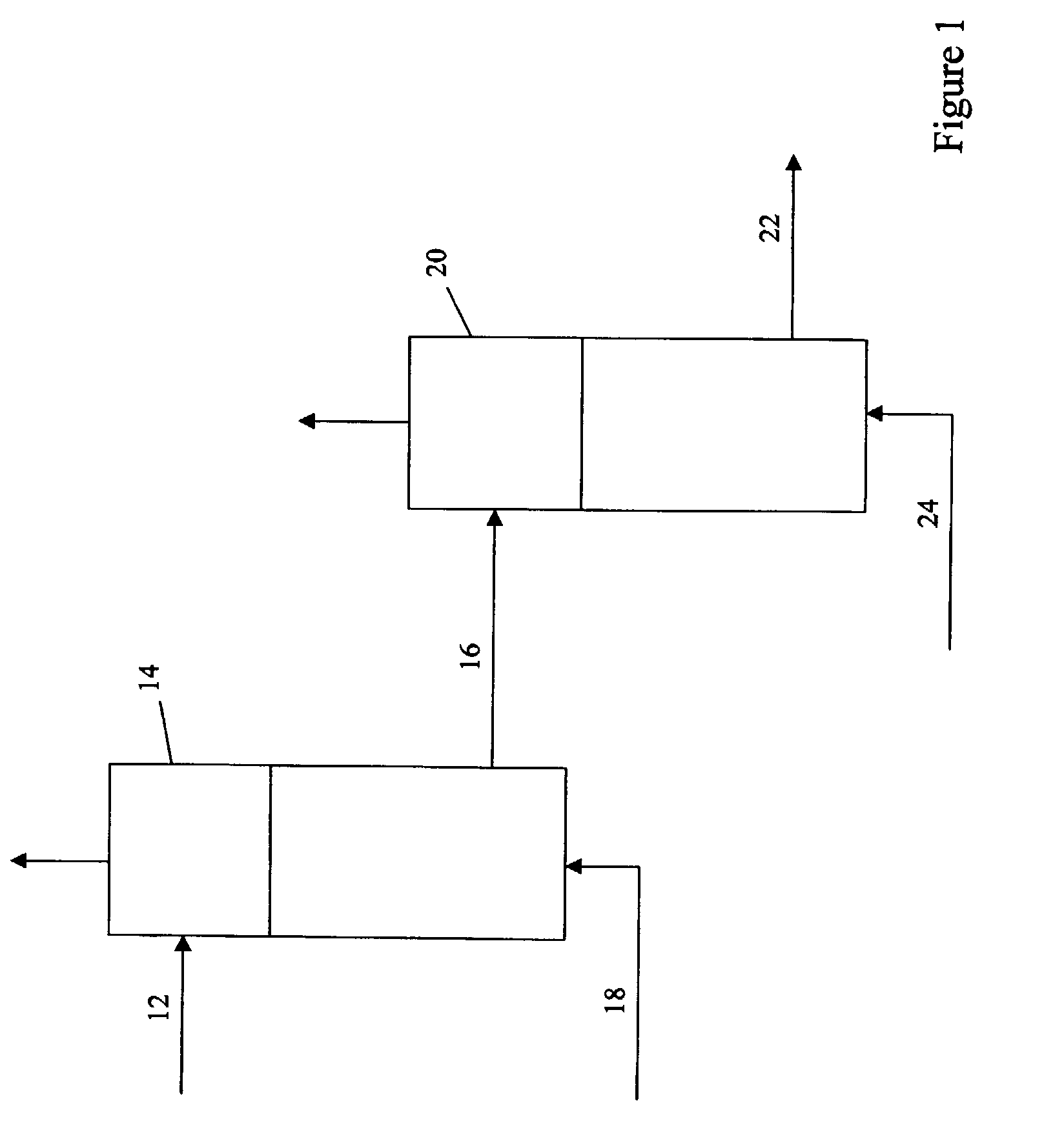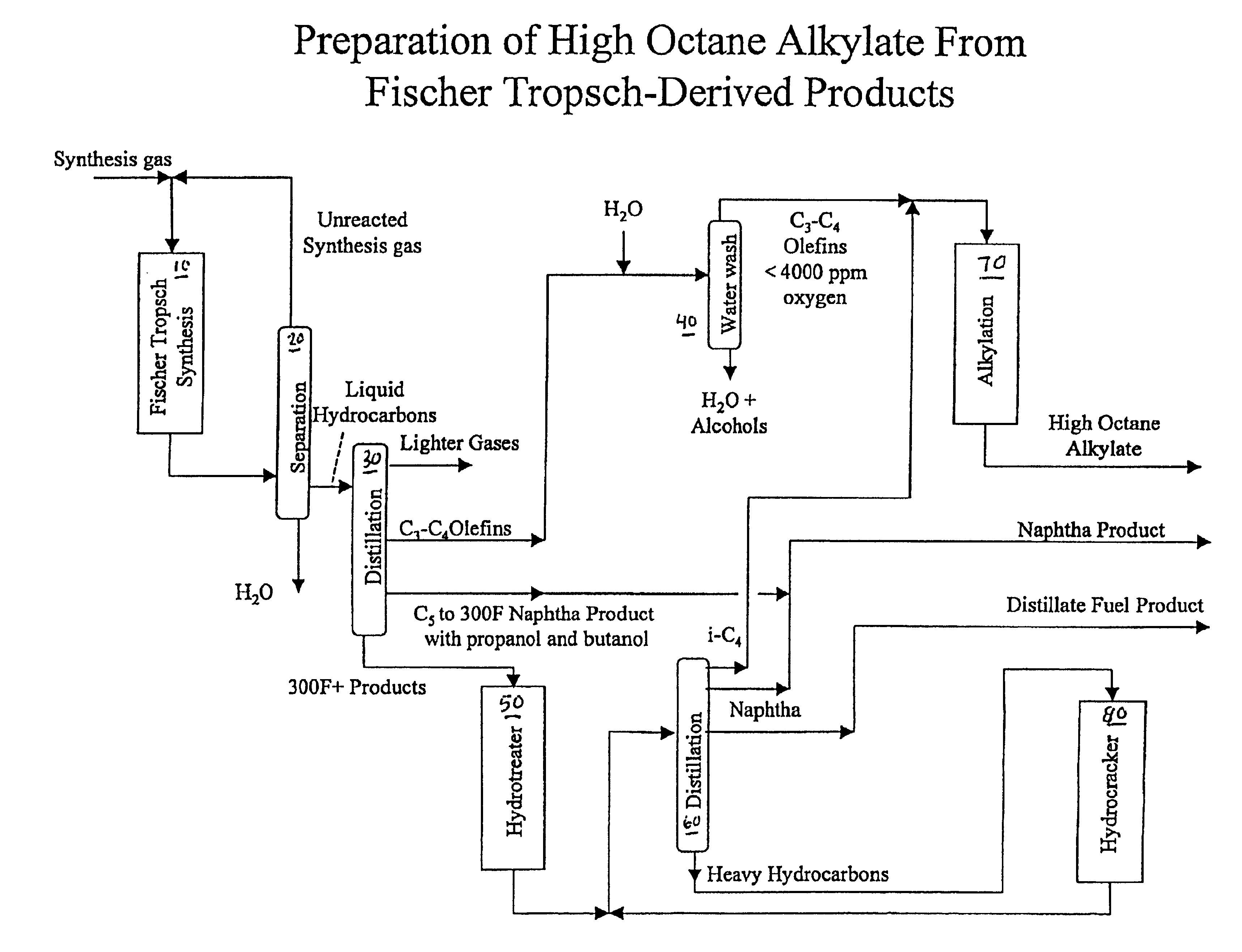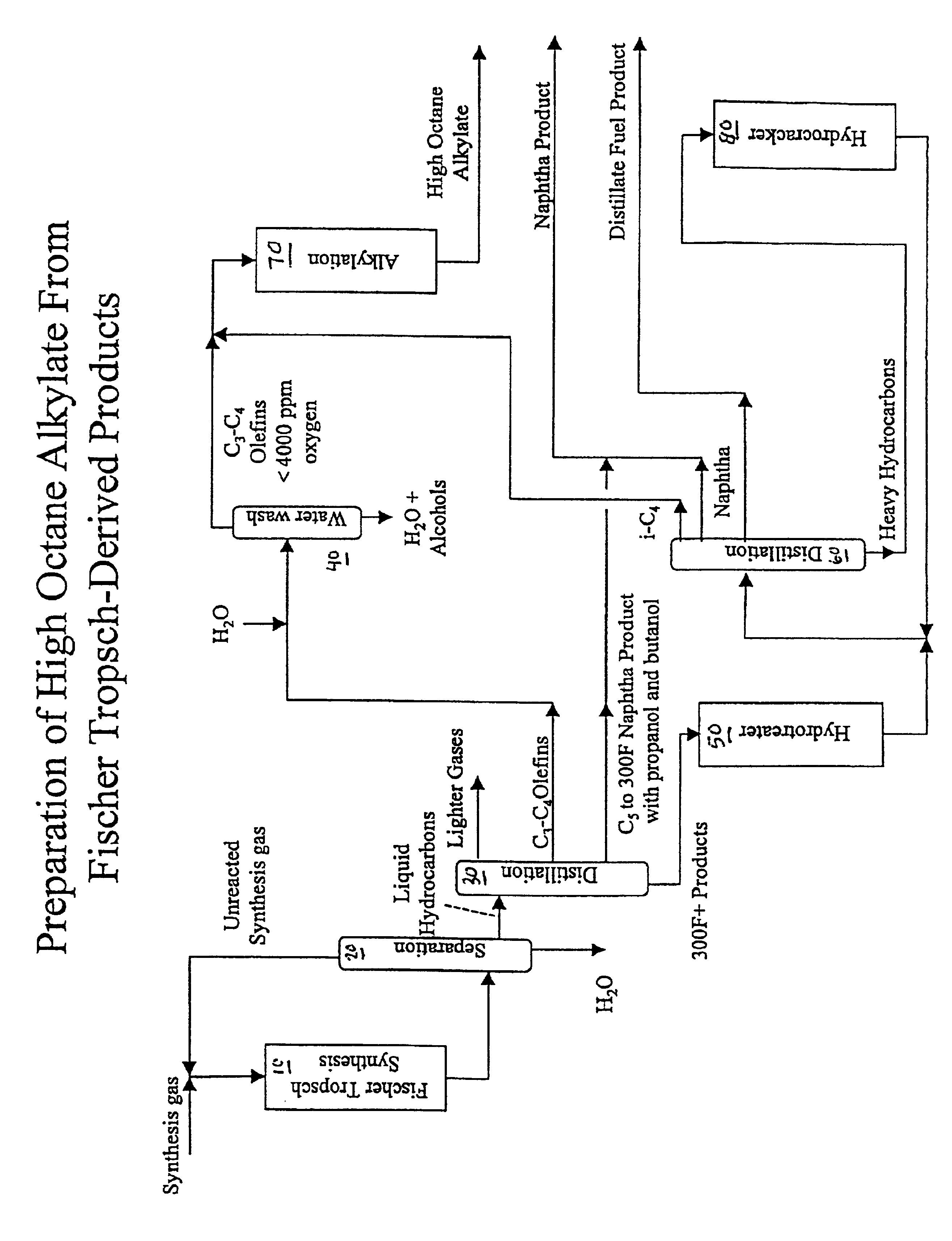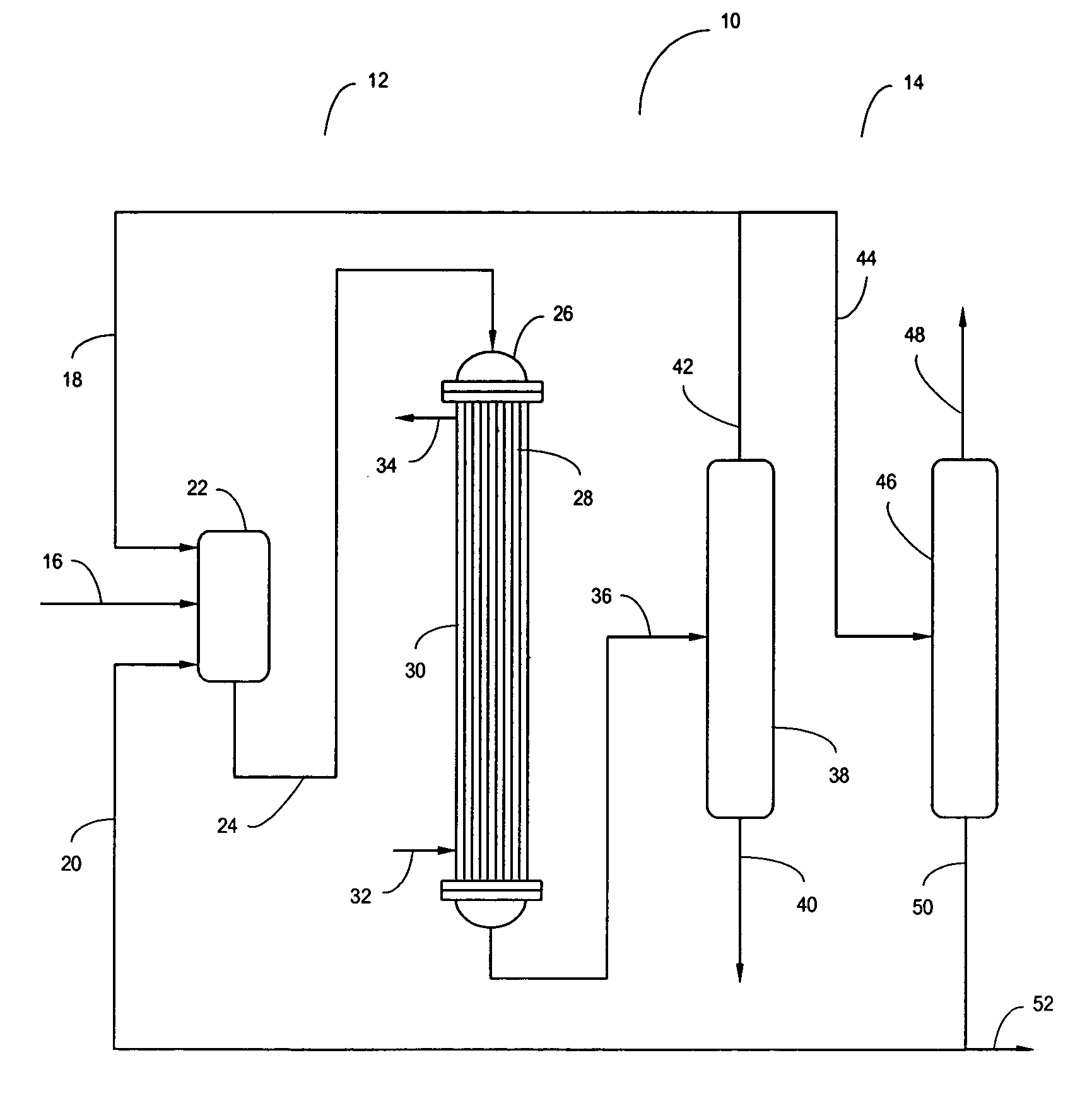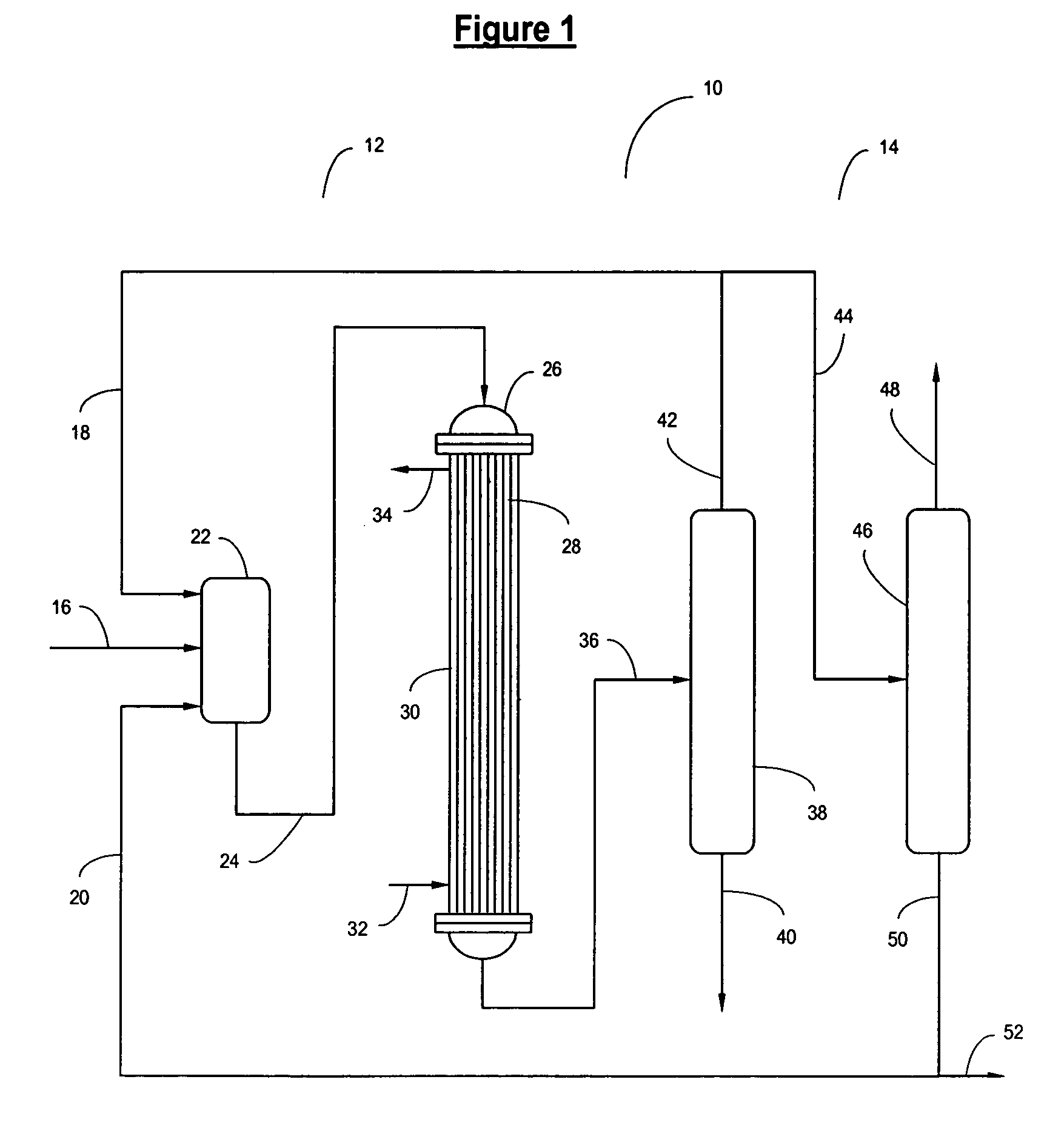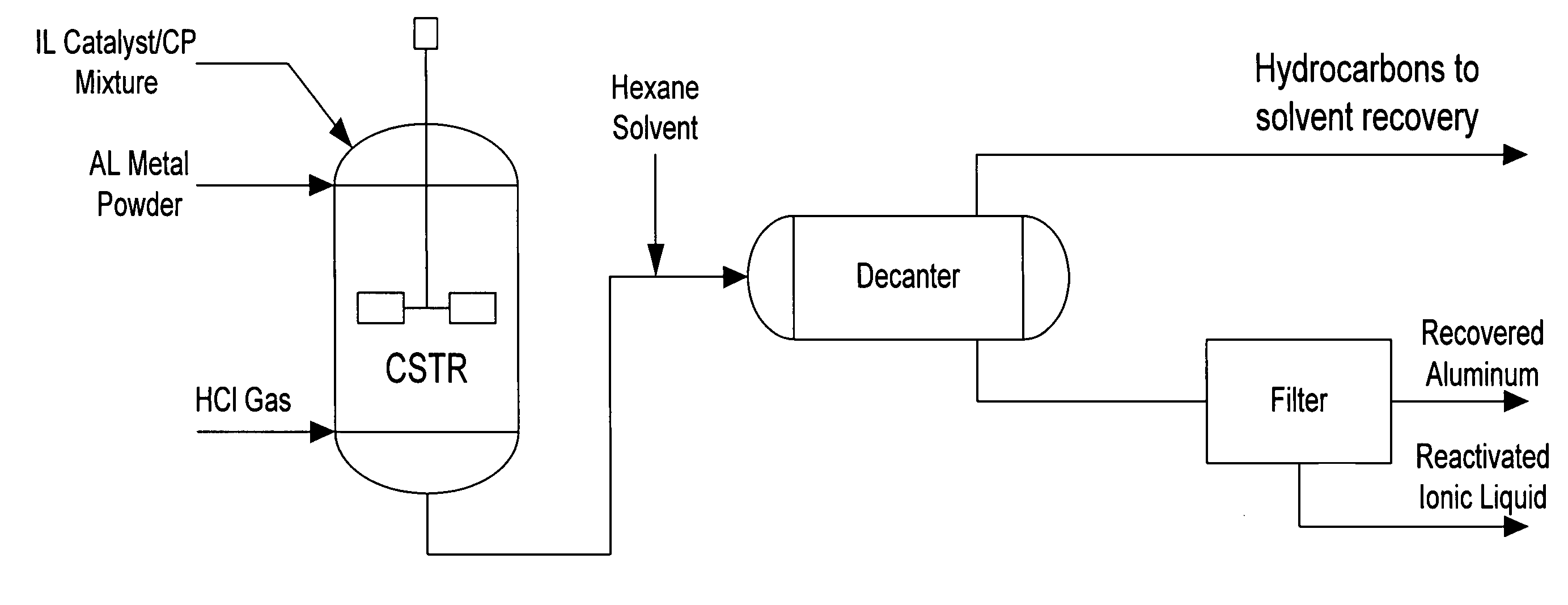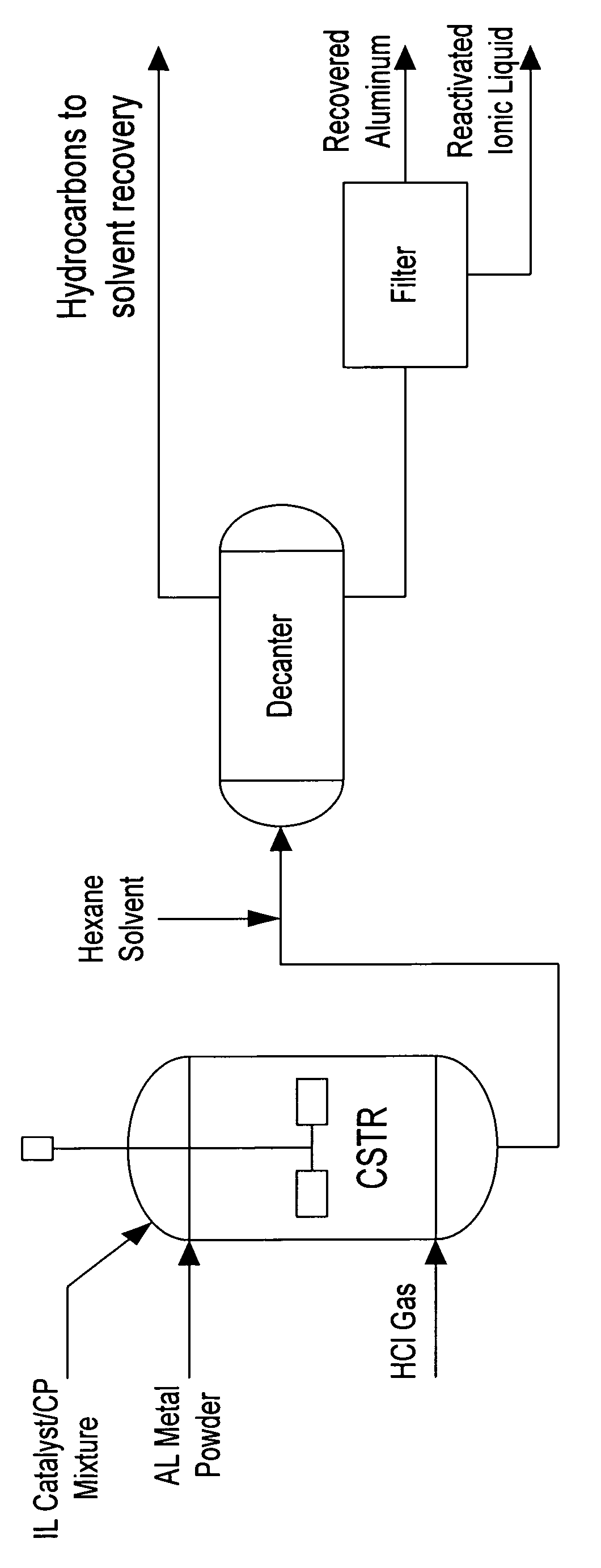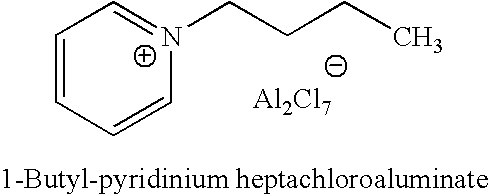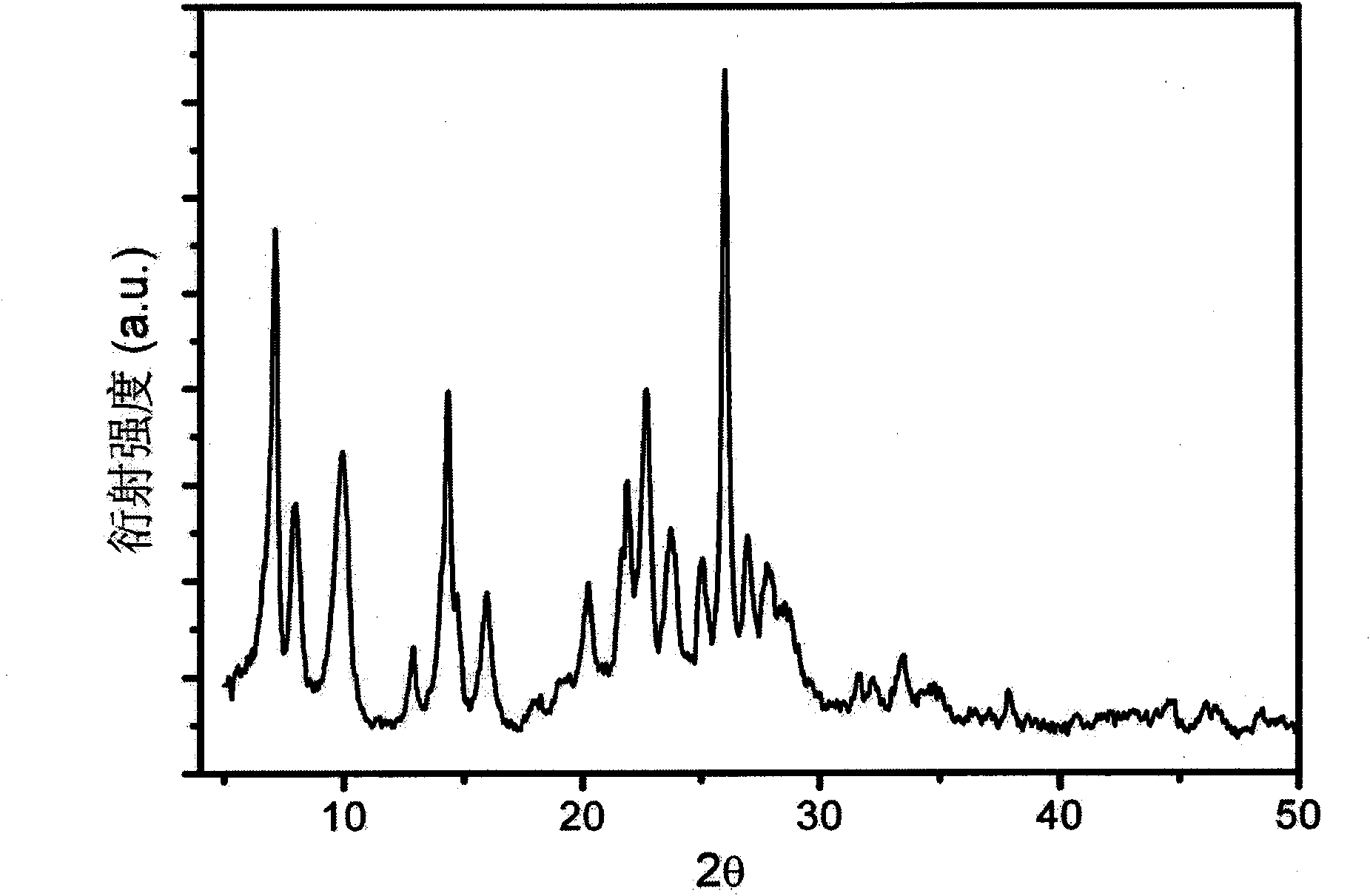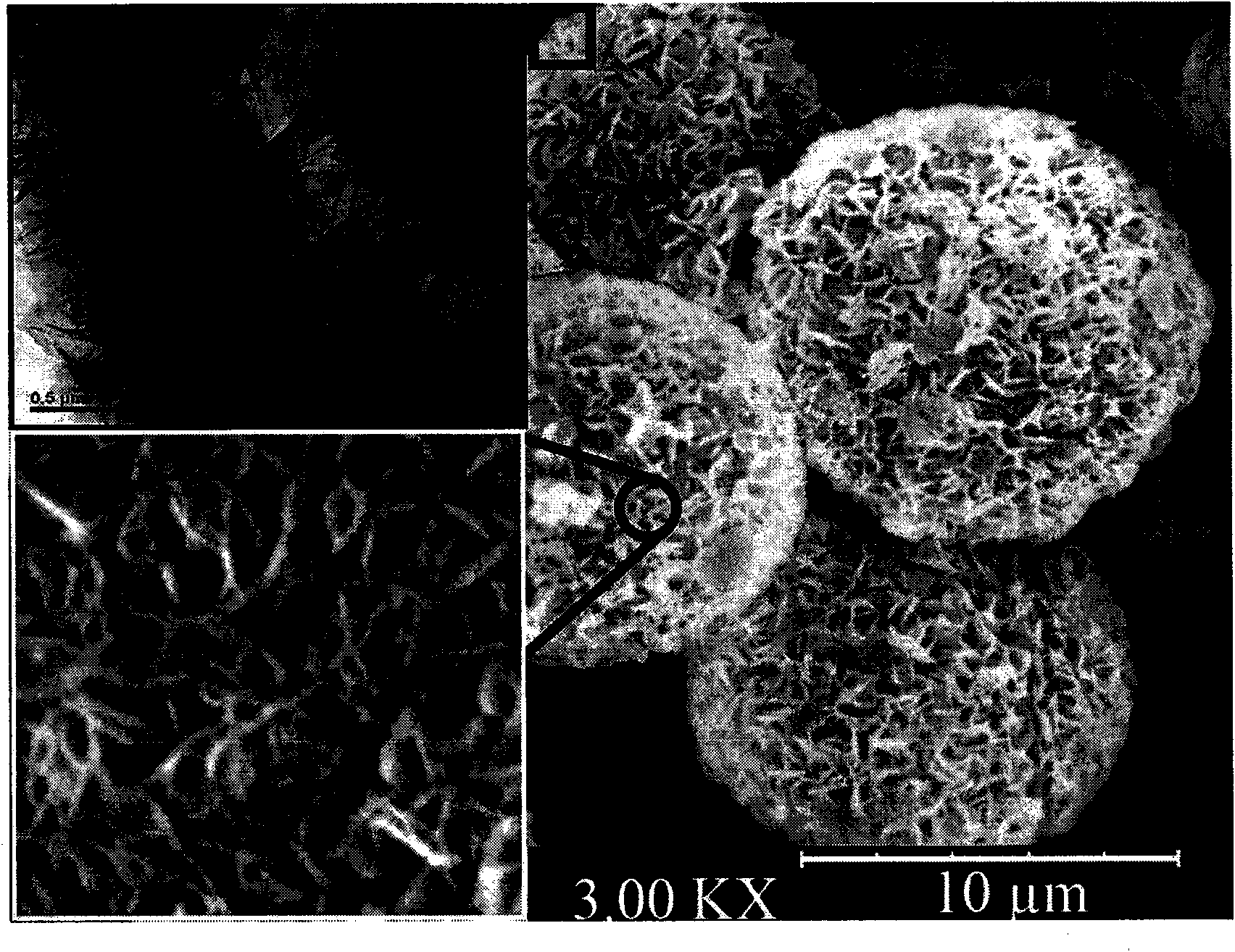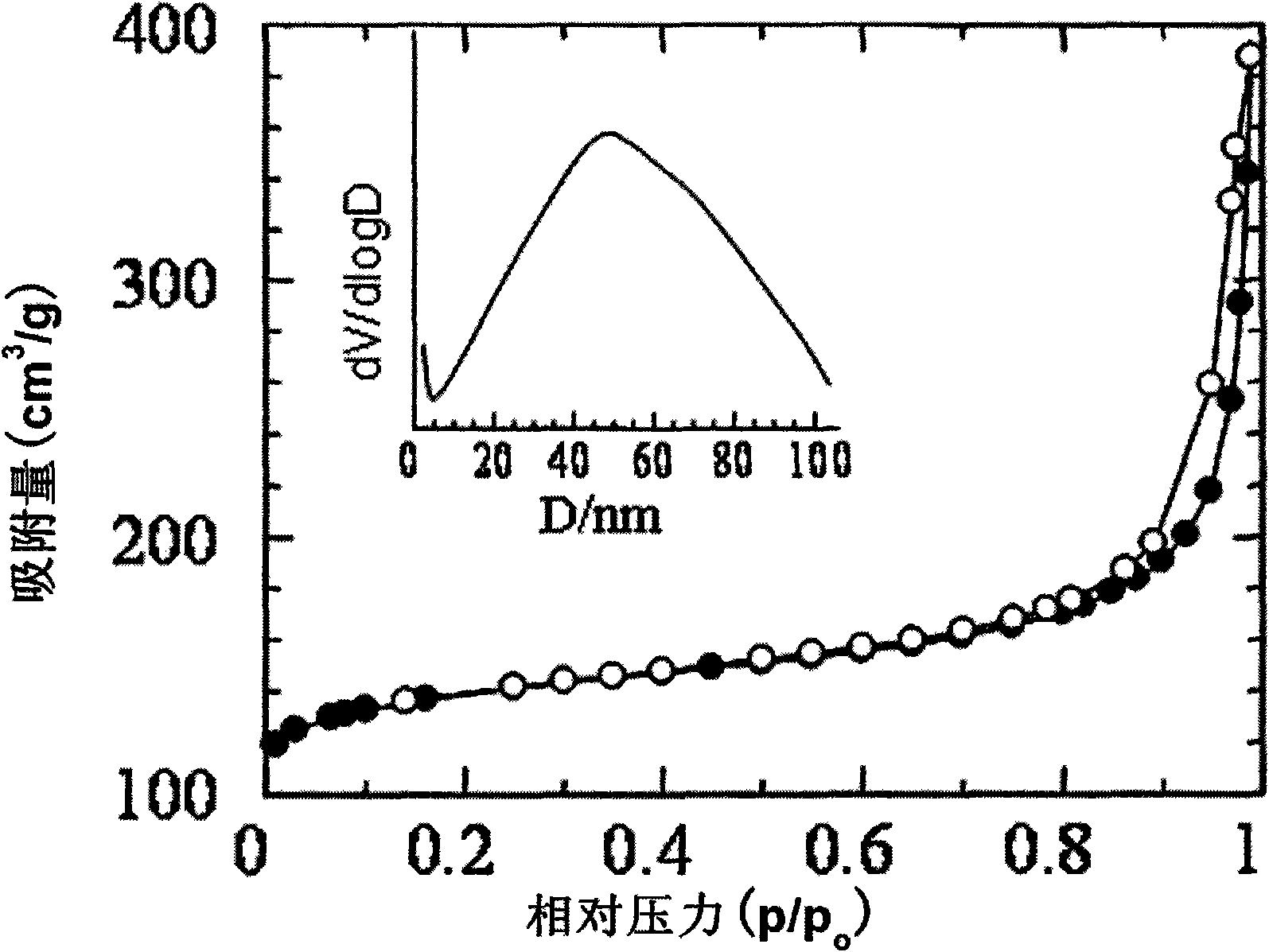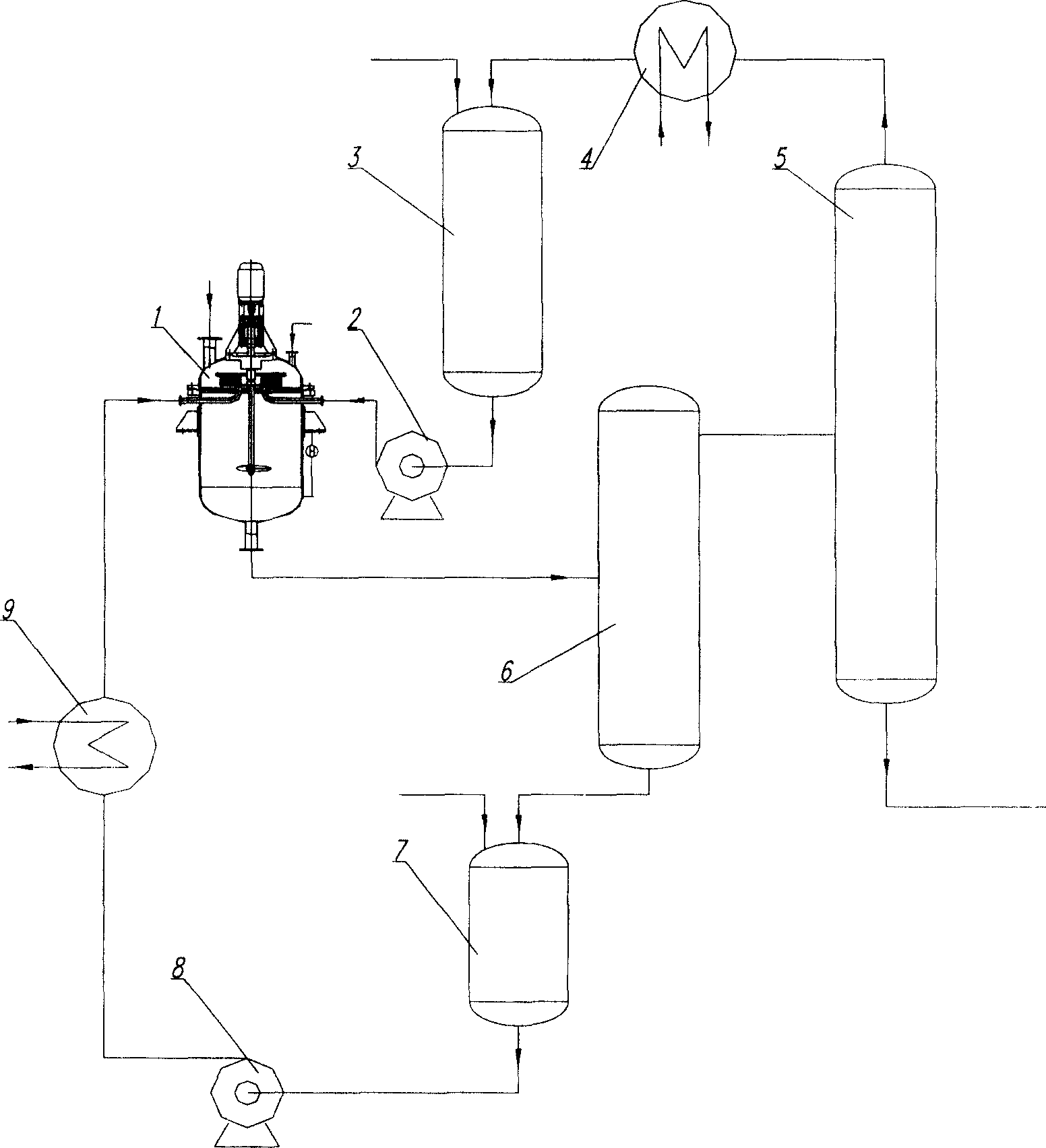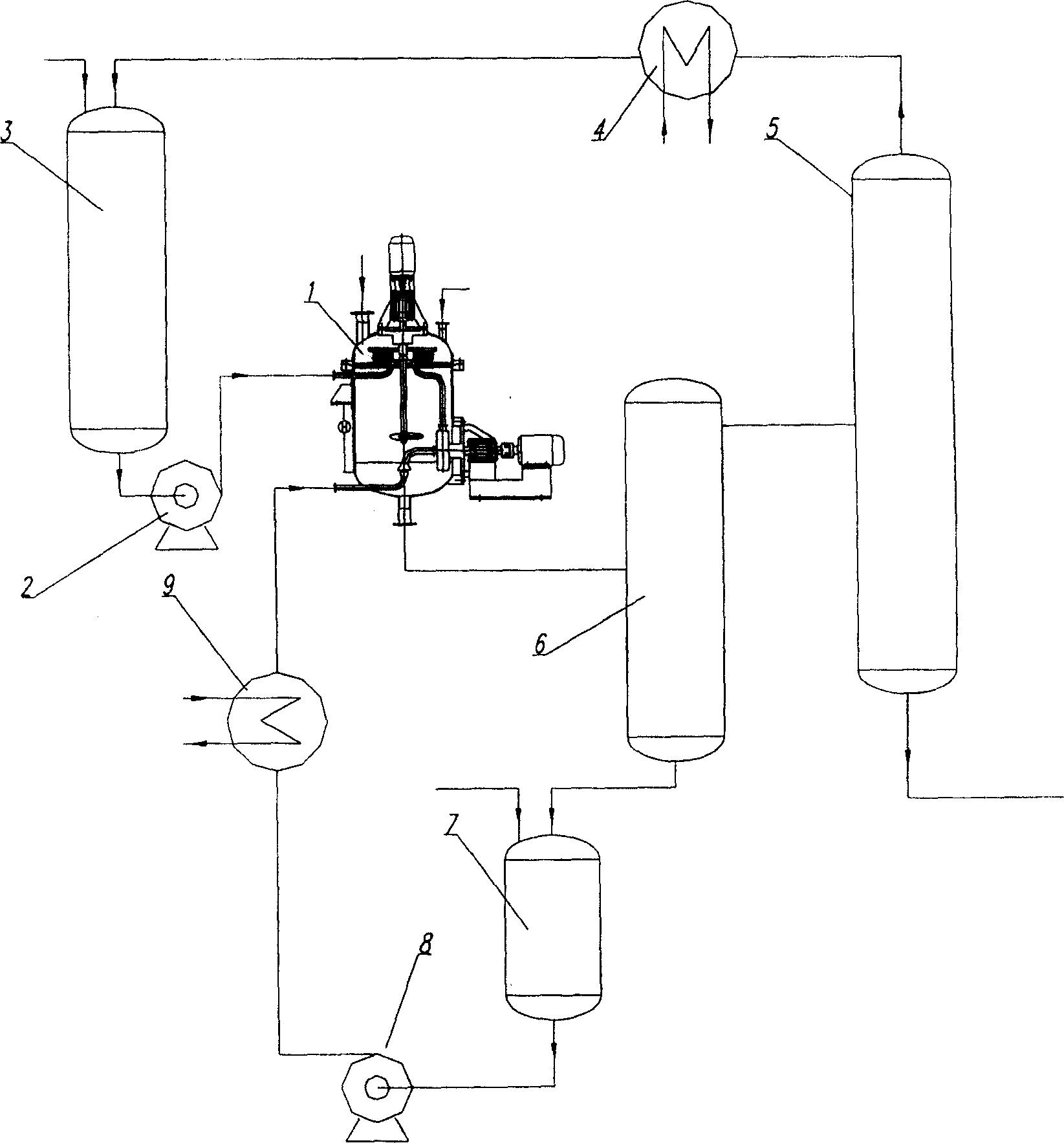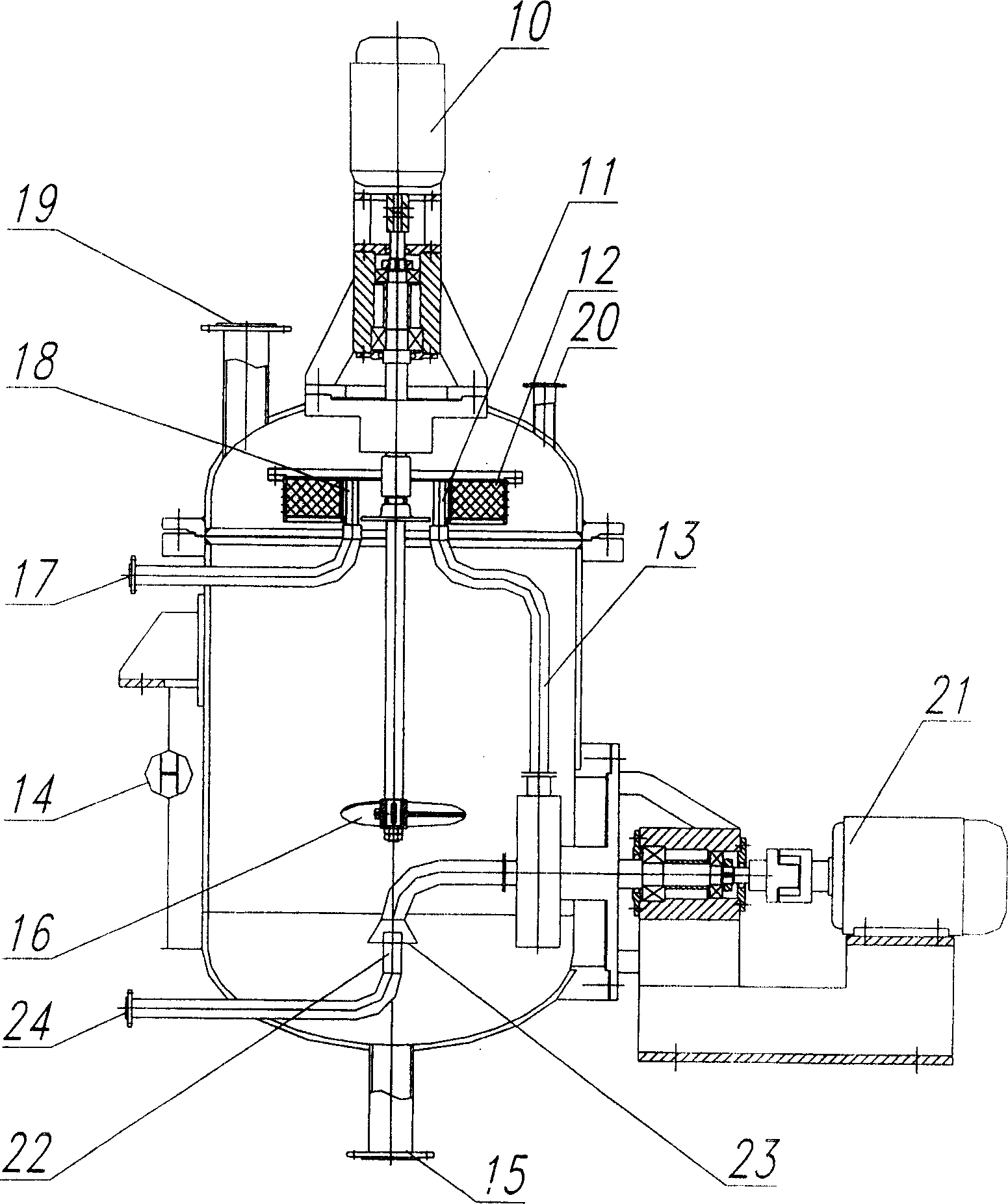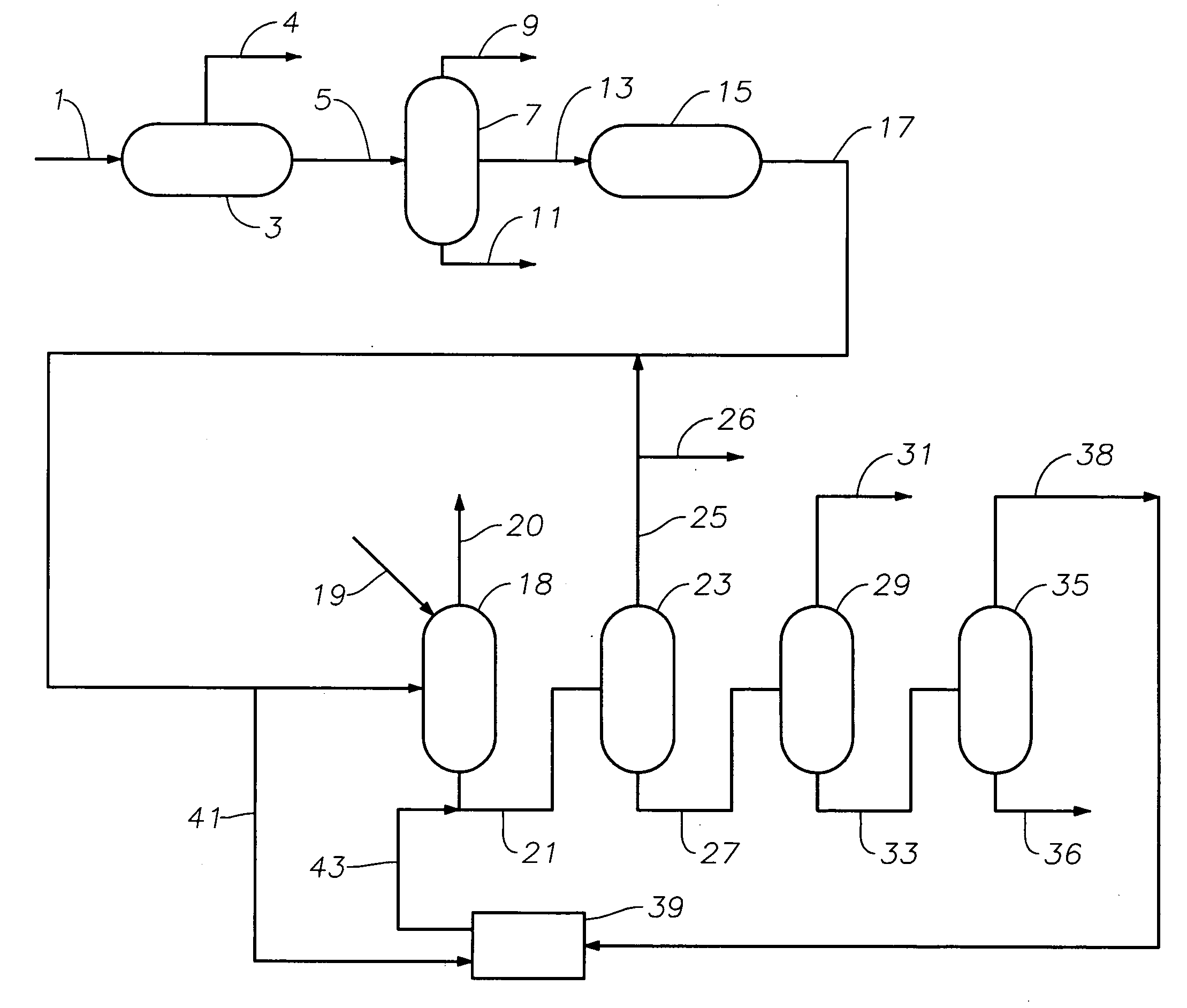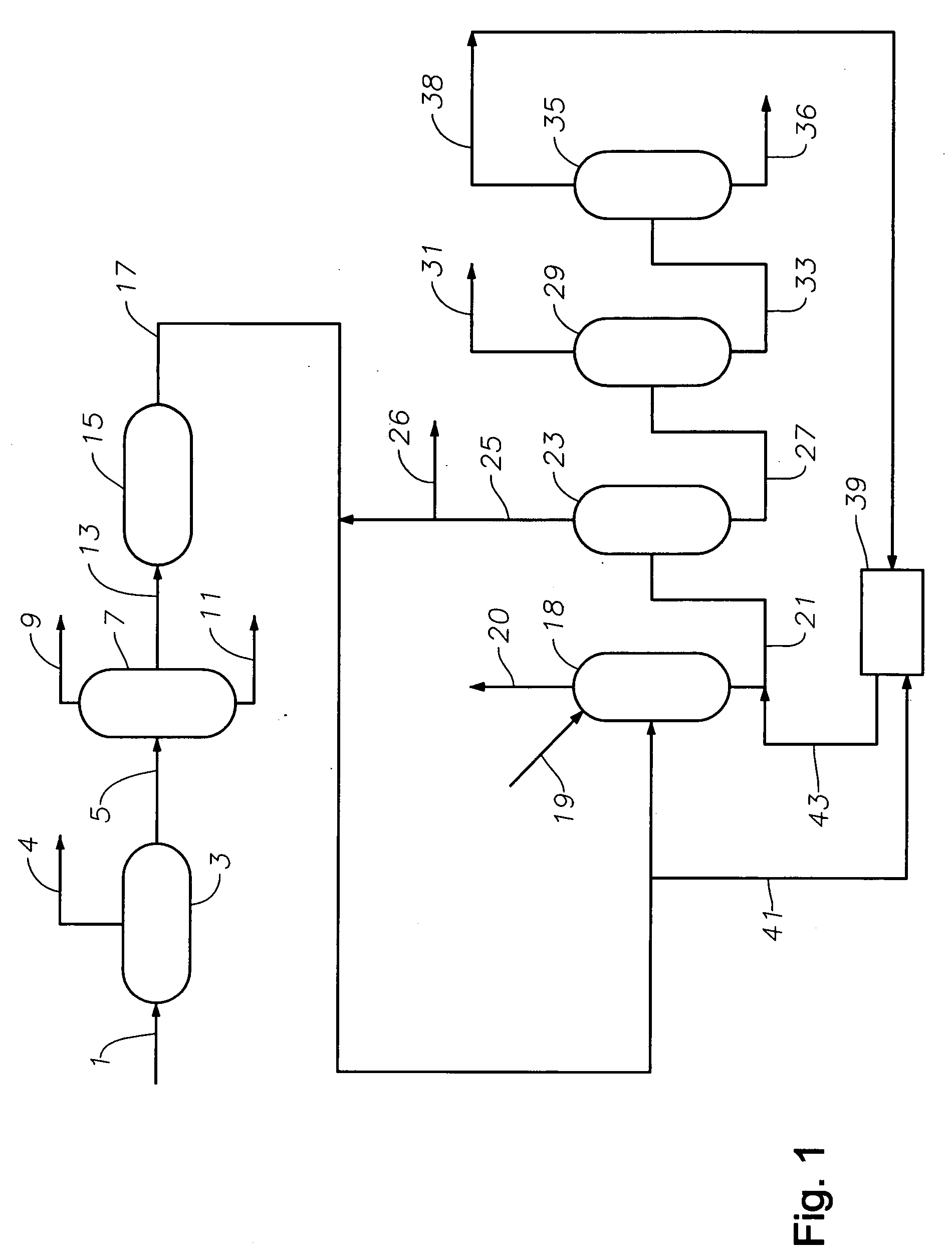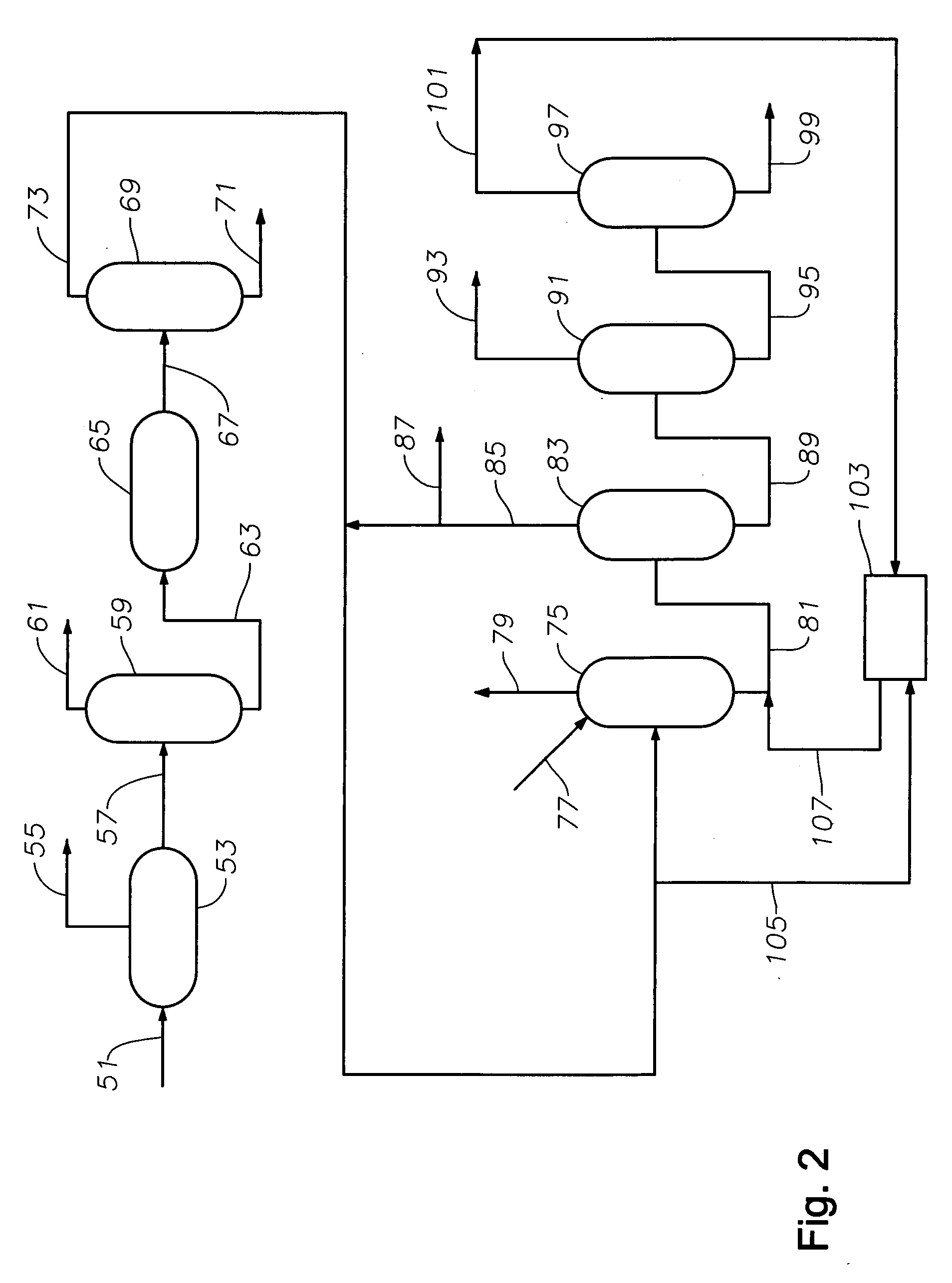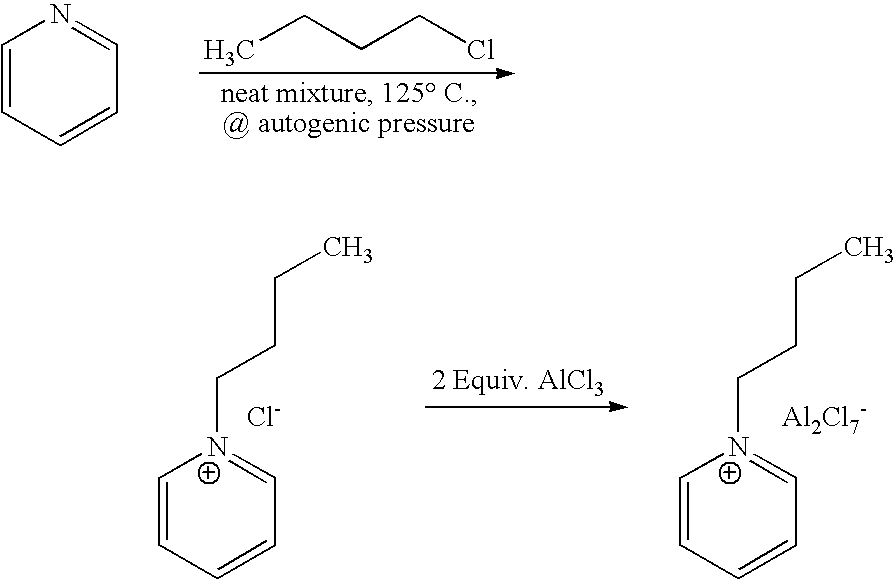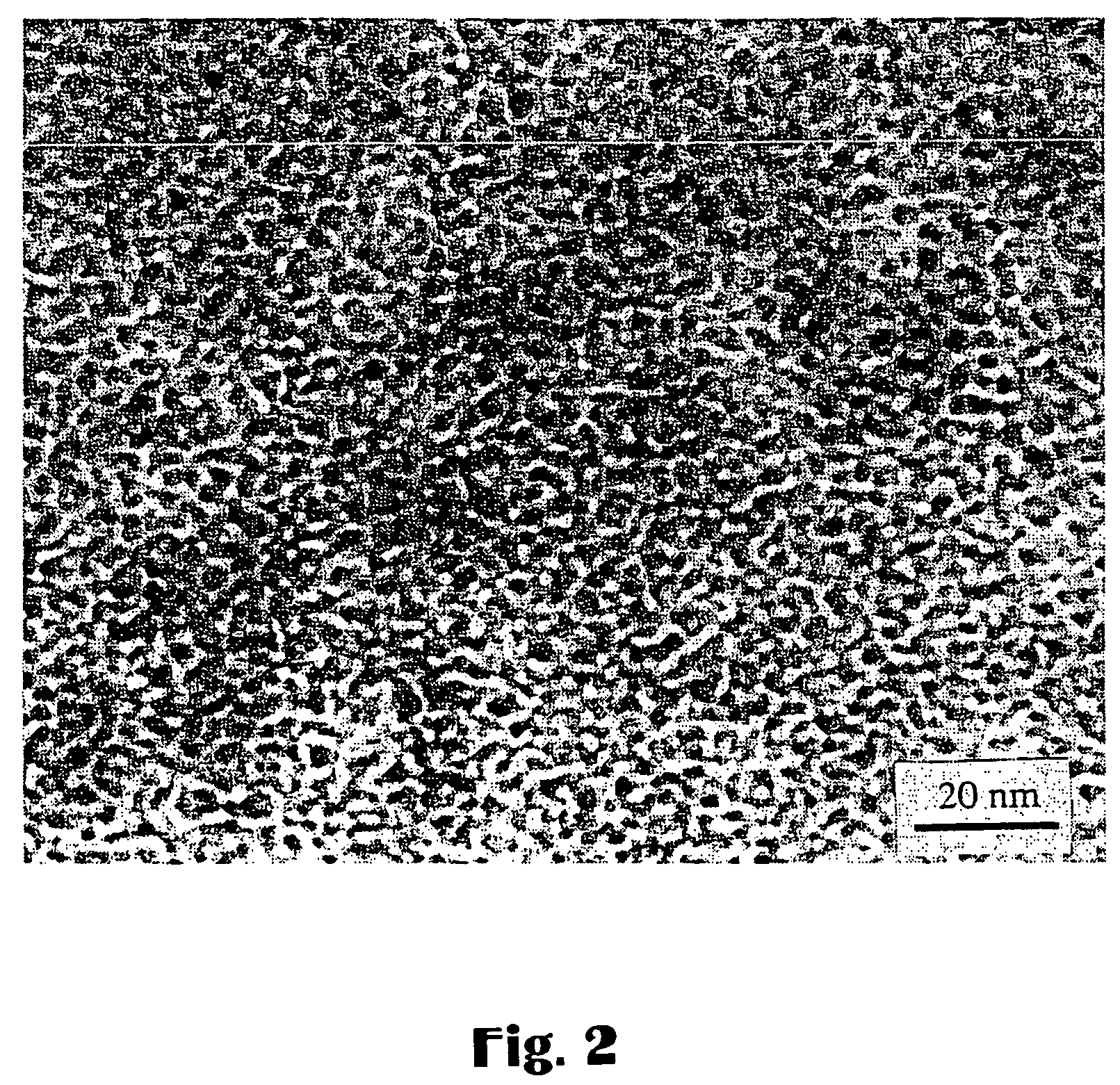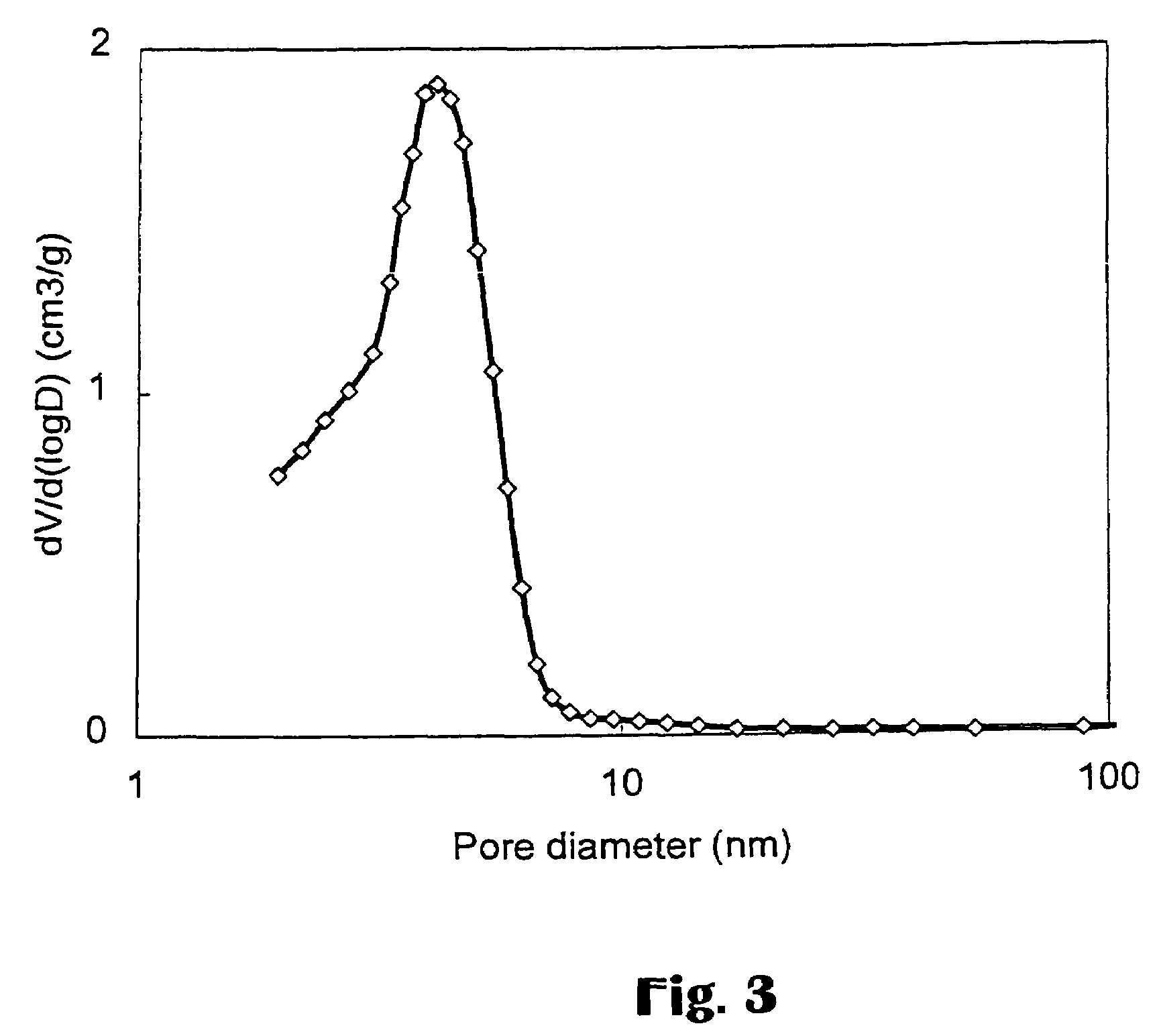Patents
Literature
Hiro is an intelligent assistant for R&D personnel, combined with Patent DNA, to facilitate innovative research.
606results about "Hydrocarbon from saturated and unsaturated hydrocarbon addition" patented technology
Efficacy Topic
Property
Owner
Technical Advancement
Application Domain
Technology Topic
Technology Field Word
Patent Country/Region
Patent Type
Patent Status
Application Year
Inventor
Method for manufacturing alkylate oil with composite ionic liquid used as catalyst
ActiveUS20040133056A1Increase contentRaise the ratioOrganic chemistry methodsLiquid hydrocarbon mixtures productionAlkaneIonic liquid
The present invention pertains to a method for manufacturing alkylate oil using a composite ionic liquid as catalyst. A mixture of isobutane and C4 olefins is used as the raw material, and a composite ionic liquid is used as catalyst to carry out an alkylation reaction. The alkane / olefin ratio in the raw material is higher than 1:1. In the composition of the aforementioned composite ionic liquid catalyst, the cations come from a hydrohalide of an alkyl-containing amine or pyridine, while the anions are composite coordinate anions coming from two or more metal compounds. One of the metal compounds is an aluminum compound, while other metal compounds are compounds of Group IB and Group IIB elements of the Periodic Table and the transition metals. The present invention also provides a design of static mixer reaction apparatus that can realize the aforementioned manufacturing method. The method of the present invention increases the selectivity of the alkylation reaction to give the alkylation product a relatively high octane number and further increase the product yield. Also, the manufacturing operation is simplified, and the cost can be reduced. This method is an environmentally friendly method that will not pollute the environment.
Owner:CHINA UNIV OF PETROLEUM (BEIJING)
Synthesis of liquid fuels from biomass
ActiveUS20100076233A1Hydrocarbon by metathesis reactionLiquid hydrocarbon mixture productionFuranAlkane
Processes and reactor systems are provided for the conversion of oxygenated hydrocarbons to paraffins useful as liquid fuels. The process involves the conversion of water soluble oxygenated hydrocarbons to oxygenates, such as alcohols, furans, ketones, aldehydes, carboxylic acids, diols, triols, and / or other polyols, followed by the subsequent conversion of the oxygenates to paraffins by dehydration and alkylation. The oxygenated hydrocarbons may originate from any source, but are preferably derived from biomass.
Owner:VIRENT
Method for manufacturing alkylate oil with composite ionic liquid used as catalyst
ActiveUS7285698B2High selectivityImprove production yieldOrganic chemistry methodsLiquid hydrocarbon mixtures productionAlkaneIonic liquid
The present invention pertains to a method for manufacturing alkylate oil using a composite ionic liquid as catalyst. A mixture of isobutane and C4 olefins is used as the raw material, and a composite ionic liquid is used as catalyst to carry out an alkylation reaction. The alkane / olefin ratio in the raw material is higher than 1:1. In the composition of the aforementioned composite ionic liquid catalyst, the cations come from a hydrohalide of an alkyl-containing amine or pyridine, while the anions are composite coordinate anions coming from two or more metal compounds. One of the metal compounds is an aluminum compound, while other metal compounds are compounds of Group IB and Group IIB elements of the Periodic Table and the transition metals. The present invention also provides a design of static mixer reaction apparatus that can realize the aforementioned manufacturing method. The method of the present invention increases the selectivity of the alkylation reaction to give the alkylation product a relatively high octane number and further increase the product yield. Also, the manufacturing operation is simplified, and the cost can be reduced. This method is an environmentally friendly method that will not pollute the environment.
Owner:CHINA UNIV OF PETROLEUM (BEIJING)
Integrated alkylation process using ionic liquid catalysts
ActiveUS7432408B2Easy to operateReduce gas productionLiquid hydrocarbon mixtures productionRefining with metal saltsAlkyl transferGasoline
An integrated refining process for the production of high quality gasoline blending components from low value components is disclosed. In addition there is disclosed a method of improving the operating efficiency of a refinery by reducing fuel gas production and simultaneously producing high quality gasoline blending components of low volatility. The processes involve the alkylation of a refinery stream containing pentane with ethylene using an ionic liquid catalyst.
Owner:CHEVROU USA INC
Alkylation process using an alkyl halide promoted ionic liquid catalyst
A process for the production of a high quality gasoline blending components from refinery process streams by the alkylation of light isoparaffins with olefins using an ionic liquid catalyst is disclosed. The alkylation process comprises contacting a hydrocarbon mixture comprising at least one olefin having from 2 to 6 carbon atoms and at least one isoparaffin having from 3 to 6 carbon atoms under alkylation conditions, said catalyst comprising a mixture of at least one acidic ionic liquid and at least one alkyl halide. In one embodiment, the acidic ionic liquid is chloroaluminate ionic liquid prepared by mixing aluminum trichloride (AlCl3) and a hydrocarbyl substituted pyridinium halide, a hydrocarbyl substituted imidazolium halide, trialkylammonium hydrohalide or tetraalkylammonium halide of the general formulas A, B, C and D, respectively,where R=H, methyl, ethyl, propyl, butyl, pentyl or hexyl group and X is a halide and preferably a chloride, and R1 and R2=H, methyl, ethyl, propyl, butyl, pentyl or hexyl group and where R1 and R2 may or may not be the same, and R3, R4, and R5 and R6=methyl, ethyl, propyl, butyl, pentyl or hexyl group and where R3, R4, R5 and R6 may or may not be the same.
Owner:CHEVROU USA INC
Alkylation process using chloroaluminate ionic liquid catalysts
A process for the production of a high quality gasoline blending components from refinery process streams by the alkylation of light isoparaffins with olefins using an ionic liquid catalyst is disclosed. The process includes reacting a refinery stream containing isopentane and / or isobutane with a refinery stream containing ethylene and / or propylene and butylenes under alkylation conditions in the presence of a chloroaluminate ionic liquid catalyst comprising a hydrocarbyl substituted pyridinium chloroaluminate or a hydrocarbyl substituted imidazolium chloroaluminate of the general formulas A and B, respectively.Where R═H, methlyl, ethyl, propyl, butyl, pentyl or hexyl group and X is a chloroaluminate, and R1 and R2=H, methyl, ethyl, propyl, butyl, pentyl or hexyl group and where R1 and R2 may or may not be the same.
Owner:CHEVROU USA INC
Regeneration of acidic catalysts
ActiveUS20070142213A1High activityChlorine/hydrogen-chloride purificationSulfur compoundsAlkyl transferIonic liquid
A process for regenerating a used acidic catalyst which has been deactivated by conjunct polymers by removing the conjunct polymers so as to increase the activity of the catalyst is disclosed. Methods for removing the conjunct polymers include hydrogenation, addition of a basic reagent and alkylation. The methods are applicable to all acidic catalysts and are described with reference to certain ionic liquid catalysts.
Owner:CHEVROU USA INC
Alkylation process using chloroaluminate ionic liquid catalysts
ActiveUS20060135839A1Quality improvementLiquid hydrocarbon mixtures productionHydrocarbons2-methylbutanePyridinium
A process for the production of a high quality gasoline blending components from refinery process streams by the alkylation of light isoparaffins with olefins using an ionic liquid catalyst is disclosed. The process includes reacting a refinery stream containing isopentane and / or isobutane with a refinery stream containing ethylene and / or propylene and butylenes under alkylation conditions in the presence of a chloroaluminate ionic liquid catalyst comprising a hydrocarbyl substituted pyridinium halide or a hydrocarbyl substituted imidazolium halide of the general formulas A and B, respectively. Where R=H, methyl, ethyl, propyl, butyl, pentyl or hexyl group and X is a halide and preferably a chloride, and R1 and R2=H, methyl, ethyl, propyl, butyl, pentyl or hexyl group and where R1 and R2 may or may not be the same.
Owner:CHEVROU USA INC
Integrated alkylation process using ionic liquid catalysts
ActiveUS20060131209A1Easy to operateReducing fuel gas productionLiquid hydrocarbon mixtures productionRefining with metal saltsAlkyl transferGasoline
An integrated refining process for the production of high quality gasoline blending components from low value components is disclosed. In addition there is disclosed a method of improving the operating efficiency of a refinery by reducing fuel gas production and simultaneously producing high quality gasoline blending components of low volatility. The processes involve the alkylation of a refinery stream containing pentane with ethylene using an ionic liquid catalyst.
Owner:CHEVROU USA INC
Solid-acid isomerization catalyst and process
ActiveUS7041866B1Improve performanceImprove stabilityHydrocarbon by isomerisationCatalytic crackingAlkaneSulfation
A catalyst and process is disclosed to selectively upgrade a paraffinic feedstock to obtain an isoparaffin-rich product for blending into gasoline. The catalyst comprises a support of a sulfated oxide or hydroxide of a Group IVB (IUPAC 4) metal, a first component comprising at least one Group III A (IUPAC 13) component, and at least one platinum-group metal component which is preferably platinum.
Owner:UOP LLC
Alkylation process using an alkyl halide promoted ionic liquid catalyst
ActiveUS7531707B2Organic-compounds/hydrides/coordination-complexes catalystsHydrocarbonsHydrogen halideAlkane
A process for the production of a high quality gasoline blending components from refinery process streams by the alkylation of light isoparaffins with olefins using an ionic liquid catalyst is disclosed. The alkylation process comprises contacting a hydrocarbon mixture comprising at least one olefin having from 2 to 6 carbon atoms and at least one isoparaffin having from 3 to 6 carbon atoms under alkylation conditions, said catalyst comprising a mixture of at least one acidic ionic liquid and at least one alkyl halide. The alkylhalide by reacting to at least a portion of the olefin with a hydrogen halide.
Owner:CHEVROU USA INC
Lithium aluminate layered catalyst and a selective oxidation process using the catalyst
InactiveUS6858769B2Thermal non-catalytic crackingHydrocarbon by isomerisationHydrogenDehydrogenation
A catalyst for the selective oxidation of hydrogen has been developed. It comprises an inert core such as cordierite and an outer layer comprising a lithium aluminate support. The support has dispersed thereon a platinum group metal and a promoter metal, e.g. platinum and tin respectively. This catalyst is particularly effective in the selective oxidation of hydrogen in a dehydrogenation process.
Owner:UOP LLC
Manufacture of high octane alkylate
InactiveUS6768035B2Hydrocarbon by isomerisationRefining to change hydrocarbon structural skeletonAlcoholGasoline
A Fischer-Tropsch C3-C4 olefin stream is simultaneously dehydrated and isomerized to convert alcohols to olefins and 1-butenes to 2-butenes and thereby lower the oxygenate content. Another Fischer-Tropsch fraction is hydrotreated and hydrocracked to provide an isobutane stream. The treated C3-C4 olefin stream having an oxygenate content less than 4000 ppm, is reacted with the isobutane stream to provide a highly branched, high octane isoparaffinic alkylate. The alkylate is useful as a blending component in motor gasoline.
Owner:CHEVROU USA INC
Method of using carbide and/or oxycarbide containing compositions
InactiveUS20020121460A1Facilitated DiffusionHigh porosityMaterial nanotechnologyHydrocarbon by isomerisationFluid phaseChemical reaction
Compositions including carbide-containing nanorods and / or oxycarbide-containing nanorods and / or carbon nanotubes bearing carbides and oxycarbides and methods of making the same are provided. Rigid porous structures including oxycarbide-containing nanorods and / or carbide containing nanorods and / or carbon nanotubes bearing carbides and oxycarbides and methods of making the same are also provided. The compositions and rigid porous structures of the invention can be used either as catalyst and / or catalyst supports in fluid phase catalytic chemical reactions. Processes for making supported catalyst for selected fluid phase catalytic reactions are also provided.
Owner:HYPERION CATALYSIS INT
Isomerization catalyst and processes
InactiveUS6977322B2Improve performanceImprove stabilityHydrocarbon by isomerisationCatalytic crackingAlkaneIsomerization
A catalyst and process is disclosed to selectively upgrade a paraffinic feedstock to obtain an isoparaffin-rich product for blending into gasoline. The catalyst comprises a support of a tungstated oxide or hydroxide of a Group IVB (IUPAC 4) metal, a first component of at least one lanthanide element, yttrium or mixtures thereof, which is preferably ytterbium or holmium, and at least one platinum-group metal component which is preferably platinum.
Owner:UOP LLC
Preparation of catalyst and use for high yield conversion of methane to ethylene
InactiveUS7250543B2Maintain activityAlkaline earth titanatesHydrocarbon by hydrocarbon condensationAlkaline earth metalSlurry
A perovskite catalyst is prepared using a ceramic sol-sol methodology comprising preparing slurry in water of an alkaline earth metal salt, a powdered metal salt and a powdered transition metal oxide, adding a polymeric binder to form a paste, drying and comminuting the paste into a powder and heating the powder with a temperature profile to calcination temperatures. In one embodiment the slurry is formed of titanium oxide with barium carbonate and tin chloride in deionized water, and more specifically by a mixture according to Ba (1-0.05x)+TiO2+SnCl2(0.05x) where x is in moles. The perovskite catalyst is preferably used in a process for oxidative coupling of methane. Catalyst performance is enhanced through the addition of halides to the feed gas in the reaction.
Owner:HRD CORP
Continuous process for the alkylation of hydrocarbons
A continuous alkylation process performed in an apparatus comprising a series of at least two zone A reactors and a series of at least two zone B reactors, in which the zone A reactors and the zone B reactors cycle between alkylation mode and mild regeneration mode, and wherein the alkylation mode comprises introducing an alkylation agent into a first reactor of the zone through which the alkylatable compound passes, reacting a portion of the alkylatable compound with a portion of the alkylation agent to produce a product stream, and performing this operation at least once more in a downstream reactor in the same zone employing, instead of alkylatable compound, a stream comprising the product stream.
Owner:ALBEMARLE NETHERLANDS BV
Alkylation of olefins with isoparaffins in ionic liquid to make lubricant or fuel blendstock
ActiveUS20070142690A1Increase the degree of branchingHigh molecular weightOrganic chemistry methodsCatalystsAlkyl transferAlkane
A process and method for making a superior lubricant or distillate fuel component by the alkylation of C5+ olefins with isoparaffins to produce a “capped” (alkylated) olefin using an acidic chloroaluminate ionic liquid catalyst system. Preferably the catalyst system includes a Brönsted acid.
Owner:CHEVROU USA INC
Alkylation of olefins with isoparaffins in ionic liquid to make lubricant or fuel blendstock
ActiveUS7569740B2Degree of improvementWeight increaseOrganic chemistry methodsCatalystsAlkaneAlkyl transfer
A process and method for making a superior lubricant or distillate fuel component by the alkylation of C5+ olefins with isoparaffins to produce a “capped” (alkylated) olefin using an acidic chloroaluminate ionic liquid catalyst system. Preferably the catalyst system includes a Brönsted acid.
Owner:CHEVROU USA INC
Mesoporous material with active metals
A process for treating organic compounds includes providing a composition which includes a substantially mesoporous structure of silica containing at least 97% by volume of pores having a pore size ranging from about 15 Å to about 30 Å and having a micropore volume of at least about 0.01 cc / g, wherein the mesoporous structure has incorporated therewith at least about 0.02% by weight of at least one catalytically and / or chemically active heteroatom selected from the group consisting of Al, Ti, V, Cr, Zn, Fe, Sn, Mo, Ga, Ni, Co, In, Zr, Mn, Cu, Mg, Pd, Pt and W, and the catalyst has an X-ray diffraction pattern with one peak at 0.3° to about 3.5° at 2θ. The catalyst is contacted with an organic feed under reaction conditions wherein the treating process is selected from alkylation, acylation, oligomerization, selective oxidation, hydrotreating, isomerization, demetalation, catalytic dewaxing, hydroxylation, hydrogenation, ammoximation, isomerization, dehydrogenation, cracking and adsorption.
Owner:ABB LUMMUS GLOBAL INC
Hydrocarbon conversion processes using non-zeolitic molecular sieve catalysts
Hydrocarbon or oxygenate conversion process in which a feedstock is contacted with a non zeolitic molecular sieve which has been treated to remove most, if not all, of the halogen contained in the catalyst. The halogen may be removed by one of several methods. One method includes heating the catalyst in a low moisture environment, followed by contacting the heated catalyst with air and / or steam. Another method includes steam-treating the catalyst at a temperature from 400° C. to 1000° C. The hydrocarbon or oxygenate conversion processes include the conversion of oxygenates to olefins, the conversion of oxygenates and ammonia to alkylamines, the conversion of oxygenates and aromatic compounds to alkylated aromatic compounds, cracking and dewaxing.
Owner:EXXONMOBIL CHEM PAT INC
Preparation of high octane alkylate from Fischer-Tropsch olefins
InactiveUS6743962B2Refining to change hydrocarbon structural skeletonOrganic chemistry methodsAlkyl transferGasoline
A Fischer-Tropsch C3-C4 olefin stream is treated to lower the oxygenate content to below 4000 ppm. Another Fischer-Tropsch fraction is hydrotreated and hydrocracked to provide an isobutane-containing stream. The treated C3-C4 olefin stream is reacted with the isobutane stream in an alkylation reactor to provide a highly branched, high octane isoparaffinic alkylate. The alkylate is useful as a blending component in motor gasoline.
Owner:CHEVROU USA INC
Olefin Oligomerization
A process for producing a hydrocarbon composition that comprises contacting a feed stream, that comprises at least one C3 to C8 olefin, and an olefinic recycle stream, that comprises a first olefinic recycle stream and no more than 10 wt % of C10+ non-normal olefins, with a molecular sieve catalyst in a reaction zone under olefin oligomerization conditions producing an oligomerization effluent stream; separating the oligomerization effluent stream to produce a first olefinic stream, that has a weight ratio of C4− / (C5-C8) molecules from about 0.8 to about 1.2 times the weight ratio of C4− / (C5-C8) molecules found in the oligomerization effluent stream, and a first hydrocarbon product stream, that comprises at least 1 wt % and no more than 30 wt % of C9 non-normal olefin; and splitting the first olefinic stream to produce the first olefinic recycle stream and a first purge stream.
Owner:EXXONMOBIL CHEM PAT INC
Process for dimerization of ethylene to but-1-ene using a composition comprising a titanium-based complex and an alkoxy ligand functionalized by a heteroatom
InactiveUS8624042B2Hydrocarbon by hydrogenationGroup 5/15 element organic compoundsAlkoxy groupHeteroatom
The invention describes a process for the selective dimerization of ethylene to but-1-ene using a catalytic composition comprising at least one organometallic titanium complex, said organometallic complex containing at least one alkoxy type ligand functionalized by a heteroatom selected from nitrogen, oxygen, phosphorus, sulphur, arsenic and antimony or by an aromatic group.
Owner:INST FR DU PETROLE
Regeneration of acidic catalysts
ActiveUS7732363B2High activityChlorine/hydrogen-chloride purificationHydrocarbon purification/separationAlkyl transferIonic liquid
A process for regenerating a used acidic catalyst which has been deactivated by conjunct polymers by removing the conjunct polymers so as to increase the activity of the catalyst is disclosed. Methods for removing the conjunct polymers include hydrogenation, addition of a basic reagent and alkylation. The methods are applicable to all acidic catalysts and are described with reference to certain ionic liquid catalysts.
Owner:CHEVROU USA INC
Metal supported MCM-22 molecular sieve hollow sphere bifunctional catalyst preparation method and application thereof
ActiveCN101618336AHigh reactivityHigh selectivityMolecular sieve catalystsCatalyst activation/preparationMolecular sieveActive component
The invention relates to a metal supported MCM-22 molecular sieve hollow sphere bifunctional catalyst preparation method and an application thereof, belonging to the molecular sieve catalysis technology. The method is characterized in that carbon black sphere particles are used as template, molecular sieve hollow spheres with multi-stage pore path structure is prepared by rotation hydrothermal crystallization and by using metal active components the prepared molecular sieve hollow spheres are loaded and modified. The prepared Mo / HMCM-22 molecular sieve hollow sphere bifunctional catalyst can be used in methane non-oxidative aromatization reaction system. The effect and the benefit of the invention is that the preparation method of the molecular sieve hollow spheres has simple operation and low cost, and the prepared hollow sphere catalyst has excellent catalytic performance in the methane non-oxidative aromatization reaction, high methane conversion rate and aromatics yield and very long catalyst life.
Owner:DALIAN UNIV OF TECH
Alkylation reaction technique catalyzed by ion liquid and reactor apparatus
InactiveCN1907924AEasy to separateRestore catalytic activityHydrocarbon from saturated and unsaturated hydrocarbon additionHydrocarbon oils refiningIonAlkane
This invention involves an ion liquid catalytic alkylation process and a responsing reactor. The process comprises carrying out a reaction of isobutene, C3-C5 olefins and ionic liquid catalyst in a rotating bed reactor with reaction temperature of 8~40DEG C, pressure of 0.3~1.0 MPa and rotor speed of 100~2500 rpm, wherein the volume ratio of ion liquid feed to alkanes-olefins is 0.1~1.5:1 and the molar ratio of alkanes to olefins is 10~300, and controlling the reaction time less than 1~10min. The invention improved alkylation reaction selectivity, and the octane value of alkylation product can reach to 94-100. The operation is simple and low-cost, and has no pollution to environment and beneficial to environment protection.
Owner:BEIJING UNIV OF CHEM TECH
Production of high purity ethylbenzene from non-extracted feed and non-extracted reformate useful therein
ActiveUS20080194896A1Reduce the presence of impuritiesHigh purityHydrocarbonsHydrocarbon from saturated and unsaturated hydrocarbon additionMolecular sieveAromatic hydrocarbon
A process for producing an ethylbenzene product having a purity of at least 99.50 percent based on the weight of ethylbenzene present in the product by the ethylation of the benzene present in non-extracted feed, e.g., non-extracted hydrocarbon composition. The non-extracted feed is substantially free of both C4− hydrocarbons and the C7+ aromatic hydrocarbons and contains benzene and benzene coboilers. The process is carried out in the liquid phase, in the presence of an acid-active catalyst containing MCM-22 family molecular sieve, and under specified conditions.
Owner:EXXONMOBIL CHEM PAT INC
Alkylation of oligomers to make superior lubricant or fuel blendstock
ActiveUS7572943B2Reduce concentrationQuality improvementLiquid hydrocarbon mixtures productionHydrocarbons from unsaturated hydrocarbon additionAlkyl transferOligomer
A process and method for making a superior lubricant or distillate fuel component by the oligomerization of a mixture comprising olefins to form an oligomer and the alkylation of the oligomer with isoparaffins to produce an alkylated (“capped”) olefin oligomer preferably using an acidic chloroaluminate ionic liquid catalyst system. Preferably the ionic liquid catalyst system comprises a Brönsted acid.
Owner:CHEVROU USA INC
Mesoporous material with active metals
A process for treating organic compounds includes providing a composition which includes a substantially mesoporous structure of refractory oxide containing at least 97% by volume of pores having a pore size ranging from about 15 Å to about 30 Å and having a micropore volume of at least about 0.01 cc / g, wherein the mesoporous structure has incorporated therewith at least about 0.02% by weight of at least one catalytically and / or chemically active heteroatom selected from the group consisting of Al, Ti, V, Cr, Zn, Fe, Sn, Mo, Ga, Ni, Co, In, Zr, Mn, Cu, Mg, Pd, Pt and W, and the catalyst has an X-ray diffraction pattern with one peak at 0.3° to about 3.5° at 2 theta (θ). The catalyst is contacted with an organic feed under reaction conditions wherein the treating process is selected from alkylation, acylation, oligomerization, selective oxidation, hydrotreating, isomerization, demetalation, catalytic dewaxing, hydroxylation, hydrogenation, ammoximation, isomerization, dehydrogenation, cracking and adsorption.
Owner:LUMMUS TECH INC
Popular searches
Chemical/physical/physico-chemical processes Liquid-gas reaction processes Treatment with hydrotreatment processes Hydrogen/synthetic gas production Bulk chemical production Hydrocarbon oils treatment products Refining to eliminate hetero atoms Hydrogen Oxygen compounds preparation by hydrocarbon oxidation Hydrocarbon from oxygen organic compounds
Features
- R&D
- Intellectual Property
- Life Sciences
- Materials
- Tech Scout
Why Patsnap Eureka
- Unparalleled Data Quality
- Higher Quality Content
- 60% Fewer Hallucinations
Social media
Patsnap Eureka Blog
Learn More Browse by: Latest US Patents, China's latest patents, Technical Efficacy Thesaurus, Application Domain, Technology Topic, Popular Technical Reports.
© 2025 PatSnap. All rights reserved.Legal|Privacy policy|Modern Slavery Act Transparency Statement|Sitemap|About US| Contact US: help@patsnap.com
